CAT ALYST
UNIVERSITY OF KENTUCKY COLLEGE OF PUBLIC HEALTH
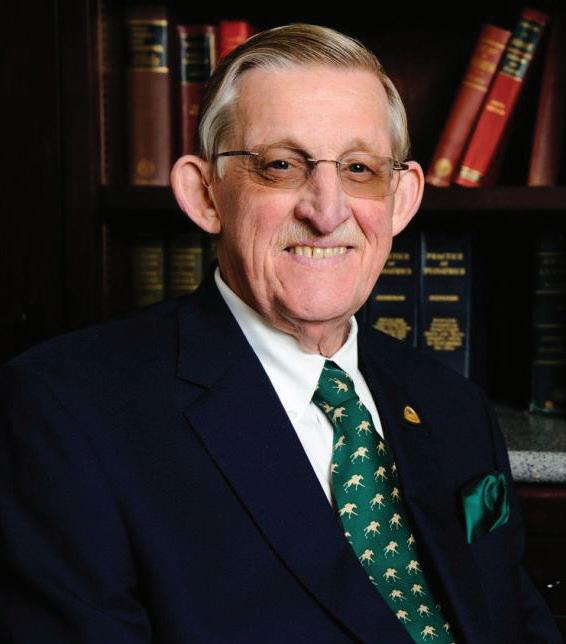






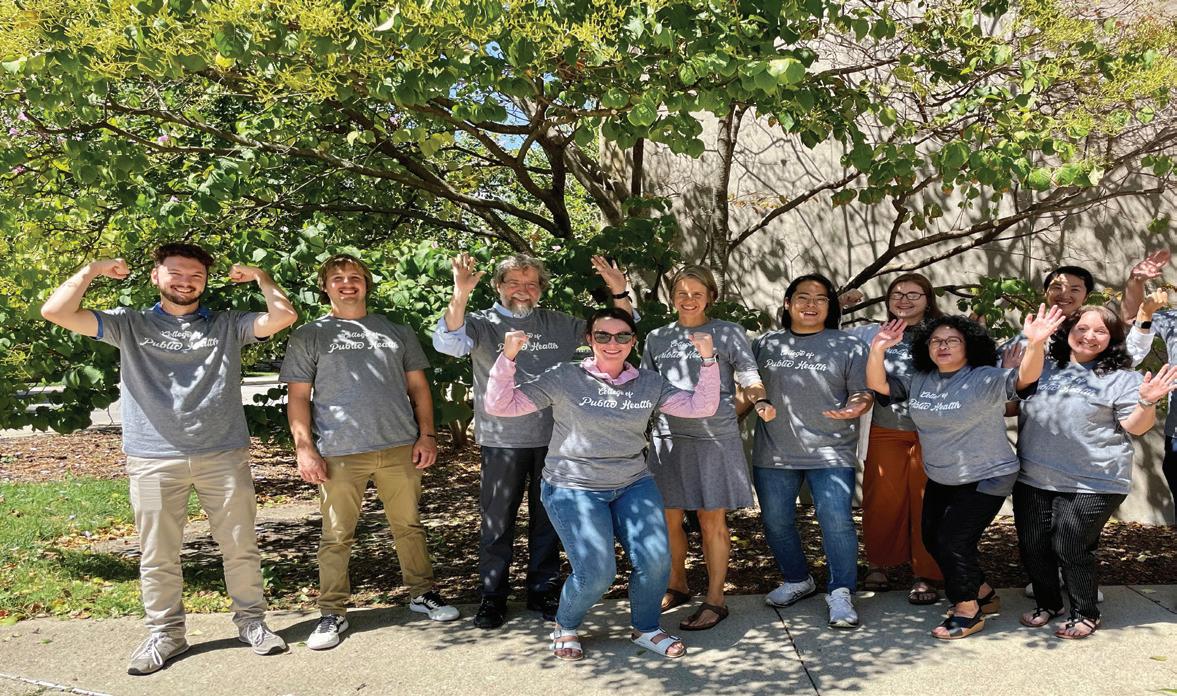
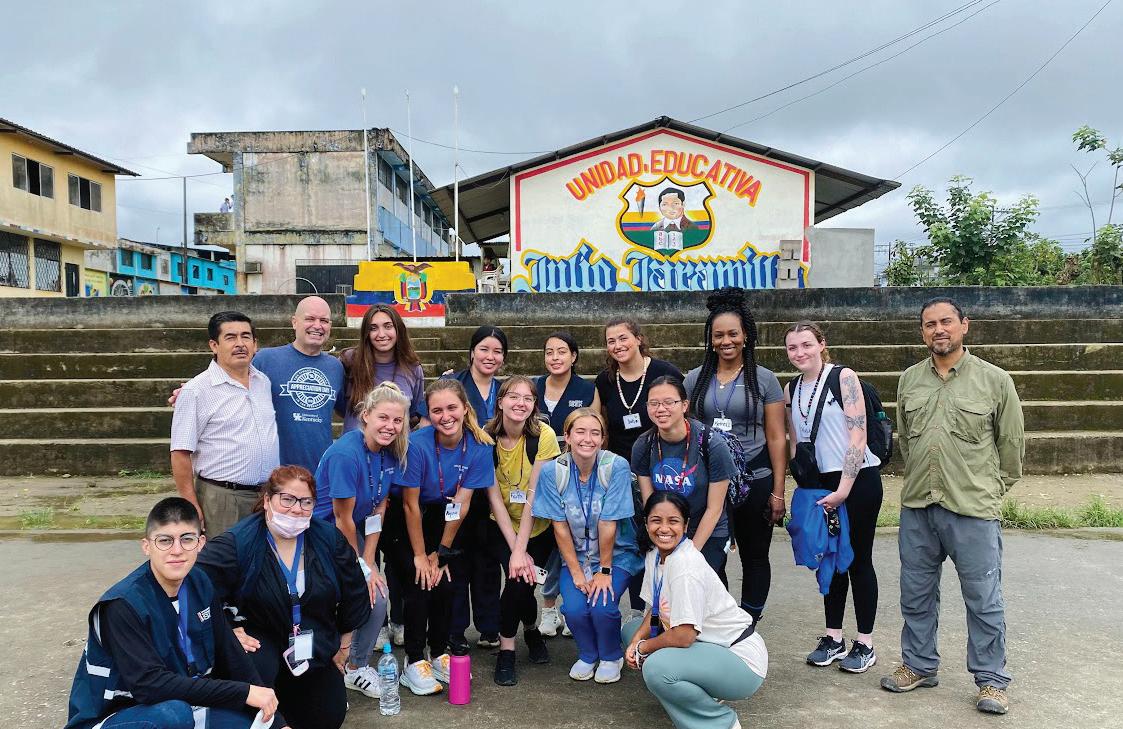


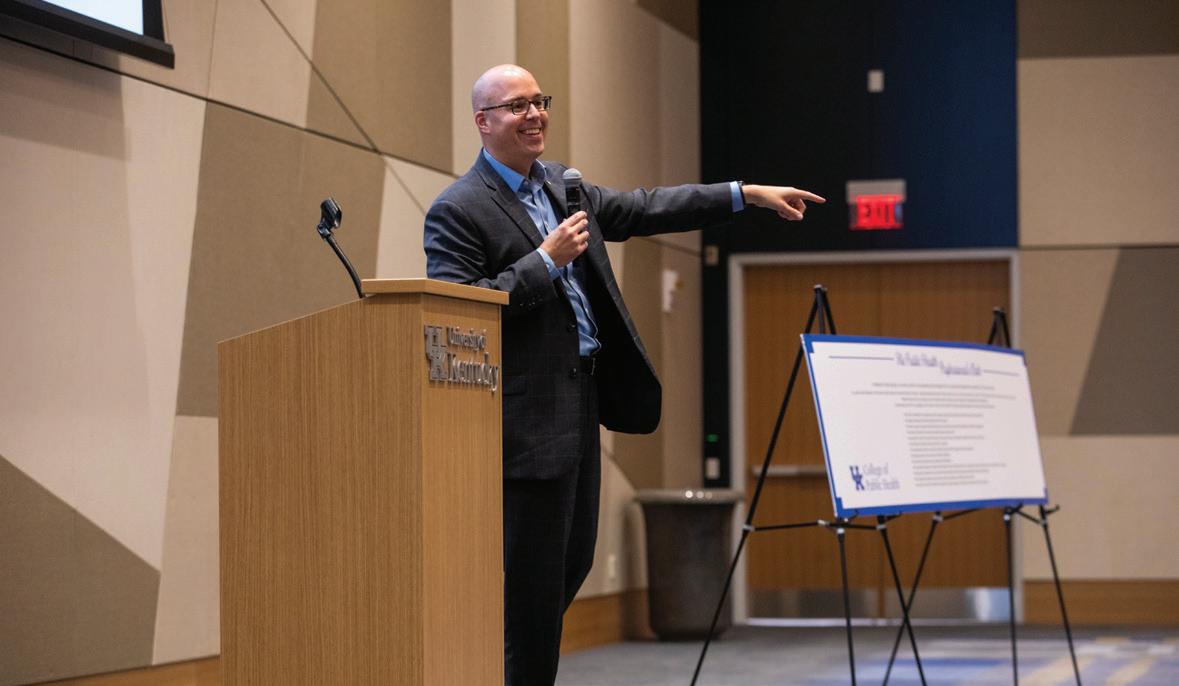

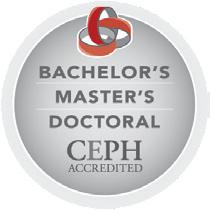

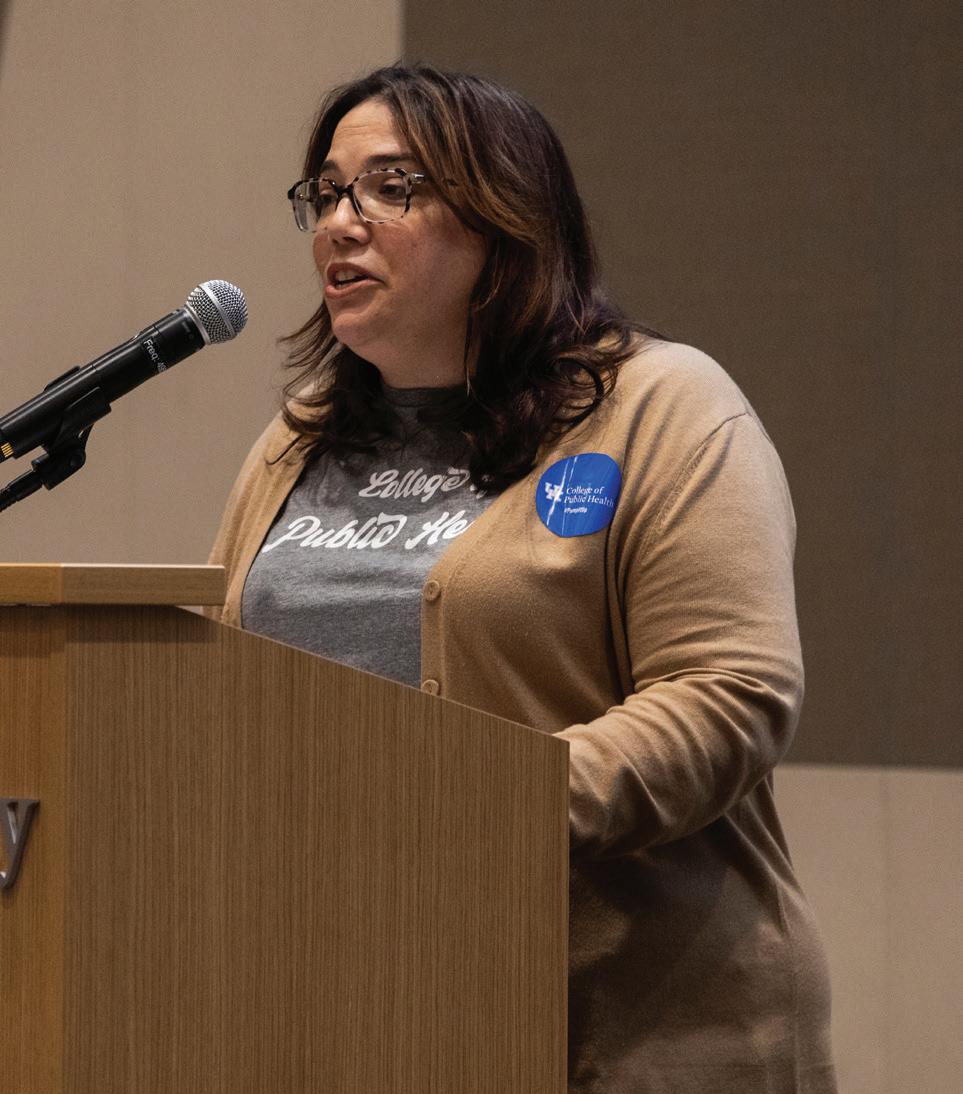
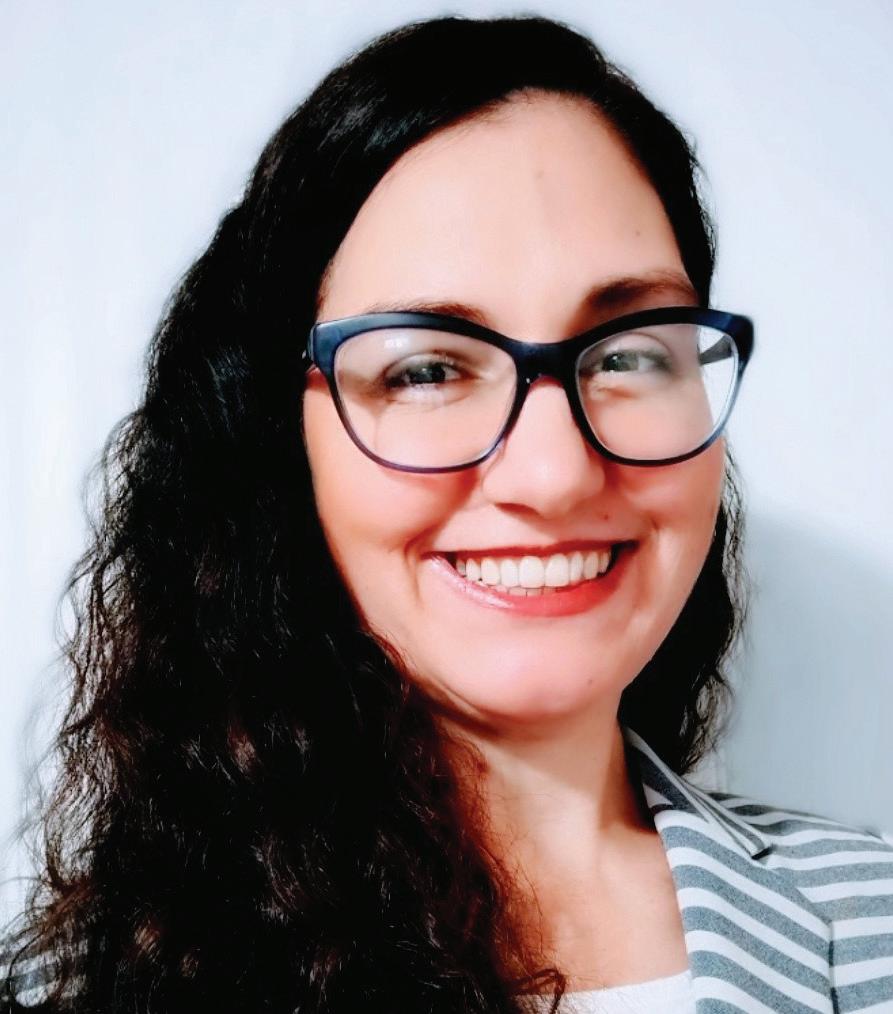
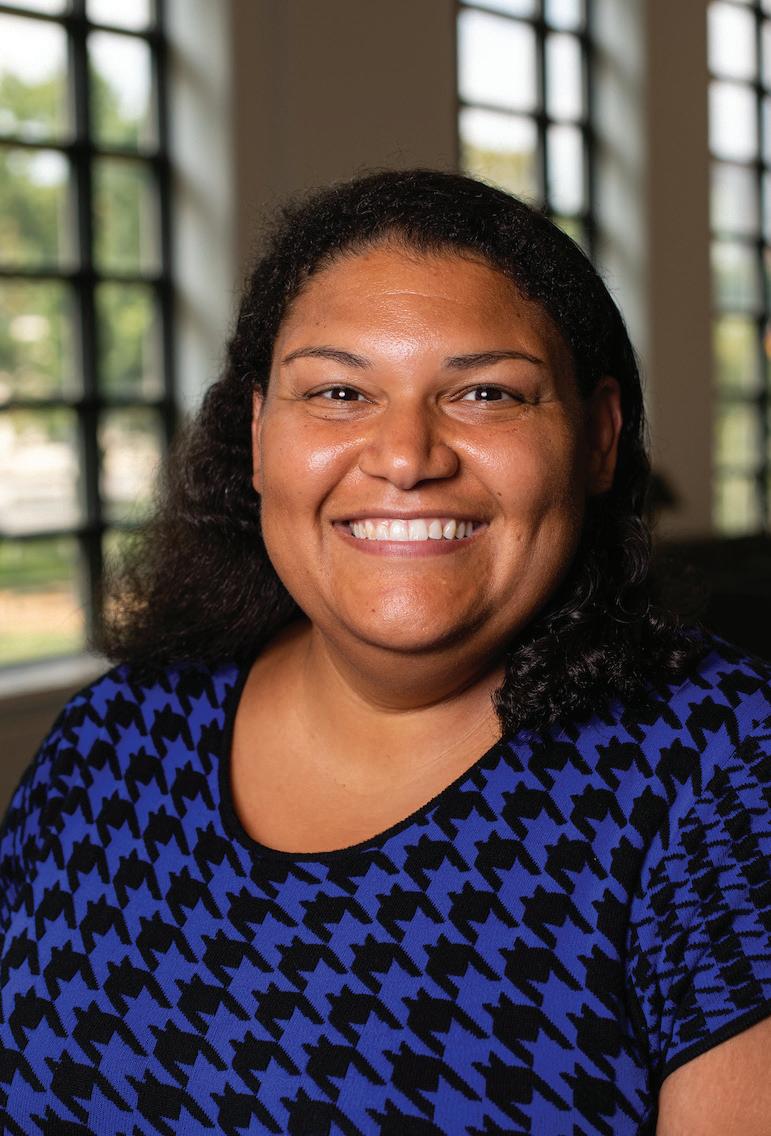
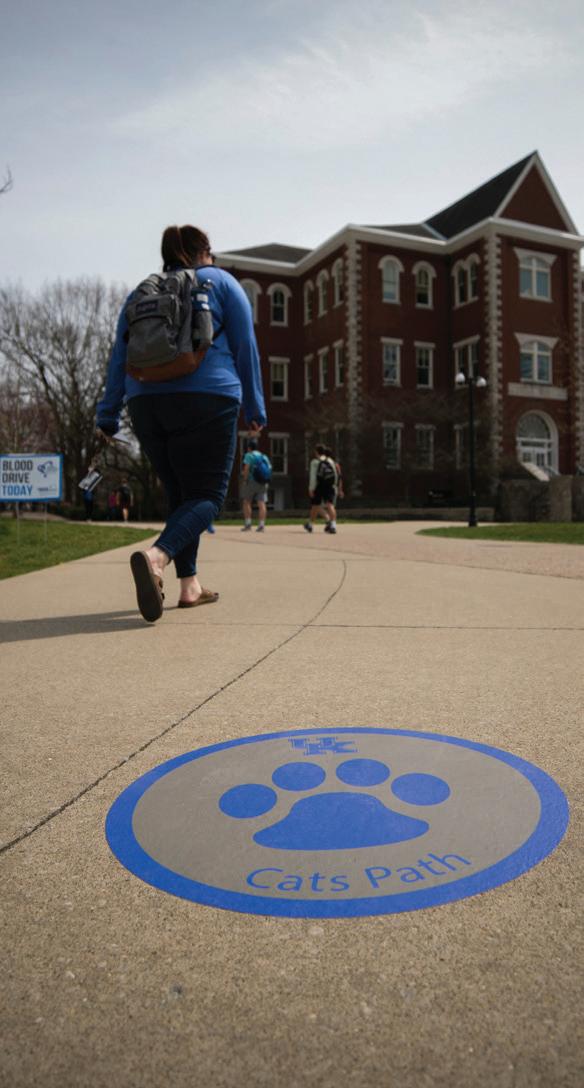
Scutch, after experiencing firsthand the poverty in Appalachia, devoted his professional efforts to the practice of public health and preventive medicine. He completed his post graduate medical education at Northwestern University, the Centers for Disease Control and Prevention, and the University of Kentucky. Scutch was a founder of the College of Community Health Sciences at the University of Alabama and founded the Graduate School of Public Health at San Diego State University.
In 1997, he returned home to Kentucky to create the then School of Public Health in the College of Medicine at the University of Kentucky. He was appointed the Peter P. Bosomworth Professor of Health Services Research and Policy as well as the Director of the Center for Health Services Management and Research. He held faculty appointments in the University of Kentucky’s College of Public Health and the College of Medicine.
Dr. Scutchfield was a diplomat of the American Board of Preventive Medicine and of the American Board of Family Practice. He held fellowships in both the American College of Preventive Medicine and the American Academy of Family Practice.
Dr. Scutchfield’s scholarly activities included authoring or co-authoring more than 200 scientific journal articles, book chapters and technical reports. He was especially proud of co-editing
Principles of Public Health Practice with his long-time friend Dr. William Keck, now in its fourth edition. In 2013, he was honored by his friends who published Contemporary Public Health in his honor. In 2021, he co-edited the second edition with his friend and colleague, Dr. James Holsinger.
Scutch’s last book, Appalachian Health, won the 2022 Henry Clay Public Policy Book Award. He served as co-editor of the American Journal of Preventive Medicine from 1995 to 2014 and launched the Journal of Appalachian Health in 2018. Scutch held many national positions in professional organizations, including serving as president of the American College of Preventive Medicine, and serving for many years as a member of the House of Delegates of the American Medical Association.
In recent years, Scutch served as chair of the accreditation committee of the Public Health Accreditation Board, which accredits local and state health departments, and encouraged the accreditation of Kentucky’s public health departments. He had an international reputation and was a consultant to government and non-governmental organizations in Panama, China, Saudi Arabia, Israel, and Germany, as well as the United States.
Among his many awards, Dr. Scutchfield held the honorary Doctor of Science degree from his alma mater, Eastern Kentucky University, and the honorary Doctor of Humane Letters from the University of Pikeville. He held the

American Medical Association’s William Beaumont Award and Distinguished Service Award and the American Public Health Association’s Sedgwick Memorial Medal for Distinguished Service in Public Health.
Dr. Julia Costich, who succeeded Dr. Scutchfield as the Bosomworth Professor of Health Services Research, told Kentucky Health News “Public health is about doing things for populations, but Scutch’s gift was relating to individuals—students, colleagues, prominent leaders—as individuals. His generous nature was tempered by a deep need for reciprocation. This was part of what drew him to the work of Thomas Merton, who articulated the need for human contact to bridge the spiritual gulf.”
In 2014, Dr. Scutchfield published the Letters of Thomas Merton and Victor and Carolyn Hammer, fulfilling a longtime dream based on his love of Merton’s writings. In 2017, Dr. Scutchfield was awarded the University of Kentucky Libraries Intellectual Achievement Medallion. In accepting the award, he stated that his interest in Thomas Merton and the humanities reflected a part of his philosophy of being a physician:
“I am a firm believer in the importance of humanity to those of us in the health professions. We do not treat a disease; we treat a person, thus we must know the humanness of the individual in front of us, as well as the diagnosis and treatment of their disease.”
An eminent public health practitioner and scholar, Dr. F. Douglas Scutchfield, founder of the University of Kentucky’s College of Public Health, passed away on Monday, May 23, 2022, in Lexington, Kentucky. Known to his friends, colleagues, and in the community as “Scutch,” he was born on April 23, 1942, in Wheelwright, Kentucky, attended Hazard High School and Eastern Kentucky University, and received his medical degree from the University of Kentucky in 1966. As a native of Eastern Kentucky, Scutch, no matter how far and wide he traveled, never strayed from his Kentucky roots. PUBLICMany of Scutch’s students remember him fondly. Former student Dr. Scott Keel stated, “So honored to be one of the many he took time to mentor. I am forever grateful, forever impacted, and forever changed. He made a difference in my life.”
Dr. Angela Carman commented, “I had the honor of working with Scutch as I pursued my DrPH at the University of Kentucky. As fellow native Kentuckians, Scutch and I often shared stories and dreams for our home state. One of the things I will forever remember about Scutch is how important it was to him to introduce his students to his extremely wide network of colleagues and friends.
Scutch took me to a conference in Florida and, as we attempted to cross the room, where a networking event was being held, we would take one step and someone would approach Scutch to say hello, share memories, or request his expertise on a project. With each step came an introduction for me to this wide array of committed, intelligent people. It was an incredible experience. I hope I’m doing my part “paying it forward” as I work with my students today.

Glen Mays, Professor and Health Systems, Management and Policy at the Colorado School of Public Health, said “I began working with Scutch in the mid-1990s while I was still a graduate student at UNC-Chapel Hill, after meeting him at a conference. Our shared goal was to build a robust national program of research that could identify how best to organize, finance, and deliver public health services across the U.S.
In less than a decade Scutch had accomplished this goal, with a CELEBRATION OF LIFE.
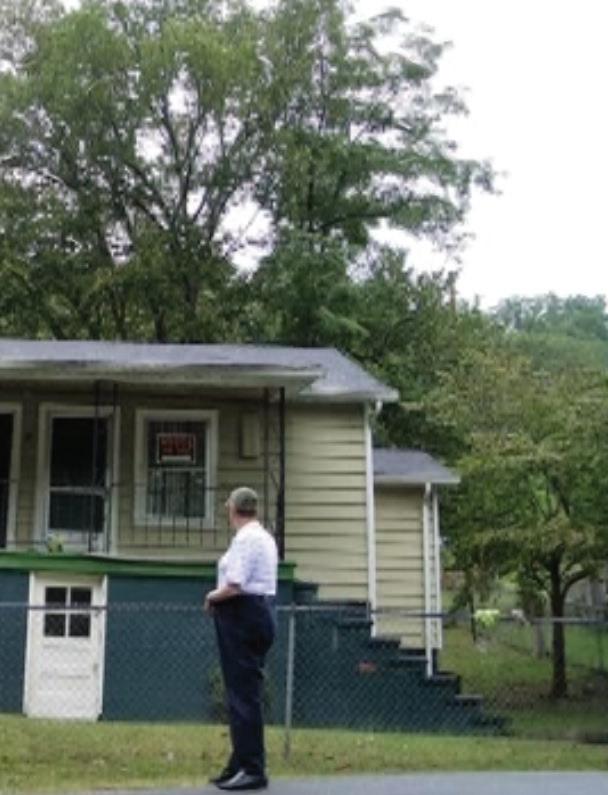
multi-million-dollar research program, dozens of graduate student trainees, and a nationally renowned conference based at the University of Kentucky. One of Scutch’s lasting legacies was his ability to create big new things out of nothing to solve problems that really matter to people.”
Donna Arnett, former Dean of the UK College of Public Health, said “The legacy of Scutch was his commitment to service – to the discipline of public health, to the academic and medical communities, and to those who were fortunate enough to work with and learn from him. Scutch will forever be memorialized as a public health hero, champion, and humanitarian.”
As his longtime friend and colleague, Dr. James Holsinger, stated at his celebration of life:
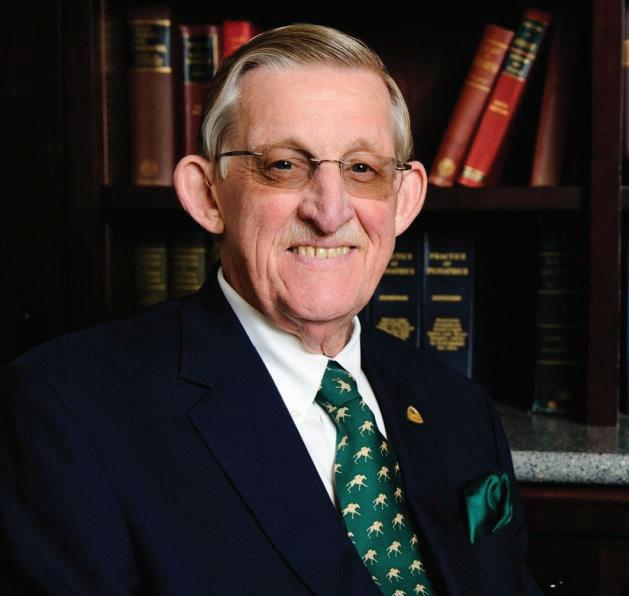
“In the end, how Scutch will be remembered will be based on how he loved. He loved only as a big man with a big heart can love. He loved his
family, friends, and colleagues in his own inimitable fashion. Scutch was my brother by another mother, the captain of my band of brothers, without him there is a huge hole in my life.”
The F. Douglas Scutchfield Endowed Professorship was established at the UK College of Public Health in 2008 to honor Scutch’s many years of service to the College. In addition, the College established a Faculty Scholarship for the Future of Appalachian Health, which provides scholarships to students pursuing an MPH degree who are from a Kentucky Appalachian county, have a commitment to improving heath in the region, and a desire to return to this region to promote and improve public health --- with Scutch as their role model.
Scutch will be remembered and missed by his myriad colleagues, friends, family, and students. He will be remembered best for his big, infectious smile and laughter.
A celebration of life took place at the University of Kentucky’s Lewis Honors College on Wednesday, June 22, 2022 at 4:30 p.m. and recorded on YouTube.
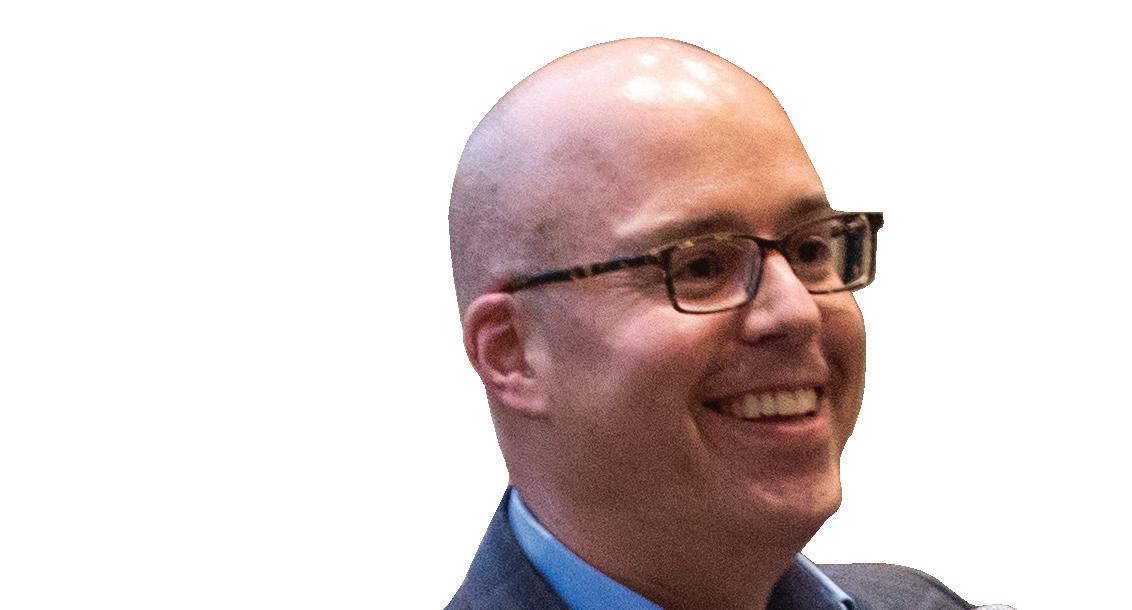 By Christopher Carney
By Christopher Carney
September 1, 2022, will be remembered as the date when the University of Kentucky’s College of Public Health (CPH) community came together to celebrate public health at the inaugural “Pump It Up” event – a place where everyone belongs and believes in building a healthier world.
“This was a significant event for our college community and a special opportunity to come together. What an awesome way to honor our students and their commitment to public health!” says Dr. Heather Bush, Acting Dean at CPH. “I am grateful for everyone that made this celebration happen, with special thanks to our guest speakers. It was wonderful to celebrate the contributions made in public health every day.”
At this event, approximately 200 students, faculty, staff, alumni, community partners, and supporters of CPH were able to experience a new appreciation of being a “pumped-up” public health champion.
“Community is central to public health, whether we’re working with communities around the state, nation, and world to prevent disease and promote health or celebrating our own community right here at CPH,” says Dr. Anna Hoover, faculty member at CPH. “It is a privilege to welcome new members of our community and celebrate those who have been here since our college was established. Together, we will strengthen the health of Kentucky and beyond!”
Attendees learned about the significance of the pump handle in history, which is considered by many practitioners to symbolize the birth of public health.
In the mid-1800s, John Snow, M.D., a historical figure in epidemiology, provided one of the earliest examples of using epidemiologic methods to identify the risk for disease and recommend preventive action. On Aug. 31, 1854, London, England, experienced an epidemic of cholera, and Snow suspected water from the Broad Street pump as the source of disease.
Removal of the handle on the pump prevented additional cholera deaths, supporting Snow’s theory that cholera was a waterborne, contagious disease. Snow’s studies and the removal of the pump handle became a model for modern epidemiology.
The highlight of the Pump It Up event was attendees’ participation in the public health professional’s oath, delivered by Dr. James Holsinger, chancellor-emeritus, Wethington chair-emeritus, and professor-emeritus of Preventive Medicine at the University of Kentucky.
Upon affirming this oath, students received a certification inducting them into the Alpha chapter of the Pump Handle society.
“The Pump It Up event was a great reminder of how important community is!” says Megan Hannah, staff member at CPH. “It was so nice to see everyone in the public health community come together to induct our future leaders into the Pump Handle society.”
In addition, special guest speakers included Dr. Crystal Miller, public health director for the WEDCO District Health Department, and Dr. Steven Stack, commissioner of the Kentucky Department for Public Health, who was

introduced by Dr. Kathleen Winter, state epidemiologist for the Commonwealth of Kentucky.
“It was amazing hearing these professional speakers and champions for public health,” says Christopher Otieno, current student at CPH and the University of Kentucky. “I received amazing insight on what I need to do to succeed. My biggest take away is that people will always remember how you treat them and to remain humble no matter where you end up in life.”
The College plans to continue the “Pump It Up” celebration on an annual basis and with additional events that reinforce the value and purpose of our public health community, which is building a healthier world for everyone.
To learn more about our people, programs, and passion for public health, visit us at cph.uky.edu.


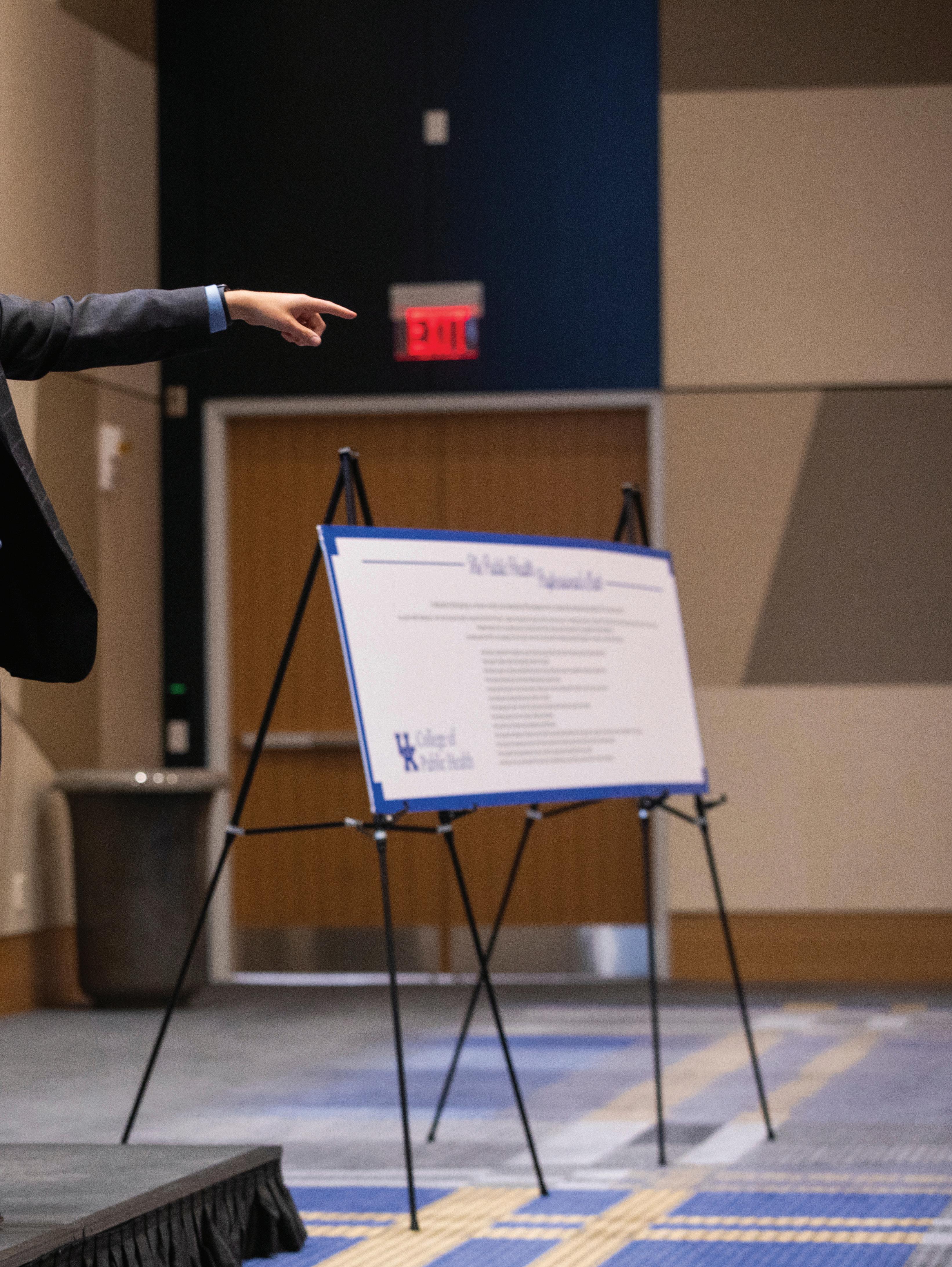
In dedication to these high goals, on my honor, and with a clear understanding of these obligations that I as a public health professional have accepted, I do, this day, commit myself.
As a public health professional, I hold sacred my duty to protect and promote the health of the public. I believe that working for the public’s health is more than a job, it is a calling to public service. Success in this calling requires integrity, clarity of purpose and, above all, the trust of the public. Whenever threats to trust in my profession arise, I will counter them with bold actions and clear statements of my professional ethical responsibilities.
I do hereby swear and affirm to my colleagues and to the public I serve that I commit myself to the following professional obligations.
“THE PUMP IT UP EVENT WAS A GREAT REMINDER OF HOW IMPORTANT COMMUNITY IS!”

ABachelor of Public Health (BPH) degree from the University of Kentucky’s (UK’s) College of Public Health (CPH) offers students many paths to make the world a better place. With the undergraduate degree’s solid public health foundation, graduates are equipped with the tools to advocate, to promote, and to transform health care.
For many students, the bachelor’s degree is the career-ready credential necessary to embark on professions in public health management, policy, data, education, analytics, or communications. For others, the BPH is the underpinning for further education in medicine, pharmacy, dentistry, law, public policy, physical therapy, or a host of other academic pursuits.
Students’ initial paths into undergraduate public health education are as myriad and diverse as the opportunities available to them after they have earned a BPH degree. Choosing a career path is a major life decision, and selecting a college major is an important step. Several CPH students recently shared why they chose public health.
Half of eventual degree recipients arrive at the University of Kentucky with BPH as their declared degree. Most of those students had spoken previously with a CPH recruiter and student advisor or read about the BPH as part of their college planning.
The other half of students who eventually graduate with a BPH came to UK as undeclared majors or with initial plans to pursue a different degree. The UK core course CPH-201: Introduction to Public Health has served as a significant channel into the BPH program for undeclared students in their first or second year. Undergraduate transfers from pre-med are another prominent pathway to CPH’s undergraduate degree.
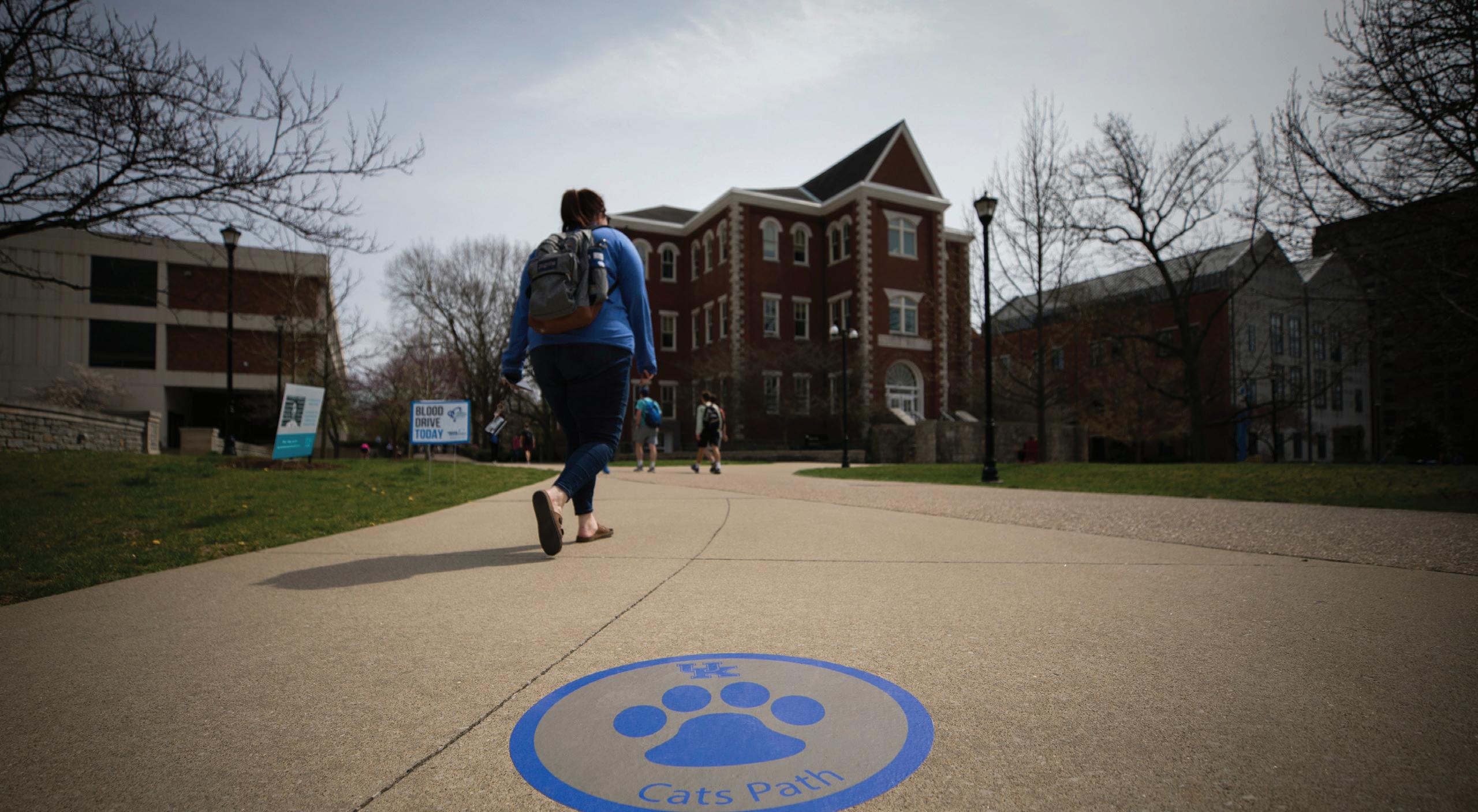
The question heard over and again: What is public health?
Typically, BPH candidates are students who felt a desire to help others and wanted a career where they can act on that passion. They saw the “big picture” of health care and were motivated by the ideals of health access and policy. Most were exposed to public health concepts while in high school, but typically did not learn about the field of public health until they began their college search or—for a significant percentage—until after they had arrived on campus for their undergraduate journey.
Second-year student Emma Grace Hague committed to the BPH program after already being accepted to UK but before starting classes. “In high school, I had learned about public health concepts like health inequities and epidemiology, but I wasn’t aware that those concepts could be studied as part of an undergraduate degree. Luckily when I got to UK, I was introduced to an advisor who connected my love of advocacy and interest in science/medicine to public health.”
Jade Forest is a third-year BPH student who plans to apply for CPH’s dual bachelor’s/master’s degree option. She started at UK as a premed student and recalls some confusion about public health when she made the decision to switch majors. “When I was accepted in CPH, I met all these other students who had been pre-med or other wellknown majors, then we had to tell our parents that we were going into ‘public health,’ a field no one ever heard of. Now, I’m so happy to be able to introduce public health to little girls and boys and tell them, ‘This is what you need to do!’”
When Dr. Sarah Cprek, assistant professor and director of undergraduate studies at CPH, first started at the College, she was an adjunct instructor for CPH 201: Introduction to Public Health. CPH 201 is an elective course within UK’s core requirements.
Dr. Cprek quickly noticed that the course was serving as a recruitment tool for the BPH program. “Many students take CPH 201 to fulfill UK’s social sciences requirement. They take the class as freshmen or sophomores and realize, this is a path to what I want to do with my life.’”
”Currently, five CPH 201 classes are open to the entire university to meet the undergraduate core requirement. Dr. Cprek notes that academic advisors suggest CPH 201 to students when they see a good fit of interest areas.
“Then, after students start the course, so many of them who did not know about public health realize they have found an alternative path to positively impact health outcomes. It is one of our best recruitment tools for the BPH program.”
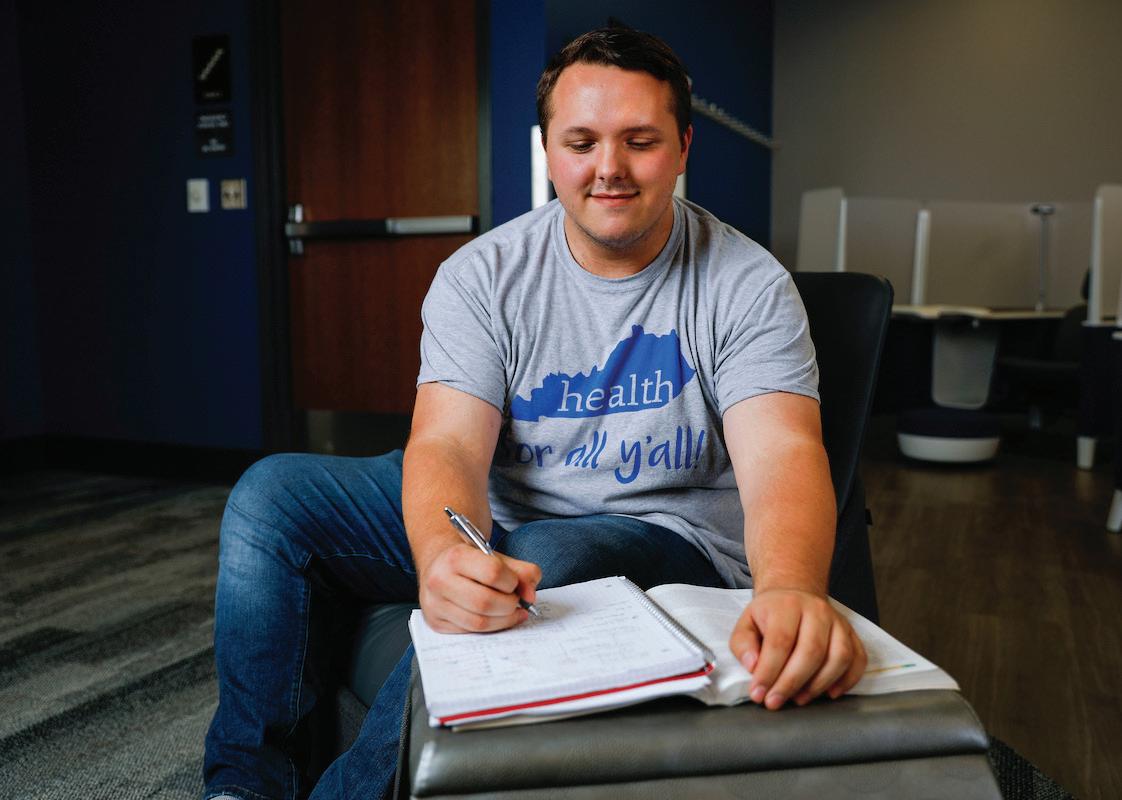
CPH 201 inspires students to consider public health
Part of what we do in public health is to imagine what we can do as a society and how we can create the world we want to live in. Public health students are interested in being part of a larger solution in the world.
BPH students join other CPH students, staff, and faculty in efforts to give back to the community
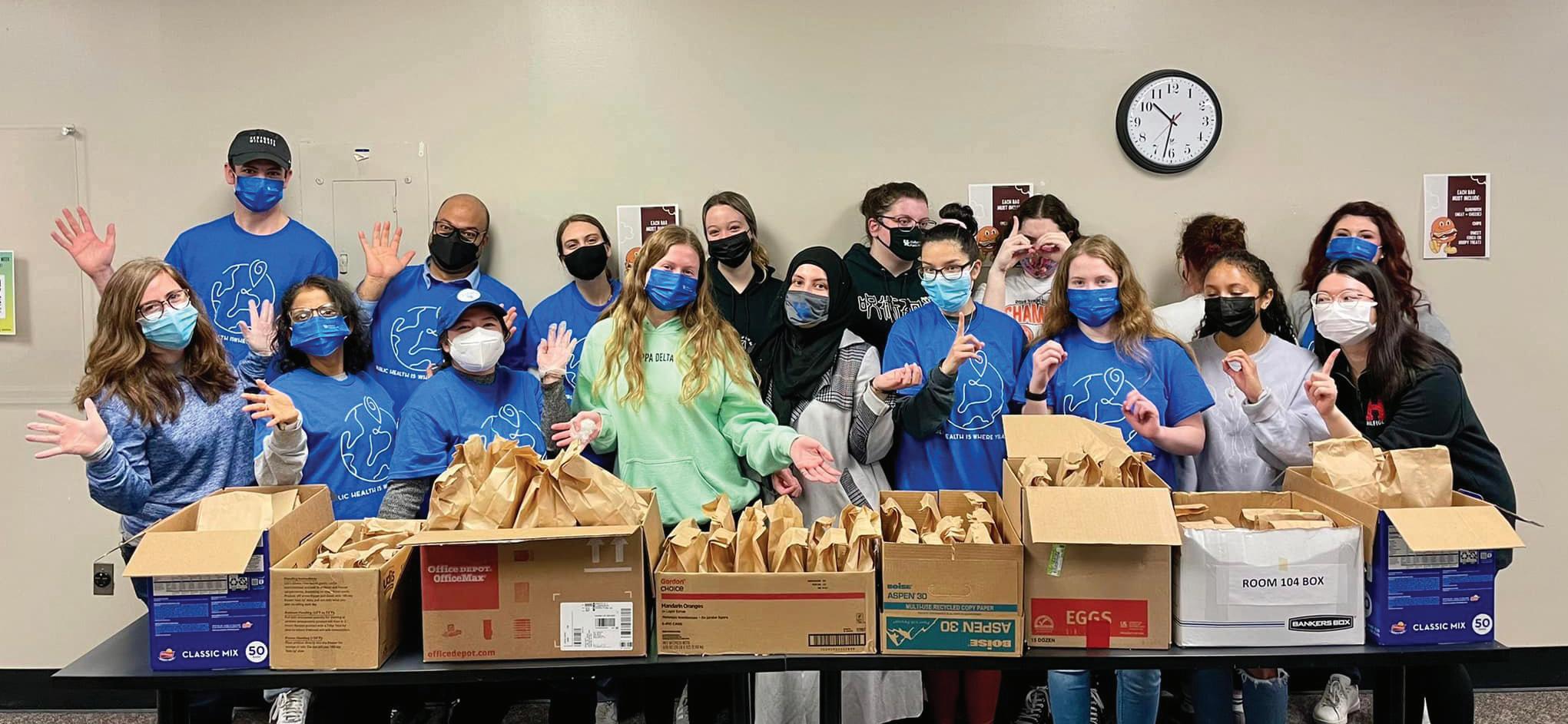
Empathy, equity, and community are three of the most common ideas discussed when BPH students reflect on their inspiration to pursue a public health degree.
Dr. Sarah Vos, assistant professor and director of undergraduate research in the College of Public Health, notes that “public health naturally appeals to students with interest in social well-being. Public health speaks to what they want to do in the world.”
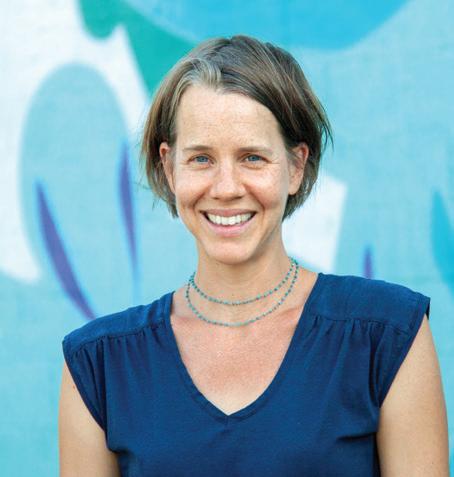
Concern about local health care disparities inspired second-year BPH student Olivia Allran to enter public health. “The most important reason I declared [in the] BPH [program] was to learn how to best give back to the communities I am a part of and to help them live the best lives they possibly can,” she says.
“Kentucky—especially Appalachia—has some of the highest rates of cancer in the country. Having many close family members from Eastern Kentucky, this
fact hits close to home. I would love to help reduce these staggering statistics and increase the access to health care, especially cancer screenings and treatment, in these areas.”
Fellow student Vanessa Diaz also finds inspiration in the “public” part of public health.
“My interest in considering a public health degree is my desire to help the community,” the fourth-year BPH candidate says. “I genuinely experience a great sense of satisfaction and fulfillment being able to provide for those who otherwise wouldn’t have access to what you’ve provided them with.”
“A true public health perspective includes thinking about justice and equity,” says Dr. Vos, who believes the great causes of public health appeal especially to individuals who have experienced inequity in their lives. “Part of what we do in public health is to imagine what we can do as a society and how we can create the world we want to live in. Public health students are interested in being part of a larger solution in the world.”
Third-year BPH student Princess Magor Agbozo, recipient of this year’s Lyman T. Johnson Torch Bearer Award, reflects on her own experiences that led to her current studies. “Growing up, I had the opportunity to live in different places, which exposed me to different lifestyles, cultures, and health settings,” she recalls.“Having spent a lot of time in health care institutions because of family ailments, I noticed that health care accessibility and services differed according to location and environments. How health care was administered in one environment did not necessarily apply to another environment, which was intriguing to me, which then fueled my passion and interest in public health.
“At the time, I was not aware of the concept of ‘public health;’ however, I did know that I wanted to contribute to bettering the health of populations and ensuring that health care accessibility and services are available to any- and everyone, regardless of the environment or location they may be in.
“With this goal in mind, I initially enrolled into UK as a biology major, but after conversations with my advisor and taking my first CPH class—CPH 201: Intro to Public Health—I knew public health was the route I wanted to follow.”
The relationship between public health and medicine is complex. The BPH is a common undergraduate degree for many students who plan to pursue advanced degrees in medicine, dentistry, physical therapy, and other medical fields. For them, public health studies complement their medical ambitions.
Olivia Allran cites “a combination of an interest in medicine and public health policy” for her decision to become a BPH major.
“I did not begin to pursue a BPH until my second semester sophomore year. I started at UK as a biology major. While I enjoyed the content and am still continuing to pursue a biology minor along with my BPH, I felt there was more to health care and medicine than solely the biology behind a disease or illness.
“I knew that there were social and structural determinants of health that, for many reasons, often prevented people from seeking or being able to obtain the care that they need. I want to be able to understand my patients’ backgrounds and beliefs, to better help them. I have always been told that you treat the patient, not just the disease.”
Further studies in medicine also is the plan for Emma Grace Hague. “My goal is to eventually attend medical school; I decided to pursue a public health degree to get a better understanding of the behind-the-scenes infrastructure that occurs outside the clinical setting. I also feel very passionate about addressing health care inequity,
and knowledge of public health is vital to that,” she says.
“My interest in public health started off as an interest solely in medicine, but as I began learning more and more about how clinical care interacts with the broader spectrum of public health, I’ve begun really enjoying both sides of the coin.
“I decided to declare a BPH major because it combined my interest in clinical medicine while still looking at the bigger picture. Studying public health has given me the opportunity to learn more than how to just treat individuals, I have gotten to learn how to treat entire communities.”
Vanessa Diaz sees her forthcoming BPH degree as an academic advantage as she considers future medical studies. “I found CPH because of my initial interest in going to medical school. After speaking to a representative of the college, they told me that majoring in public health would make my application for medical school stand out as many applicants are biology majors or a major that is science-related.”
Ashley Duff, a BPH graduate who is now working on her Master’s of Public Health, also views a public health undergraduate degree as a solid foundation. “A BPH degree will prepare me for the career I want to have (hopefully, a doctor) because it has given me knowledge in another field of health care that focuses on the population rather than an individual,” she says. “I believe if I become a doctor, I’d be more well-rounded. Because of my degree, I’ve learned about everything from causes of
disease, to why people pick up unhealthy habits, and how to get them to stop.”
For many other BPH students, however, a public health education was specifically a path away from medicine. Indeed, dozens of pre-med students quickly discover every Fall semester they are more interested in the preventive and community aspects of health services than in the chemistry and biology of medical care.
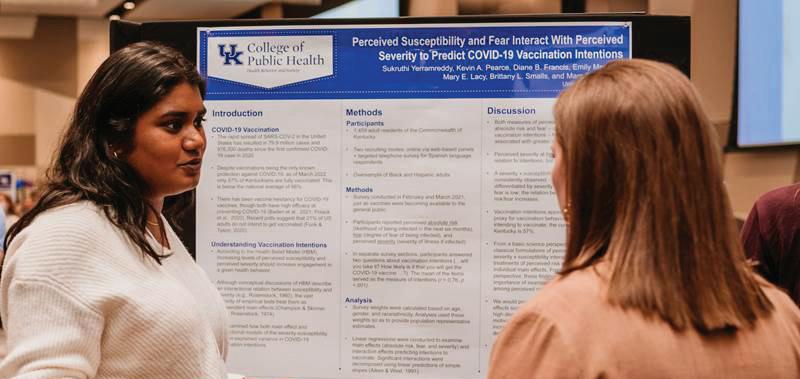
Recalling her goals as a high school student, Jade Forest says, “I knew I was going to be a doctor. I was going to be pre-med. But, as a freshman, I realized psychology and chem were not for me. I found [Director of Academic Advising] Jennifer Stevens and was able to see myself in public health.”
For Jade, the reality of medicine was not what she had envisioned when she was younger, and public health careers were more appealing. “I realized I don’t have to deal with patients, don’t have to be in a chem lab, I can be part of the community aspect of health— dealing with prevention, helping with recovery.”
Second-year student Faith Fursman recognized that “the idea of treating patients was something I was not the most interested in, so I started digging for what I could do instead. That is when I discovered public health. I found it because of a mixture of an interest in medicine and research. I have always known that I was interested in medicine and the science behind a lot of it.”
A path for those interested in health care, but not necessarily just medicine
We are a small community with the resources of a large university
At the College of Public Health, students enjoy a unique mix of “a small-college experience and large-university resources,” according to Dr. Sarah Cprek, assistant professor and director of undergraduate studies at CPH.
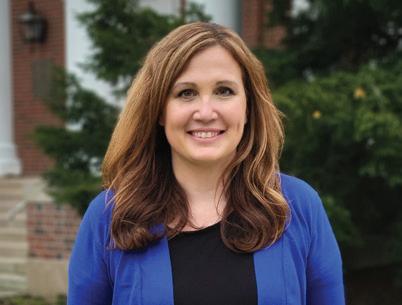
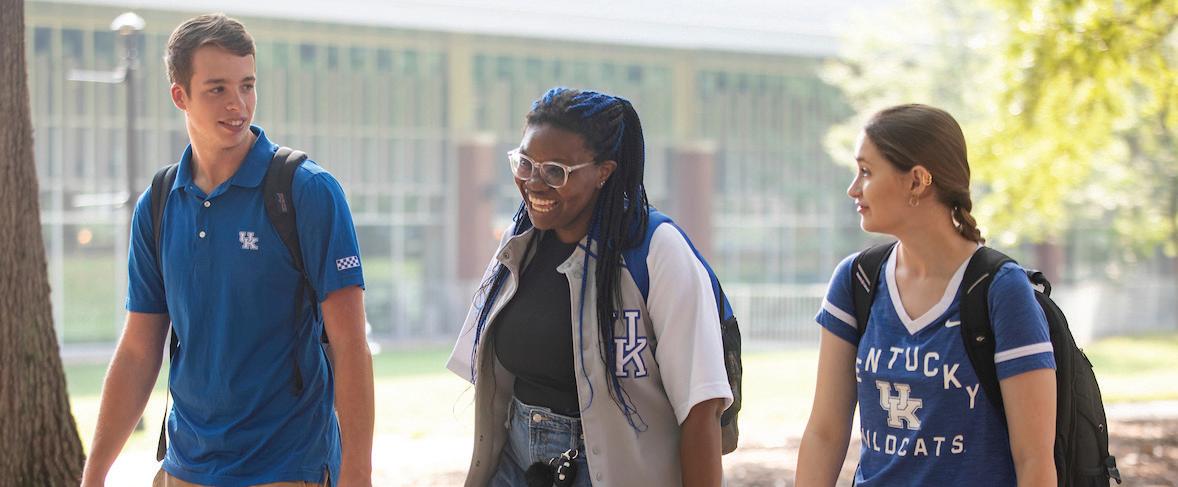
As a land-grant institution and Kentucky’s flagship university, UK offers significant academic opportunities and institutional facilities to all its undergraduate students. CPH is one of UK’s smallest colleges and boasts the close
community culture of a smaller school, however, ensuring that BPH students are not “lost” in the vastness of the larger campus community. BPH students mention direct interaction with faculty during undergraduate studies as one of the greatest benefits of the program. In addition to faculty access in class, BPH students have opportunities for research and independent study during their undergraduate careers.
Acting Dean Heather Bush points out that “a lot of things happening in BPH are core to the college. BPH students say they are here because they want
to make a difference. They are special, engaged, activists, and they want to change the world.” Dean Bush points out that the College of Public Health is number one in retention and graduation rates across campus.
Dr. Cprek credits “an intense focus on improving the classes and ‘scaling up’” the BPH program starting in 2015 for the program’s current success. She also notes CPH’s efforts “finding students who have expressed interest in health. We resonate with first-generation students, rural students, underrepresented minority students, students who have had challenging experiences.”
The College of Public Health has a student services office team that is dedicated in supporting undergraduate students from recruitment through graduation and beyond.
About half of the College’s eventual BPH graduates engage with SEAS— CPH’s Office of Student Engagement & Academic Success—before making the decision to study at the University of Kentucky. CPH recruiters share information with high schools across Kentucky and conduct in-person and virtual recruitment sessions across the Commonwealth.
SEAS staff also work closely with students who enter the BPH program after beginning their undergraduate studies at UK, either as undeclared
students or when they are considering changing their major.
Third-year BPH student Jade Forest recalls her first interaction with SEAS:
“I was one of the lucky ones to find out about public health during my first year. I talked to [Director of Academic Advising] Jennifer Stevens—who is amazing—during Fall semester of my freshman year. She introduced me to this field, public health, that does everything I’m interested in and become what I want. I enrolled in CPH in the Spring semester and received a peer mentor. I met with a wide variety of public health students who all had the same story.”
Fourth-year BPH student Vanessa Diaz
decided on a BPH path after speaking with SEAS at an open house event:
“I made the decision to pursue BPH the summer before starting my freshman year at UK after speaking to a representative from the College of Public Health at an open house event. I had never heard of public health prior to this. I was jumping back and forth between a nursing major or a biology major for medical school purposes. It has truly been the best decision I could have made. It was not until my Spring semester, freshman year, that I took my first introduction course for CPH where I truly learned what public health meant. Learning that public health seeks to treat the community was the determining factor for me to realize that I was in the right place.”
BPH is a career-ready degree that also serves as a solid foundation for advanced medical, policy, research, and academic degrees and certifications. Dr. Cprek says, “About half of our students go on to some kind of graduate or professional program. The other half use the BPH to enter directly into the public health workforce.”
Jennifer Stevens, who instructs CPH students in a course on public health careers in addition to her role as the College’s director of academic advising, says a stand-alone BPH degree equips graduates to make an impact on their community. “Like other careers, an advanced degree will help you move up and be eligible for advanced positions,” she says, “but BPH graduates are ready to start a meaningful and prosperous career.”
For BPH students who choose to continue their studies, Jennifer notes that “public health students often get their BPH base, then work in the field before determining what advanced degree to pursue.” She also shares that graduate certifications and licensures within the field of public health are valuable options for increased career marketability.

Third-year Bachelor of Public Health students in excellent academic standing have the option to apply for the University Scholars Program, an accelerated degree program allowing students to earn both the BPH and a Master of Public Health (MPH) within five years. Separately, the degrees require six years of study.
Known colloquially as the “Plus-One” program, the BPH/MPH option has an application process with requirements for minimum overall and major grade point averages, recommendation letters, and other documentation. The CPH website includes an application checklist and links: https://cphuky. edu/.programs/university-scholars-program


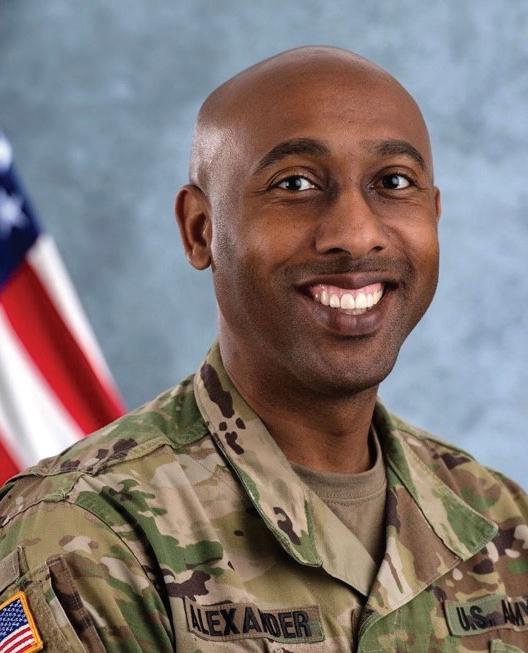 By Christopher Carney
By Christopher Carney
Alumnus Major Ahmad Alexander graduated from the Master of Public Health (MPH) program in 2018 and currently serves as the Chief of the William Beaumont Army Medical Center (WBAMC) Department of Public Health in the U.S. Army.
Located at Ft. Bliss in El Paso, Texas, WBAMC is a preeminent military health care delivery operation and one of the largest and most complex health care institutions in the world.
Growing up in a small town in Vacherie, Louisiana, Maj. Alexander’s childhood influences included his older brother and sister, who both served in the military–U.S. Army and U.S. Air Force, respectively.
“I looked up to both of them and they influenced my military journey,” he says. “I knew that I wanted to serve my country and decided to enlist in the Army during my senior year in high school.”
Serving in the Louisiana Army National Guard for eight years, from 1997-2005, as a unit supply specialist, Maj. Alexander moved up the junior-enlisted ranks from private to specialist.
He graduated from Nicholls State University with an undergraduate degree in Communicative Disorders in 2006. He then received his doctorate in audiology from Louisiana Tech University in 2010.
“In the military, audiology falls under public health, which used to be called preventive medicine,” says Maj. Alexander. “This was my first opportunity to help others be healthier by managing their disorders related to hearing, balance, and other neural systems.”
For several years, Ahmad expanded his professional experiences in audiology at the Southwestern Ear, Nose and Throat Clinic (New
Mexico), West Texas Rehabilitation Center (Texas), Reynolds Army Community Hospital (Oklahoma), Vilseck Army Health Clinic (Germany), and the U.S. Army’s Public Health Center (Maryland).
In 2016, the Army provided Maj. Alexander with an opportunity to expand his education in public health.
“I applied and was accepted to several schools to get my MPH,” he says. “I chose the University of Kentucky because I felt a good rapport. They were interested in me just as much as I was interested in them. While being stationed in Germany at the time, the collaboration and communication between the students and the faculty really stood out for me.”
In 2020, two years after graduating with his MPH degree from the University of Kentucky’s College of Public Health, Maj. Alexander took his advanced education and was tapped as the next Chief of Public Health for the U.S. Army at WBAMC.
Maj. Alexander oversees approximately 100 staff members across eight programs: Army Hearing, Army Public Health Nursing, Army Wellness Center, Environmental Health, Health Physics, Industrial Hygiene, Occupational Health, and Senior Leader Sustainment. Each of these programs is managed by a program chief, who reports directly to Maj. Alexander.
Maj. Alexander leads as the public health subject matter expert for a beneficiary population of greater than 130,000 spanning a training area of 550 square miles that includes Fort Bliss, Texas (FBTX) garrison, White Sands Missile Range, Base Camp Dona Ana, Base Camp McGregor, Base Camp Oro Grande, and Base Camp Westbrook.
Overseeing a budget of $6.5 million, Maj. Alexander and his team supply force health protection guidance for the 1st Armored Division and FBTX tenet units to ensure a medically ready force. He also serves as the alternate public health emergency officer for the FBTX footprint.
“Growing up in a small town and now leading the public health efforts for a community of this size is certainly a stark contrast,” says Maj. Alexander. “In order to properly serve our population, we rely on collaboration. Our team works with the state and city health departments. Networking and knowing your resources are essential.”
Maj. Alexander recognizes that sometimes there can be a perceived difference in the mission of public health for civilian populations versus military. To him, the goal is still the same.
“It is still all about protecting the health of the community and the people that we serve,” he says.“It is about putting people first, and that includes everyone. When the final troops came out of Afghanistan, our base housed approximately 10,000 Afghans. We did not refer to them as refugees. We called them our ‘guests’ and we made sure that their living conditions met our public health standards.”
In his duty and role on base, Maj. Alexander believes that being a health champion is about protecting people’s health, their mental health, and work/life balance and understanding that family matters and that we must get to know the person behind the uniform, their rank, and position.
“Once we do that, we can come together, collaborate, and be champions for entire populations,” says Maj. Alexander. “We must look at people as people and not just numbers.”

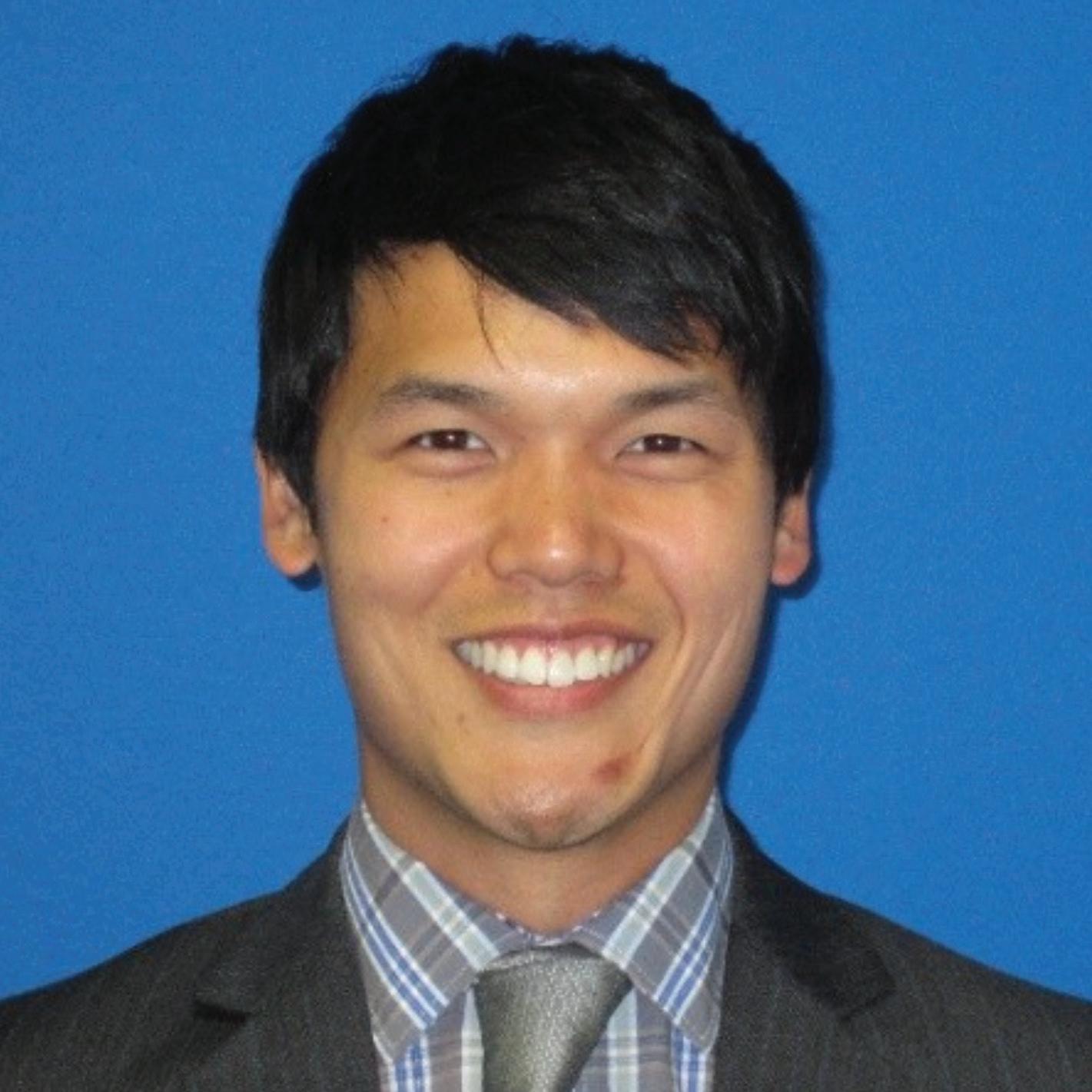 By Christopher Carney
By Christopher Carney
eorge Zhang (‘15) is an accomplished young alum. George is a graduate from the Master of Health Administration (MHA) program at the University of Kentucky’s College of Public Health (CPH) and has quickly climbed the ladder to become a hospital administrator for both Ascension St. Vincent Clay and St. Vincent Dunn hospitals.
Ascension St. Vincent is a member of Ascension, the nation’s largest not-for-profit Catholic Health care system and is Indiana’s largest health care employer, with 22 health ministries serving 47 counties in central and southern Indiana.
Raised in Lexington, Kentucky, some of George’s biggest influences growing up were his Chinese heritage, his father, and later his Catholic faith.
George was a biology major and ran cross-country and track at Centre College in Danville, Kentucky. While at Centre, he participated in an internship at the Danville Physical Therapy Clinic, which provided George with his first glimpse of interacting with patients.
After George graduated from Centre College in 2011, he worked at Baptist Health as a rehabilitation technician while enrolling in post-baccalaureate classes at the University of Kentucky.
George’s life changed after interacting with a patient that had a stroke. The patient was in her mid-30s and lacked the strength to stand up on her own.
While George was taking the patient’s blood pressure, which was extremely low, George asked if she was a runner. The patient smirked and said, “I can barely walk, what makes you think I can run?”
George, knowing the patient as he did, understood this reaction as a lighter, more positive outlook on life.
“This moment was humbling for me, and that’s the type of environment that we should be providing for all patients,” says George. “I decided that I wanted to make an impact for not only one patient at a time but a community and population of people.”
George started exploring MHA programs and found himself connecting with Dr. Martha Riddell at the University of Kentucky’s College of Public Health. Dr. Riddell, at the time, was the Director of the MHA program.
With Dr. Riddell’s help and guidance, George recalls getting his application submitted just in time to start in the Fall semester of 2013.
“I was very impressed with the level of prestige and experience with my professors, like Dr. Riddell, Dr. Julia Costich, and Dr. Larry Prybil,” says George. “They have earned credibility, genuinely care, and want you to succeed.”
While enrolled in the MHA program, George was part of the MHA Student Association and held a 4.0 GPA. He was also a graduate assistant at UK HealthCare.
When it came time to choose a fellowship, George received two offers for fellowships at organizations that both happened to be Catholic. George chose St. Vincent Health.
“God always has a plan for us,” says George. “Relationships matter, and this prestigious fellowship at St. Vincent happened because of faculty like Dr. Riddell and Dr. Prybil. They go to bat for you.”
George joined St. Vincent Health in 2016 and has held various leadership positions, including administrative specialist, director of business operations, Interim hospital administrator, and his current role as hospital administrator (Clay and Dunn hospitals), which he started right before COVID-19.
“Leading our facilities through that time of uncertainty was challenging,” says George. “We have a dedicated, passionate team, and we were able to be nimble and agile, placing new processes that changed frequently to ensure the safety of our patients and our associates.”
George is always reminded, and motivated, by the organization’s mission, which involves serving everyone, with special attention to the poor and most vulnerable.
“We are here to serve a population that is, at times, underserved,” says George. “We provide an economic impact to our community, which is so important to our community’s viability.”
Going forward, George, and his team at Ascension St. Vincent, continue to look forward to serving their community.
Over the years, George has been a generous alum and has given back in several ways, including professional development, helping with etiquette dinners, and more.
“I want our MHA grads to come out and make a good impression,” says George. “The MHA program at the University of Kentucky is right there with some of the best programs in the country, and I want to do my part in making sure that these students are getting the best opportunities to lead.”
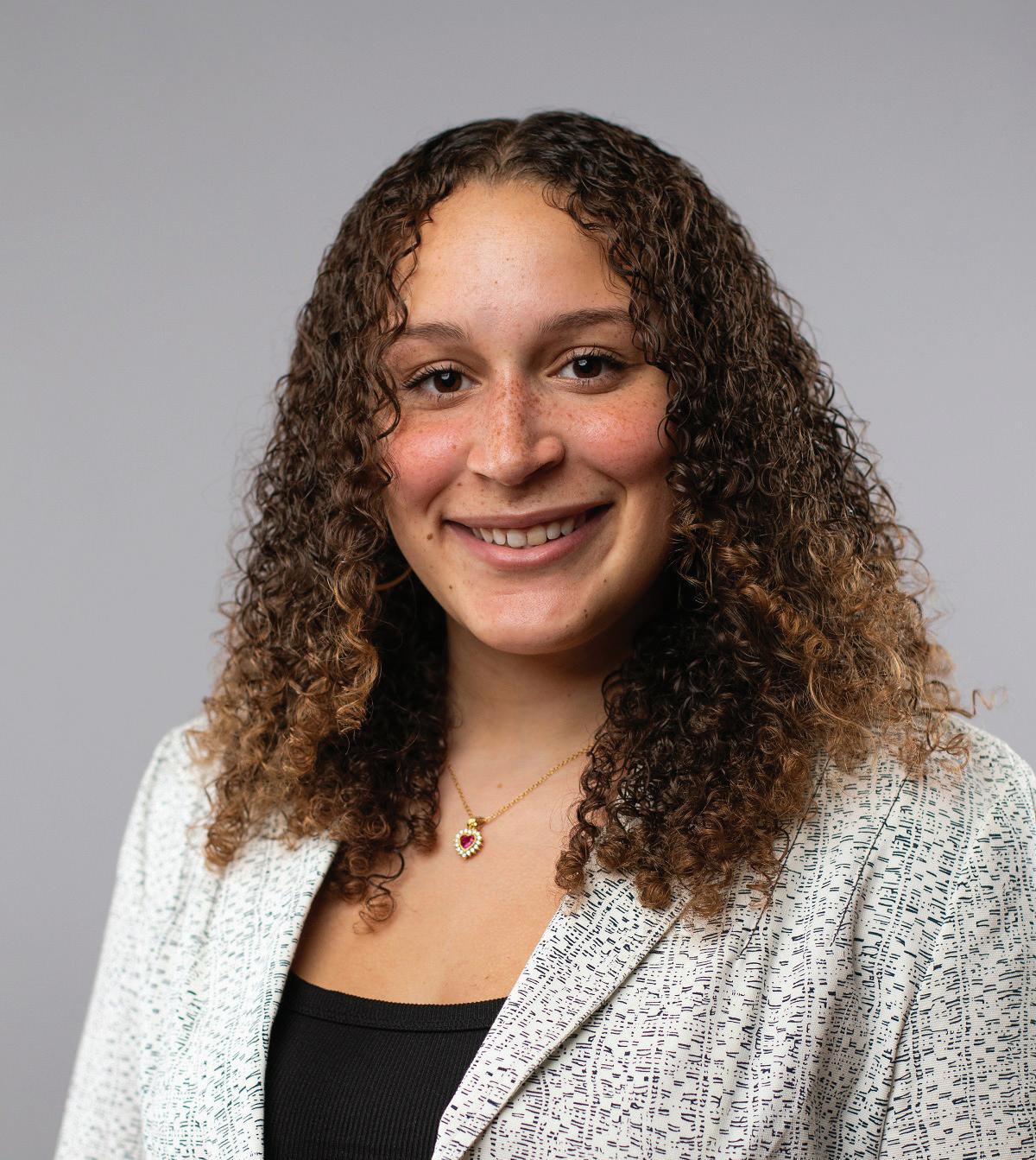 By Christopher Carney
By Christopher Carney


First-generation college student Ashley Wright is carrying a legacy for her family.
Ashley’s father passed away at an early age, which set her on a course to find a purpose and passion for helping others.
“I came from humbling beginnings,” says Ashley. “Losing my father helped shape me. It is one of the main reasons why I am here and pursuing an education at the University of Kentucky.”
When Ashley originally enrolled at UK, she was a biology major and was working her way through college at Walgreens. Ashley aspired to become a pharmacist. For some reason at the time, Ashley felt there was something more out there for her.
During an advising appointment, Ashley came in touch with Dr. Florence “Flo” Fulk, current faculty member in the Epidemiology and Environmental Health department at the University of Kentucky’s College of Public Health (CPH).
“Dr. Fulk started talking to me about public health, and more specifically, environmental health,” says Ashley. “At the time, I was doubting my strengths, but Dr. Fulk gave me confidence that I could do this.”
Ashley found herself taking Dr. Fulk’s environmental health undergraduate course and was immediately impressed.
“Dr. Fulk was so passionate about teaching epidemiology and environmental health,” says Ashley.
“We just connected in her class, and I started loving public health. I was also impressed that she brought her professional experiences from the Environmental Protection Agency (EPA) into the classroom. She also brought real-world stories of her impact in improving
the health of populations, which also inspired me.”
After further discussions with Dr. Fulk and her own family, Ashley enrolled in the accelerated University Scholars Program, a unique opportunity to get Bachelor of Public Health and Master of Public Health (MPH) degrees in just five years.
“After Dr. Fulk’s class, I knew that I wanted to build my legacy for myself, and on behalf of my family, in public health,” says Ashley. “I have always wanted to help people, and Dr. Fulk helped me discover this passion through public health.”
Because of Dr. Fulk’s class, along with other CPH faculty mentors included Dr. Rick Ingram and Dr. Sarah Vos, Ashley set a course for absorbing public health more, which led to pursuing a one-day shadowing experience at the EPA in Cincinnati, Ohio.
“This was one of the most amazing experiences I’ve ever had,” says Ashley. “I met so many great people and got to view the different laboratories. This experience certainly solidified my commitment and career in public health.”
Ashley is set to graduate with her BPH degree in May of 2023 and her MPH in 2024. Beyond graduation, Ashley is dreaming big.
“I want to work for a government agency like the EPA, CDC [Centers for Disease Control and Prevention], or FDA [Food and Drug Administration],” says Ashley. “I want to make a difference and change people’s lives.”
Ashley was recently accepted to the Spinal Cord and Brain Injury Research Center African American Research Training Scholars Program, an opportunity to receive up to 12 months of funded research training in neurotrauma at
the University of Kentucky’s College of Medicine. Going forward, Ashley plans to find additional shadowing opportunities, internships, and valuable practicum experiences to boost her resume and credentials.
“I want to gain more experiences so I can be ready to change the policies that can help everyone be healthier,” says Ashley. “For instance, food is not well regulated right now. I can be that person that helps more people know exactly what they are putting in their bodies and change regulation policies in the food industry.”
Through her coursework and experiences, Ashley has come to understand that public health is more than just COVID and infectious diseases.
“Public health is about informing people and changing someone’s perspective on their health,” says Ashley. “It’s about giving people a chance to live healthier.”
She credits her positive experiences so far at CPH to the great faculty and staff.
“The College is hiring great people to support us, the students,” says Ashley. “The faculty have great experiences in the field, provide lots of opportunities, and conduct impactful research.
“The staff are also incredibly supportive. My academic advisor, Jennifer Stevens, does so much to help set me up for success. If you want to be successful and be surrounded by people that care, then this is the College to be at.”
Ashley is looking forward to graduating, but also to making her family proud.
“All my life, I’ve had to fight harder than most,” she says. “I am doing this for my family and want to be able to take care of them one day. My drive and my background are what separate me from most. I am willing to do what it takes.”
Jennifer O’Brien is a current student in the Master of Public Health (MPH) program with epidemiology concentration at the University of Kentucky College of Public Health (CPH) and is on track to graduate in Spring 2023.
With an undergraduate degree in biology from Centre College and a master’s in secondary education from the University of Kentucky, Jennifer naturally wanted to become a teacher and did. For the past two years, she has taught biomedical science as part of Frederick Douglass High School’s (FDHS) pathway program called Project Lead the Way (PLTW) in Lexington, Kentucky.
PLTW is one of the nation’s leading providers of science, technology, engineering, and math (STEM) programs. Students interested in careers in health care, science, and epidemiology, for instance, would be interested in taking some of Jennifer’s courses.
Jennifer invited Dr. Kathleen Winter, the current state epidemiologist for the Commonwealth of Kentucky and assistant professor at CPH, to speak to her students on a variety of epidemiology topics.
Afterwards, Jennifer spoke with Dr. Winter. From this conversation, Jennifer made the decision to pursue the MPH program at the University of Kentucky.
“The MPH has given me a new perspective on how education and health care can come together,” says Jennifer. “Teachers, like myself, have a rigid schedule, but the professors have been very flexible with me.”

As part of the academic requirements in the MPH program,
students must pursue and complete a practicum experience. Jennifer had visited Kenya previously in 2020 and met a teacher who teaches public health in Nairobi-the country’s capital-and mentioned a nonprofit organization called WaterStep to Jennifer.
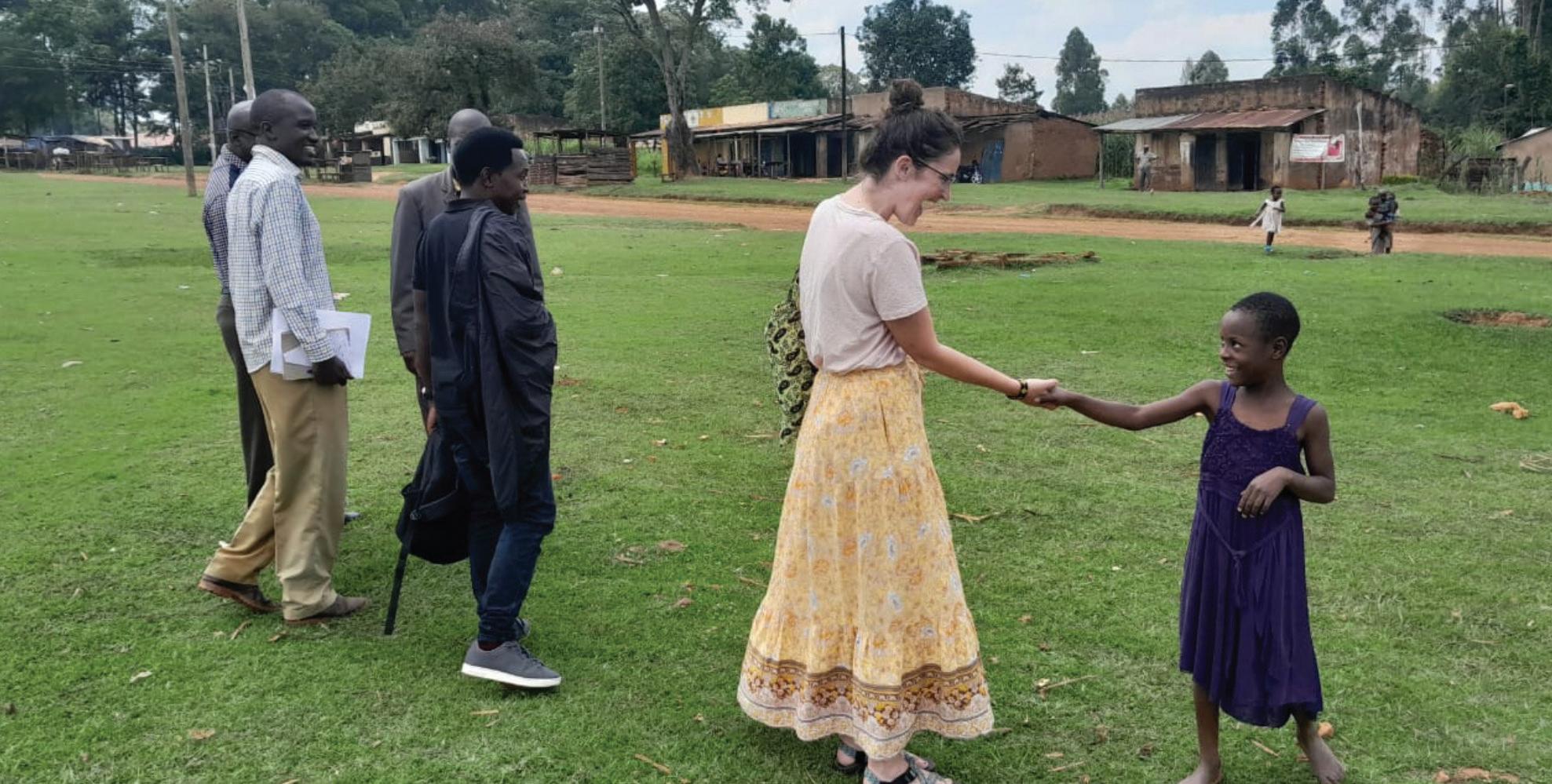
Based in Louisville, Kentucky, WaterStep’s mission is to provide safe water to communities in developing countries around the world.
WaterStep trains people in these developing countries on how to use safe water solutions like water chlorination, bleach making, health education, and well repair, to empower communities to take care of their own water needs.
Jennifer returned to Kenya in the summer of 2022 to teach and fulfill her MPH practicum experience with WaterStep.
Raphael Wanjala has been an international water ambassador of WaterStep Kenya since 2015. Raphael is a trained teacher at the University of Nairobi, the largest university in Kenya.
While teaching courses in culture and social transformation, Raphael recognized that something needed to be done in the community that would bring change. He learned about WaterStep and its mission of bringing change by placing it in the hands of the people.
Through a mutual friend, Raphael and Jennifer were introduced in the summer of 2020—Jennifer’s first visit to Kenya.
On the way to visiting the rural town of Bungoma, Raphael and Jennifer talked about their passion for public health and the role that education played.
“During that conversation, I remember thinking that it would be great to come back to Kenya and work at WaterStep with Raphael,” says Jennifer. “Two years later, that is exactly what happened through the MPH practicum.”
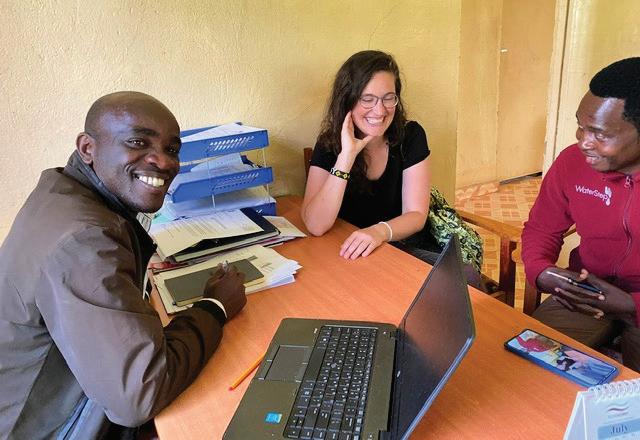
When Jennifer arrived in Kenya, Raphael picked her up at the airport and started introducing her to
local, rural communities that needed clean water.
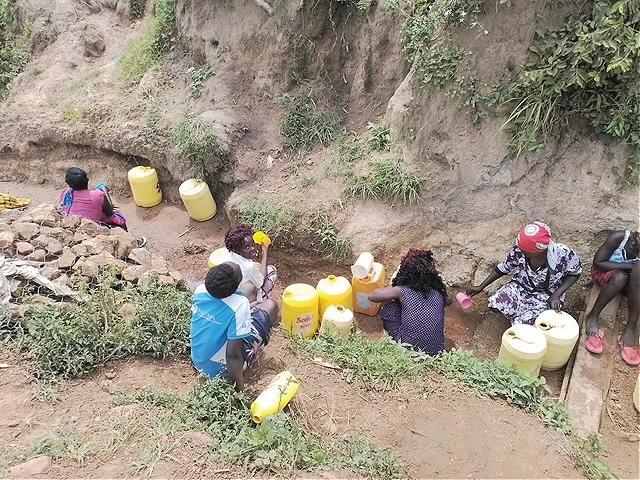
Jennifer, Raphael, and other volunteers started the journey of educating the people on WaterStep’s portable bleach machine, which makes a chlorine solution that can purify drinking water by eliminating all pathogens.

In locations where WaterStep installed the safe water equipment, one of the goals was to collect data on how the population has been impacted by having safe water and improved sanitation. In locations that did not have this technology, finding a clean water source is challenging.
“If you do not have a secure source of water, you are spending major parts of your day finding water, which falls on women and children in most cases,” says Jennifer. “Water collection for women and children could mean they are having to get up early or sacrifice being in school.”
When visiting local clinics and the community, they witnessed WaterStep’s technology having a positive effect.
“You can clearly see they can better take care of their families and live healthier lives,” says Jennifer.
Raphael believes WaterStep is training, empowering, and transforming people with this technology so they impact other communities nearby with making their water safe and clean.
“We are saving people’s lives by giving them clean water,” says Raphael. “I hope one day the entire world will have safe water to drink.”
Raphael shared that the bleach making machines have reached 5 million people to date and this year they are trending toward 7 million.
The College of Public Health and the MPH program seeks practicum experiences to further develop our students into public health champions and prepare them for actionable careers in public health service.
Practicum experiences are tailored to our students’ needs and professional interests. As a result, our students take a primary role in researching potential sites and identifying potential mentors for approval.
Contact Janie Cambron, Associate Dean for Practice and Workforce Development at CPH, at cph.uky. edu/careers/workforce-development to learn more about our practicum opportunities.
In a recent survey, 69.2% of adults aged 18 to 24 reported symptoms of anxiety, depression, or both, according to the Anxiety and Depression Association of America
This figure, theoretically, represents a number of students and young professionals currently attending the University of Kentucky, where a record number of incoming first-year students recently started the Fall 2022 semester. Building on the university’s commitment to student success, in January 2021, Dr. Corrine Williams was tapped to help lead student well-being efforts on campus.
Williams is the current acting associate vice president for student well-being at the University of Kentucky’s Office for Student Success and is an associate professor in the Department of Health, Behavior and Society in the College of Public Health (CPH).
“The University of Kentucky is like operating a small health department when you have approximately 32,000 students and approximately 600 student organizations,” Williams says. “These numbers can be overwhelming in a sense. That is why we must create a point of connection for our students and help them find their place and purpose on campus.”
Mental health and student well-being have been top priorities of the administration of UK President Eli Capilouto, who reorganized student service offices in 2020 to enhance student well-being by forming the Office for Student Success. President Capilouto also established a mental health task force in 2019 — before the COVID-19 pandemic — to address this need.
Williams believes the university is on the leading edge with servicing the mental health needs of its population, but she recognizes students are carrying more anxiety and stressors than in prior academic
cycles as they return to a “new normal” following COVID.
“This is a period of huge development and transition for our students,” Williams says. “During COVID, many students went from an isolated college experience to now being back on campus. Developing relationships, becoming independent, and figuring out how to socialize again — for both new and returning students — can lead to high anxiety and stress.”
To support and serve the overall well-being of the students, UK has seven student support units that report directly to Williams: the Student Financial Wellness Center; the Violence Intervention and Prevention Center, the Disability Resource Center, Campus Recreation; the UK Counseling Center; and two units that are new this fall, TRACS (Triage, Referral, Assistance, and Crisis Support) and POWER (Prevention, Outreach, and Wellness Education Resources).
“We must reimagine our mental health services and give our students easier access to interface with support systems and licensed professionals,” Williams says. “When in doubt, TRACS is the best place to start for our students who are unsure of where to begin. TRACS will get you where you need to go.”
TRACS is the new “one-stop shop” where students can come for a quick referral to support services or to receive direct clinical support for a range of mental health needs and crises. Services are offered in person and virtually, Monday through Friday from 8 a.m. to 5 p.m. Visit go.uky.edu/tracs.
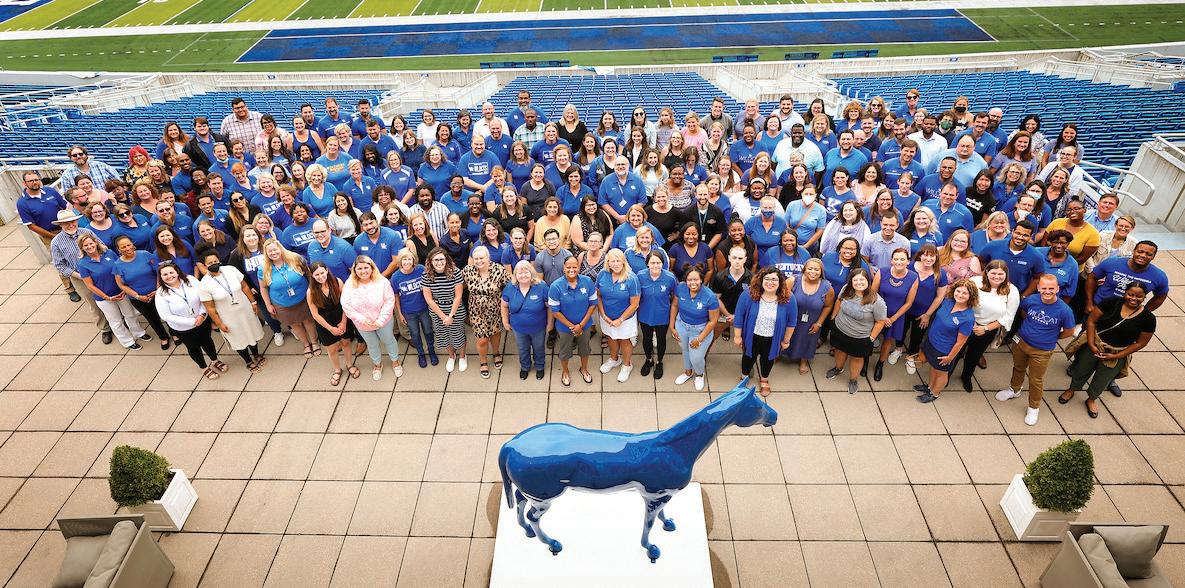
POWER is a centralized, primary prevention unit that focuses on health education and wellness promotion. UK community members can access POWER when they have requests related to prevention programming and training, particularly related to mental health.
“POWER will offer a more consistent health and wellness promotion approach with better health communication strategies, which are centralized and targeted to the needs of the overall student community and targeted to sub-populations,” Williams says.
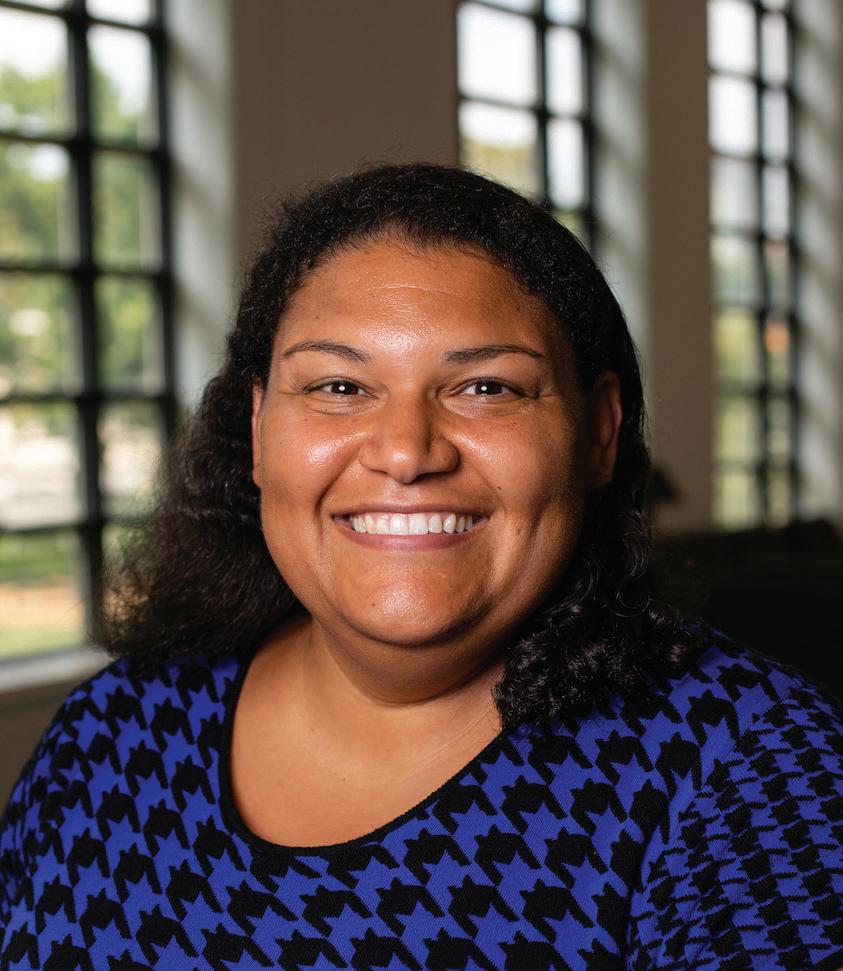
In addition to these programs, the university has recently introduced new mental health apps to better support students’ mental health and wellness needs. For example, Kognito is a 45-minute web-based
training simulation to train students, faculty, and staff in recognizing signs of mental health issues, distress, and suicide and on communicating with and referring at-risk students.
“Our hope with these apps is that we put mental health resources, quite literally, in the palms of students’ hands for them to use them when the need arises,” Williams says. “We understand there are a variety of barriers to accessing mental health resources for our students, and these new partnerships are aimed at decreasing those obstacles and increasing student well-being.”
According to Williams, many people struggle with first identifying and acknowledging that they need help.
“We need more collective acknowledgment that it’s okay to admit that ‘I’m not okay,’” Willams says. “When you get into a car accident, you go to the ER. With mental health, you need to ask for help. People need intervention and support.”
“That is why we are here. Show up and start with us. If we cannot meet their needs for any reason, we will work with our partners.”
Partners include University Health Service at UK HealthCare, Health Corps, Office of the Dean of Students, and many more.
Launched recently is a new partnership with Talkspace, a digital behavioral technology health care company, offering more expansive services to students who cannot afford longer-term therapy solutions.
“Some of our students have greater needs but can’t afford longer-term solutions,” Williams says. “We must be revolutionary for our students during these times, and our partnership with Talkspace shows our commitment to finding affordable solutions and effective solutions.”
“We know that we will not meet every single need, but we are working hard every day to meet more students where they are,” Willams says, “This is a safe space, and everyone is welcome here.”
After engaging with these health and well-being services, UK students on average are showing stronger academic performance, which is part of Student Well-Being’s mission — developing academically successful students through engagement and collaboration while improving overall health behaviors.
Regarding what we all can be doing better for our own well-being and mental health, Williams says: “Figure out what restores you and brings joy to your life. Once you find it, make sure that it’s part of your constant schedule. Make that investment in yourself.”
Access to the student health and well-being services is free for all UK students.
• Student Financial Wellness Center
• Violence Intervention and Prevention Center
• Disability Resource Center

• Campus Recreation
• UK Counseling Center
• Triage, Referral, Assistance, and Crisis Support Hub
• Prevention, Outreach, and Wellness Education Resources
For the 2022 One Day for UK, the university’s annual event for giving opportunities, we raised $21,553 from 107 generous donors who gave to our Student Support Fund. This fund is designed to help our students who are experiencing a financial need or monetary crisis/emergency while enrolled in the college. Interested in giving to CPH? Visit cph.uky.edu/give.


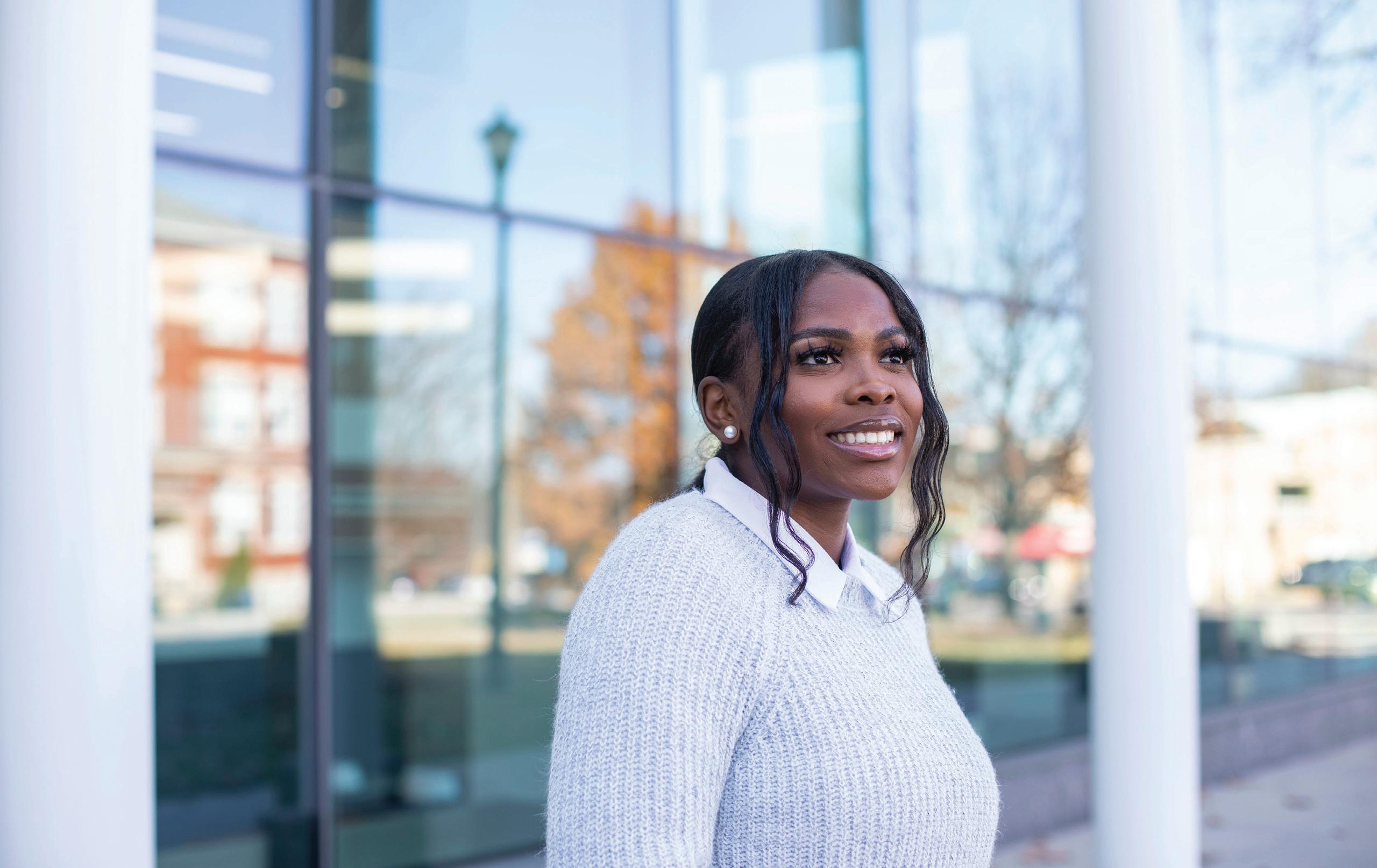
4The University of Kentucky is committed to training health professionals who will advance the well-being of the Commonwealth and beyond. To adhere to this mission, a collaboration among four health care colleges – Medicine, Public Health, Health Sciences, Nursing – has been established to construct an innovative, state-ofthe-art health education building (HEB) slated for 2026/2027. Our shared goal is that when our learners join the workforce, they are well equipped to help Kentuckians and everyone live longer, healthier lives! Interested in following HEB’s progress? Visit provost.uky.edu/HEB.

CPH has 441 active students enrolled in the Fall 2022 semester, with the Bachelor of Public Health representing more than half of our student body. Our different public health programs continue to grow and further demonstrate our students’ continued interest in becoming a future health champion! Interested in learning more about our commitment to student success and available resources?
Visit cph.uky.edu/students.
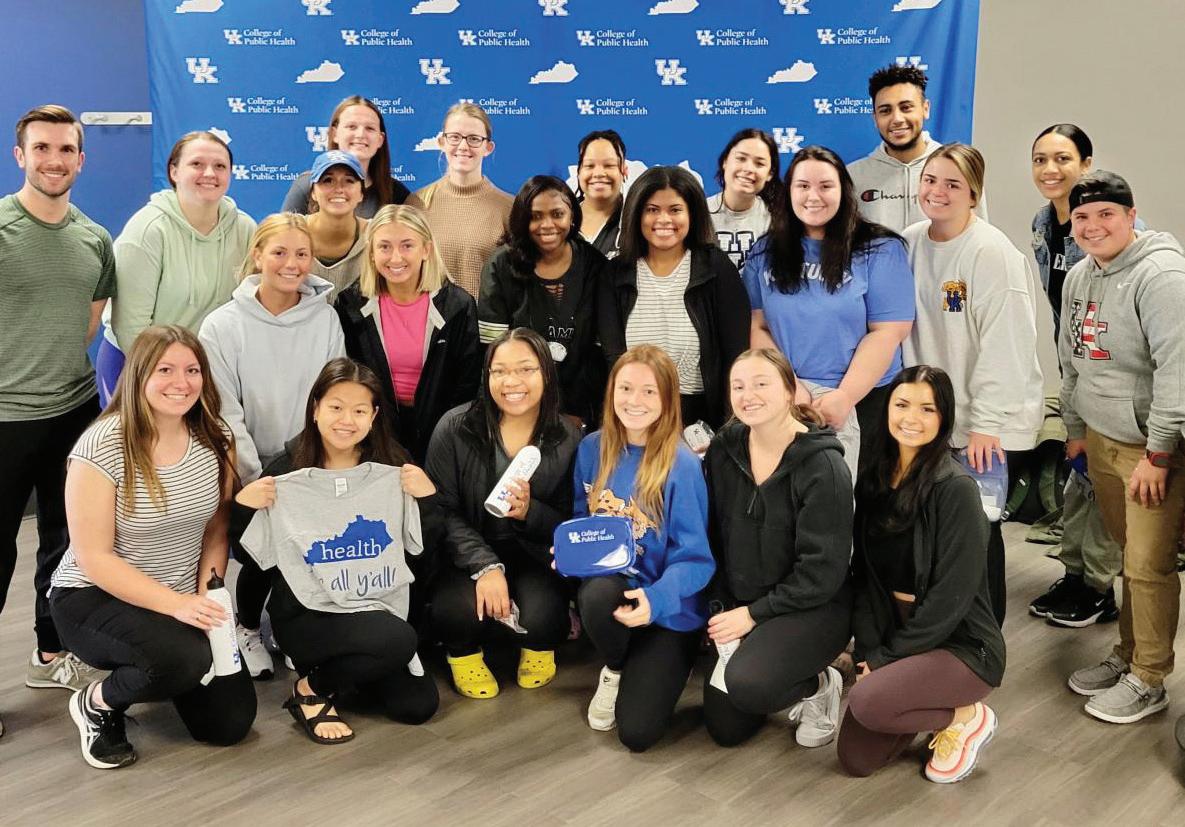


During Fiscal Year 2022, research projects led by our faculty received $19.9 million in funding from federal, state, and private sources to tackle tough issues such as cancer, opioid use disorder, environmental risks, injuries, and health disparities in communities throughout the Commonwealth of Kentucky and across our nation. This research has translated into more than 300 peer review publications and 62 active awards in FY 2022. Learn more at cph.uky.edu/research.
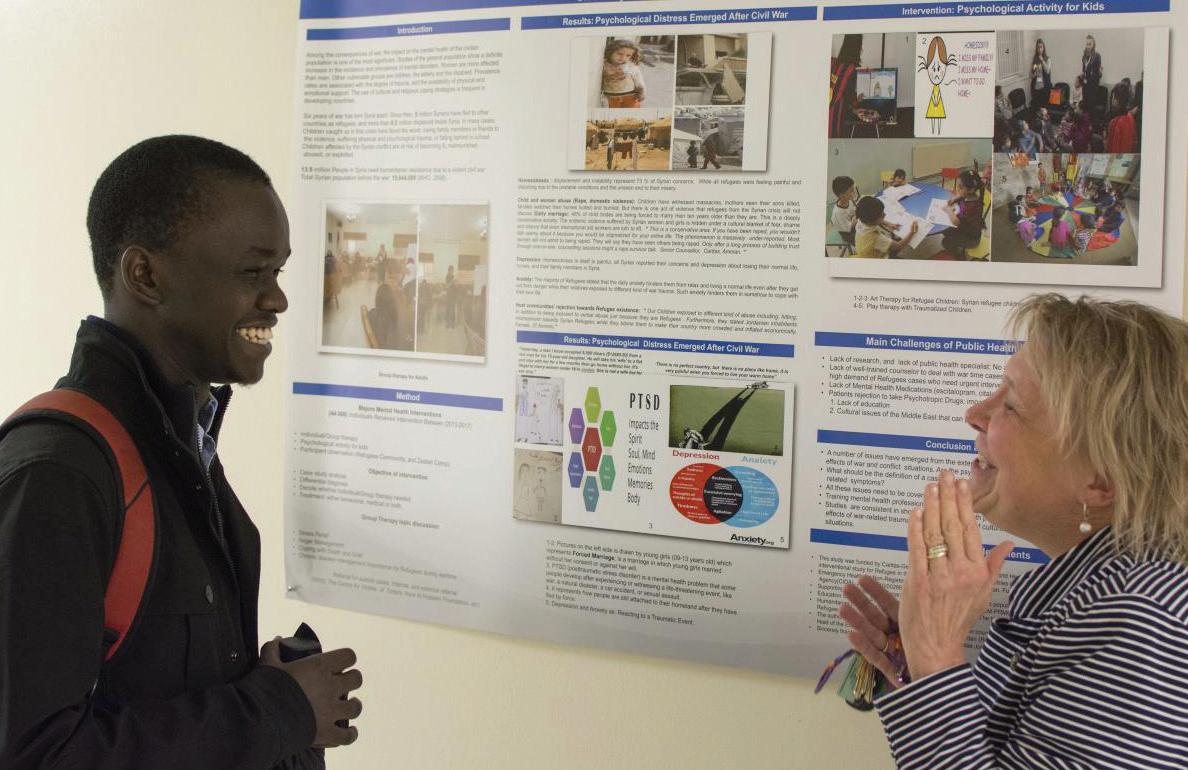
At the Spring 2022 commencement ceremony, CPH graduated 121 future public health champions. Our mission is to develop health champions, conduct multidisciplinary and applied research, and collaborate with partners to improve health in Kentucky and beyond. Our graduates are dedicated to transforming and assisting in the creation of a healthier community, state, and world for everyone. Learn more about UK’s graduation events at commencement.uky.edu.
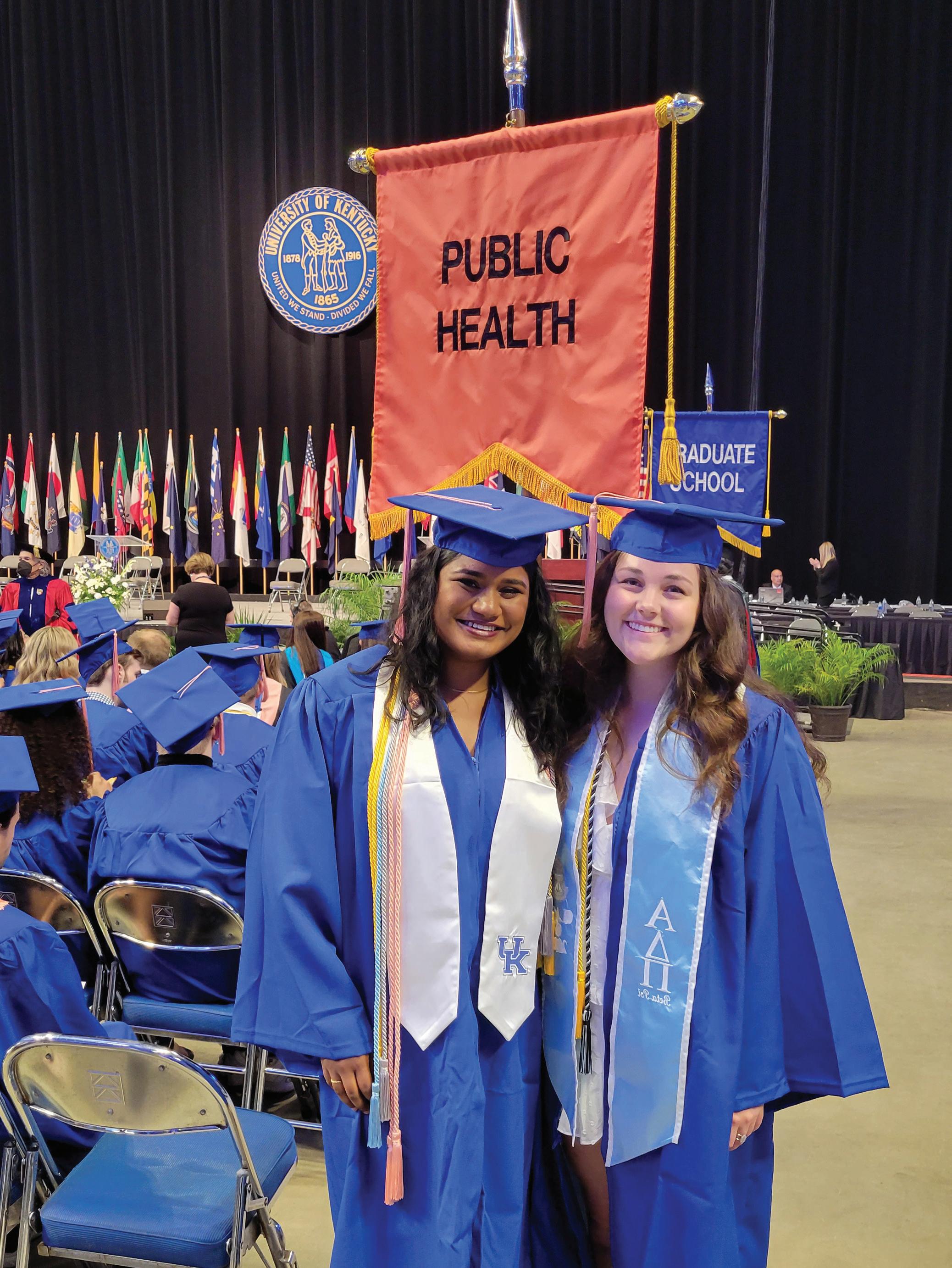

Even from a young age, Kirk Strack (MHA ’96 ) knew he wanted to be in health care. He always thought that he would be a pediatrician, but his journey took a different path.
Strack says he was the kid who went to see the doctor for routine checkups and the visits would last an hour, as he’d ask the doctors so many questions.
“I’ve just always been around healthcare and been kind of drawn to it,” says Strack, who is the assistant chief financial officer for UofL Health. “I cannot think of a time where I didn’t want to be in health care.”
In his current role at UofL Health, Strack works with the chief financial officer to oversee system-level financial operations to include general accounting, reimbursement, and care coordination.
After Strack graduated high school, his father told him if he wanted to pursue a biology degree that he’d have to go to a Kentucky college. Naturally, Strack did the opposite and went to the University of Alabama, where he received a bachelor’s degree in management with concentrations in health care and managerial accounting.
Strack did return to Kentucky for graduate school, though, completing his Master’s of Health Administration (MHA) at the University of Kentucky.
“I chose the MHA route in lieu of an MBA because of my interest in the management side of health care and my educational training in accounting,” he says. “For the record, I never intended on my career being in finance, as I wanted to be on the operations side.”
It was after graduation that Strack landed a position at Ernst & Young that set him on the path he is still traversing, with a stop at Clark Memorial Hospital in Indiana and now UofL Health. To him, it is because he always has been drawn to helping people.
“I think people who go into healthcare, regardless of their specialty, have an amount of compassion and sympathy and empathy for their fellow human beings,” he says. “I tell people all the time, students in particular, that once you get health care in your blood, I couldn’t do anything else. I can’t think of any way that I would have been fulfilled like I am with my 26 years of health care.”
Strack even took a sabbatical in 2017 to see if there was something beyond health care that would pique his interests. He says it was a time to look at other industries and see if he wanted to make a change.
It was during an interview with a consulting firm in New York City that he realized health care was who he was and where he was meant to be. “They were interviewing me as I was wanting
to be a consultant and it struck me like, ‘Oh, yeah, I’m not a consultant anymore. I’m a healthcare guy. I’m a health care finance guy,’” he recalls.
As his career path took him on varying routes that he never expected, he tells students that they too may take numerous paths to get to their ultimate goals, but they should enjoy the ride.
Strack also says networking is one of his biggest lessons learned along his journey.
“It’s how you use your network in mentorship and development that’s key,” he says. “I mean, I still reach out to people I worked with throughout my career. I still have mentors who opened the door for me years ago, and I’ve taken that to heart and I try to open doors for people now.”
While his path took him on a different journey than he expected originally, Strack says he is happy and could not imagine being anywhere else.
“I just can’t envision myself doing anything else honestly,” he says.
UofL Health is a fully integrated regional academic health system with more than 12,000 team members, seven hospitals, four medical centers, 200+ physician practice locations, 700+ providers, Frazier Rehab Institute, Brown Cancer Center, and the Eye Institute.


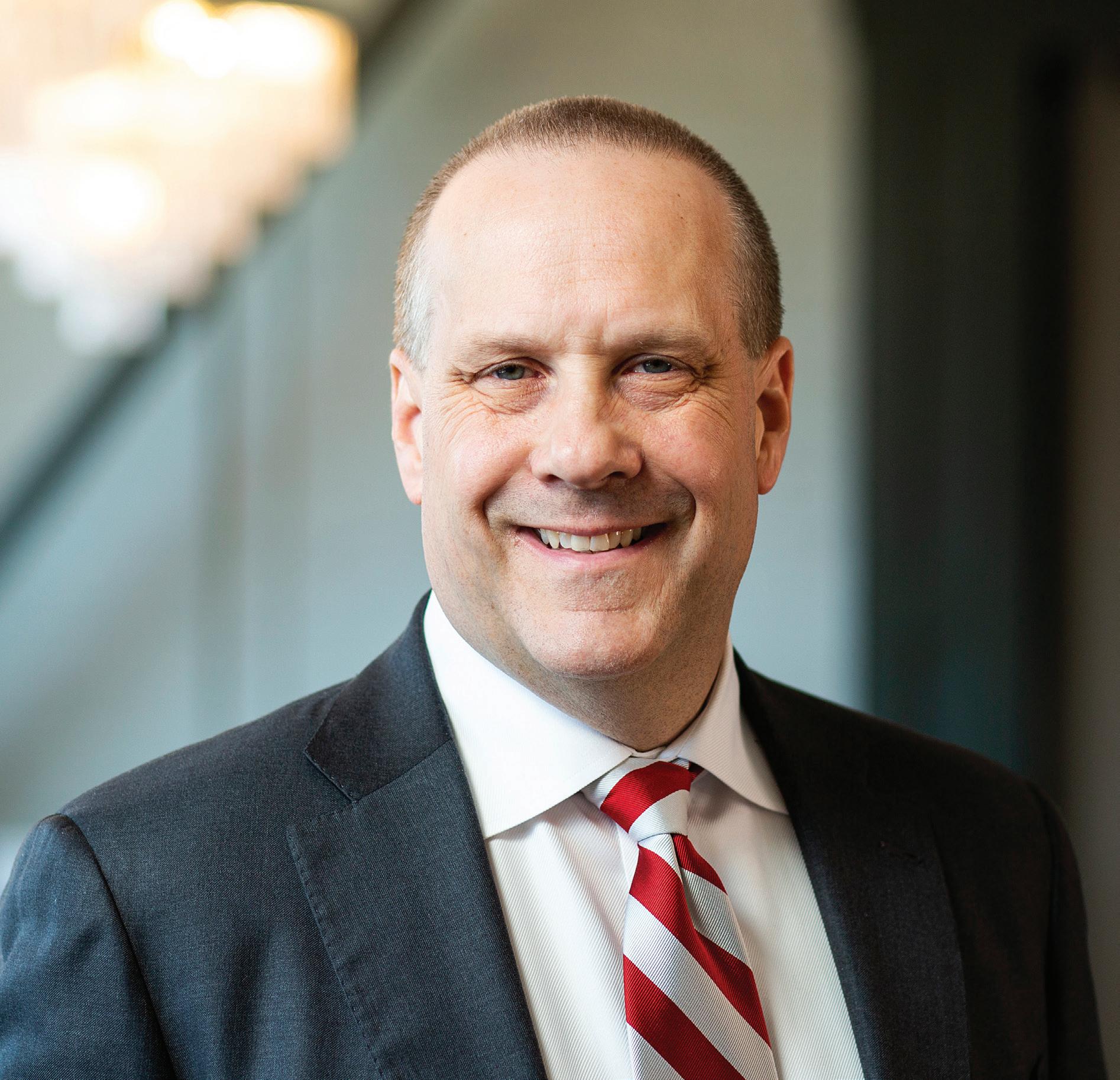

The Kentucky Injury Prevention and Research Center (KIPRC), housed in the University of Kentucky’s College of Public Health (CPH), recently launched a new resource for people with substance use disorder (SUD), FindRecoveryHousingNowKY.org. It’s a free, searchable website that generates an individualized list of Kentucky recovery houses with immediate openings.
Kentucky Gov. Andy Beshear joined other state and community leaders and KIPRC representatives on Sept. 28, 2022, to officially announce the launch of the website.
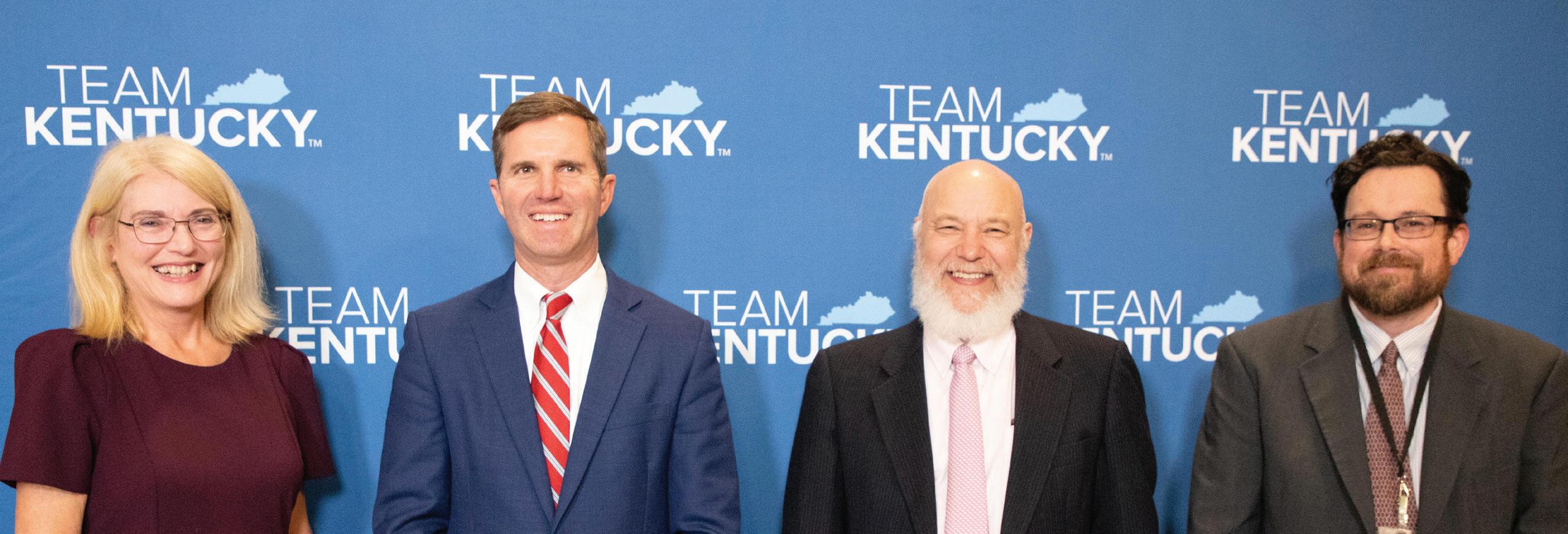
“Our job is to provide help, hope, and a hand to lead people out of the darkness of addiction and into the light—of acceptance, opportunity, and community,” Gov. Beshear says. “Recovery housing is an integral part of this process. This website will allow those on their journey to recovery to access valuable resources faster than ever before.”
People who visit the site can confidentially locate safe, affordable recovery housing openings based on their needs and personal situation. Users can narrow their search by location, rent amount, amenities, services, residence requirements, transportation options, and more.
FindRecoveryHousingNowKY.org is
an unparalleled digital resource for SUD treatment facilities, parole and probation officers, people who have completed inpatient SUD treatment or are re-entering the community after incarceration, as well as the general public.
“For many individuals, this website will play a critical role in their recovery journey,” says Terry Bunn, Ph.D., director of KIPRC and professor of epidemiology and environmental health for CPH. “Now, people will easily have the information they need to contact recovery houses with openings. Entry into a recovery home with associated services helps to build recovery capital necessary to achieve and maintain long-term recovery from SUD.”
FindRecoveryHousingNowKY.org is modeled after FindHelpNowKY.org, which was also developed by KIPRC. FindHelpNowKY.org is an online search engine that generates individualized lists of SUD treatment centers with current availability.
FindRecoveryHousingNowKY.org is the next step in the continuum of care that helps people find suitable housing to sustain their recovery once they have initiated SUD treatment. The search engine offers benefits for housing managers in addition to those
seeking SUD recovery. The Recovery Management System, or RMS, allows recovery house owners and operators to track bed usage, resident information (including successes), and additional house operations. The system tracks information related to residents from their arrival at the home until departure. The RMS will be an ever-evolving system, based upon the needs of the recovery house owners, operators, and, most importantly, their residents.
The Certification Module is another tool for recovery house operators. It will allow recovery house owners to use FindRecoveryHousingNowKY. org to apply for National Alliance for Recovery Residences (NARR) certification through the Kentucky Recovery Housing Network, Kentucky’s NARR state affiliate.
The original process included sending large amounts of documentation back and forth through the mail; the certification module allows for electronic document submission that makes the process much easier and faster for everyone involved.
FindRecoveryHousingNowKY.org is funded by the Centers for Disease Control and Prevention (CDC) and produced by KIPRC, the bona fide agent of the Kentucky Department for Public Health.
In addition to being the result of a dynamic collaboration between the CDC and KIPRC, FindRecoveryHousingNowKY.org wouldn’t be possible without the following contributing partners: the Kentucky Cabinet for Health and Family Services, the Kentucky Recovery Housing Network, Get Help, and the Fletcher Group.

According to the Centers for Disease Control and Prevention (CDC), approximately 60,000 children per year—or about four busloads per day—are seen at U.S. emergency departments because they ingested medicine that they shouldn’t have.
Medication lock boxes and bags are helpful for keeping harmful medication away from the hands of those for whom the medication was not prescribed. KIPRC works with two programs to disseminate medication lock boxes and bags to organizations and medical professionals throughout the state.
KIPRC’s Kentucky Safety and Prevention Alignment Network (KSPAN) Child Home Safety Committee, in partnership with the Kentucky Violence and Injury Prevention Program, Prevent Child Abuse Kentucky, and the Kentucky Justice and Public Safety Cabinet’s Office of Drug Control Policy, provides medication lock boxes to local entities such as elementary schools, hospital emergency rooms, public libraries, and medically assisted drug treatment providers, who then
distribute them to households with children.
Organizations are encouraged to give the boxes to families they know or suspect have children and dangerous drugs—licit or illicit—in the home. Each lock box contains a home safety checklist from Prevent Child Abuse Kentucky and Face It’s CONNECT to Build Family Resilience brochure, which offers tips for building family resilience.
A second program, developed through a partnership between the University of Kentucky’s Division of Pediatric Forensic Medicine (DPFM) and KIPRC, offers medication lock bags along with training to medical providers, therapists/counselors, case managers, nurses, and others who have contact with caregivers of children at risk of accidental medication ingestion.
As accidental ingestions outpaced pediatric abusive head trauma as a leading cause of child death or near death in Kentucky, Christina Howard, M.D. FAAP, chief of DPFM, and Tonya Jernigan, a social worker with the division, saw the potential for helping prevent future ingestions—by training and outfitting medical professionals who work with at-risk families.
“We are consulted on cases in which providers think that there’s some kind of child maltreatment, and we also frequently get called in if kiddos have had some kind of ingestion,” says Jernigan. “We really like to use the information and the knowledge that we have to inform prevention efforts. So, a piece of what we do in pediatric
forensic medicine is talk about childhood safety in general, whether that be issues of medication ingestion or if that’s firearm safety in the home or talking to families about bike helmets.”
Jernigan and Howard developed a continuing education training module for medical professionals on recognizing instances where caregivers might be putting children at risk through unsafe medication storage practices and discussing safe medication storage with those caregivers. Providers who complete the training are then given medication lock bags to pass on to caregivers.
“We’re training providers so they feel super comfortable and understand the importance of having this conversation with patients,” Jernigan says.
To access the training, visit the CECentral website: https://www. cecentral.com/node/1784.

For more information on the KSPAN lock box program, contact Steve Sparrow at steve.sparrow@uky.edu.
KIPRC, established in 1994, is a unique partnership between the Kentucky Department for Public Health (KDPH) and the University of Kentucky College of Public Health. KIPRC serves both as an academic injury prevention research center and as the KDPH’s designee or “bona fide agent” for statewide injury prevention and control, focusing on injury prevention translation and practice.
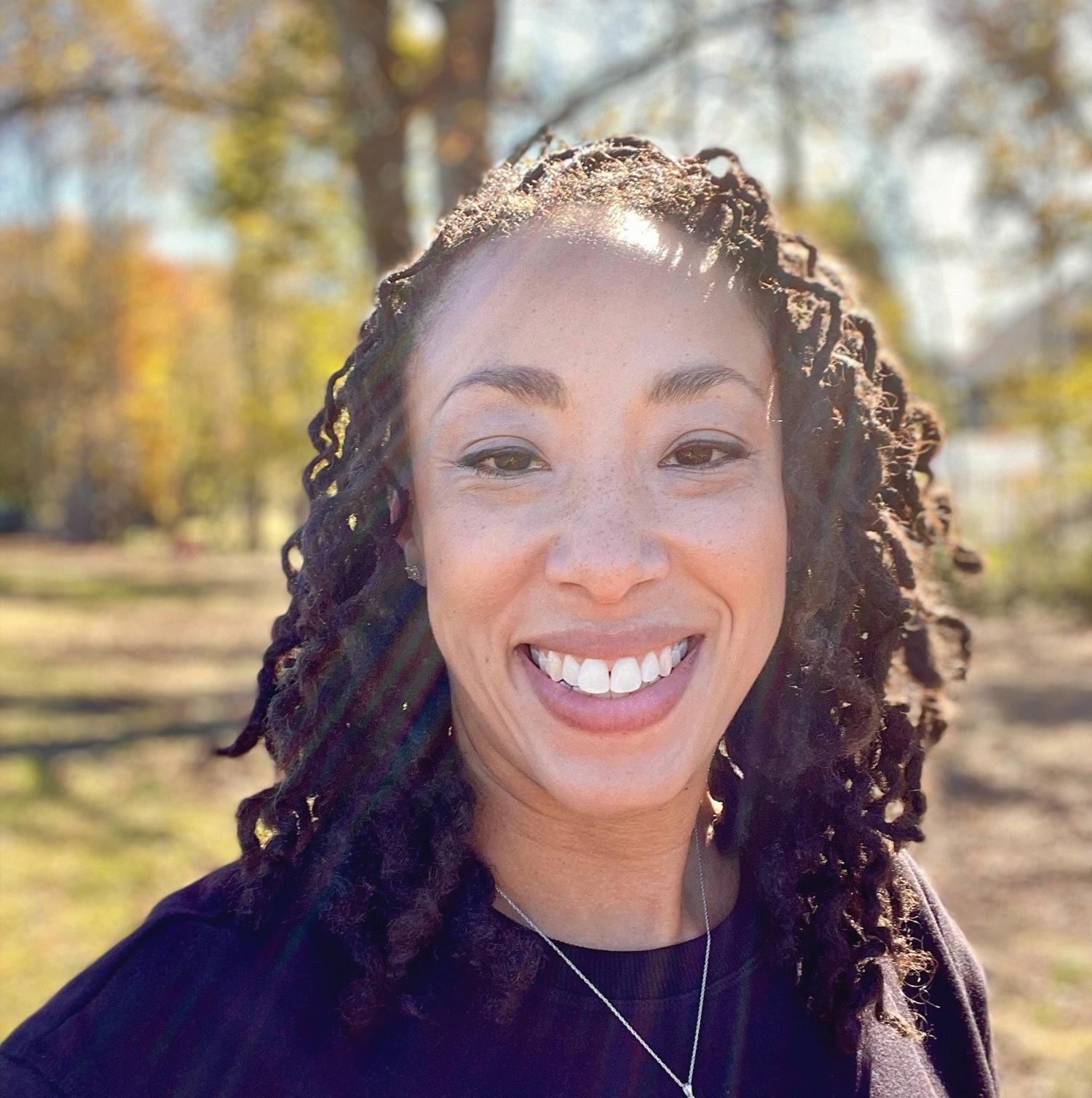

“ “
when Kia Bryant (MPH’ 08) decided to attend the University of Kentucky’s College of Public Health (CPH) for her Master’s, one of the biggest draws was receiving the Lyman T. Johnson Fellowship, which provides a generous stipend as well as a full scholarship. Now, she is being honored as the college’s alumni recipient of the Lyman T. Johnson Torch of Excellence Award.
“Lyman T. Johnson was a trailblazer. Not only was he a scholar and educator, but he also fought to receive the same education as his white peers,” says Bryant. “He fought for equality, which is something that really strikes a chord in public health. It is a privilege to represent him and what he meant to the University of Kentucky.”
The Torch of Excellence Award recognizes one African American alum from each of the university’s academic colleges whose faith, hard work, and determination have positively affected the lives of people on UK’s campus, the city, nation, or beyond.
“It’s such an honor to be nominated for this award. We all work hard to make a difference with the work we do, and it always feels great for others to recognize that work and passion,” adds Bryant on being nominated.
Bryant has always been interested in health, science, and math. While the CPH alumna originally thought about going into medicine, she began to dig deeper into health equity, nutrition, and epidemiology as a whole and was fascinated.
After graduating with a B.A. in chemistry and Africana studies from Wittenberg University, Bryant participated in AmeriCorps VISTA for a
year before embarking on her master’s degree. She says she worked mostly in literacy and nutrition education, which sparked even more interest in the field of public health.
While the fellowship played a key role in her decision to attend UK’s College of Public Health, Bryant’s visit to the campus felt different from her other visits.
She said the college was welcoming and the staff and students she met were friendly and helpful. However, it was when current students told her about the caring professors, the opportunities for publication and research, and how Bryant wouldn’t be just a face in an auditorium that the deal was sealed.
“This spoke to me, as I was coming from a small undergraduate university,” Bryant recalls.
Bryant came to CPH with the goal of becoming an epidemiologist and public health practitioner, and as she took more courses, she knew she had made the right decision.
Through her coursework and her experience, Bryant said the College of Public Health taught her how to analyze and clean data, how clinical trials worked, and how to use SAS—all of which she still uses in her current position. Through her capstone project, she collected and analyzed data, presented, and defended her findings, and had her first manuscripts published.
“CPH was my first formal introduction to public health, and I gained the knowledge I needed for every role I have had since graduation,” says Bryant. “I met professors that taught me to think critically and trained me in epidemiology and biostatistics. I
was supported and challenged by my professors and mentors.”
Upon receiving her MPH, Bryant participated in the Public Health Prevention Service Fellowship, a three-year fellowship program that involves two six-month positions at the Centers for Disease Control and Prevention (CDC) and one two-year position at a state or local health department. She completed her CDC rotations in Public Health Informatics and the Agency for Toxic Substances and Disease Registry before serving her two-year position with the North Carolina Tuberculosis Control program.
After completing the program, Bryant took a position with the CDC as a public health advisor assigned to the Georgia Immunization Program. In this position, she learned more about program management and CDC requirements for state programs. Bryant then joined the Clinical Research Branch within the CDC’s Division of Tuberculosis Elimination as an epidemiologist. Still with this branch, she now serves as the data management and implementation team lead.
During her time in the Clinical Research Branch, Bryant participated in the implementation of the TBTC Study 31/ ACTG A5349 statistical analysis plan and data analysis. The landmark study led to the identification of the first successful short-course treatment regimen for drug-susceptible tuberculosis in almost 40 years.
“I love working with data, so my current work is the best of both worlds for me,” she says. “Our studies have short timelines relative to other public health programs, and at the end of the study, we know if our hypothesis was true or false. It is rewarding to be a part of something from the start to the end.”

Originally from Ghana, first-generation student Princess Magor Agbozo is the recipient of the 2022 Lyman T. Johnson Torch Bearer Award on behalf of the University of Kentucky College of Public Health (CPH).
Named after the civil rights pioneer and first African American student to attend the University of Kentucky (in 1949), the Lyman T. Johnson Awards are given to African American members of the University of Kentucky (UK) community whose faith, hard work, and determination has positively impacted the lives of people on campus, the city, state, or nation.
Princess recalls walking by the Lyman T. Johnson portrait in Johnson Hall on UK’s campus as a resident and wanting to learn more about his legacy.
“Lyman T. Johnson gave me the opportunity to be here today,” Princess says. “We need to continue to uplift the voices and recognize people like us. I’m incredibly grateful to see recognition, like this, for people of color.”
When asked what this recognition means, Princess said that the first thing she thought of was being a true “health champion.”
“I never heard the term ‘health champion’ until I came here to the College of Public Health,” Princess says. “This recognition and award inspire me to go above and beyond. There’s more work to be done in public health, and I want to continue to do my part in educating and helping my friends, family, and community.”
Upon arriving in Lexington to attend UK, Princess had to learn about a completely different country and culture. She credits the International Center on campus for helping her get acclimated to a new environment and community.
“They actually came to pick me up at the airport and showed me around Lexington,” Princess says. “This showed me that UK is more than just a school, it’s about family. I consider UK to be my second home now.”
Princess recognizes she wouldn’t be here without her two biggest influences: her parents, who both live abroad in Ghana and Qatar.
“My parents never had the opportunity to get a full college education, like me,” Princess says. “They were willing to make sacrifices to give me the support and help that I needed to be successful at UK. They taught me to make sure that my voice is heard and that I am not hiding behind the shadows.”
Even though her parents didn’t have the opportunity to get their college education, Princess knew that coming to Kentucky was more about than just getting a degree.
“My parents are proud that I’m on track for getting my degree, but they are prouder to see the effort that I put in to help and serve others,” Princess says. “I’ve always carried this inside me, what it means to help others, and I am thankful to my parents for teaching and modelling this to me from an early age.”
Princess, currently in her junior year at the University of Kentucky, feels that she has grown over the past few years as a student.
Currently serving as a resident assistant, a rising leader in the Lewis Honors College, an international and CPH ambassador, and director of multicultural affairs for the Student Activities Board, Princess continues to serve others and especially those with diverse backgrounds.
Princess is also a SPARK (Students Participating as Ambassadors for Research in Kentucky) scholar and is currently conducting research on health
equity based on the childbearing experiences of Black mothers in Kentucky.
Her goal is to identify and understand consistent themes surrounding the experiences of Black women during maternity and to recognize common implicit biases believed by health care workers about Black women. Princess wants to find the best methods of care, preferred and requested, to better Black mothers’ overall childbearing experiences.
“I’ve learned that public health is more than just advocacy, it’s about action,” Princess says. “There’s more to learn, and I’m extremely excited for the future. I want to continue to support people, educating myself and others, and continue to keep each other healthy.”
Princess intends to apply for the Plus One program this year at CPH and pursue her Master of Public Health (MPH) degree. Afterwards, she is planning to apply to medical school.
Professionally, Princess wants to work in global health and improve health care accessibility for impoverished and underserved communities.
“Growing up in Ghana, I experienced first-hand family members that were ill and not getting the appropriate health care,” Princess says. “This is what originally boosted my passion for public health. In my career, I want to make sure that everyone has equal access to quality health care.”
Going forward, Princess plans to continue to speak her mind, voice her opinions, challenge the system, speak up for those who can’t speak for themselves, and be resourceful to others who need help.
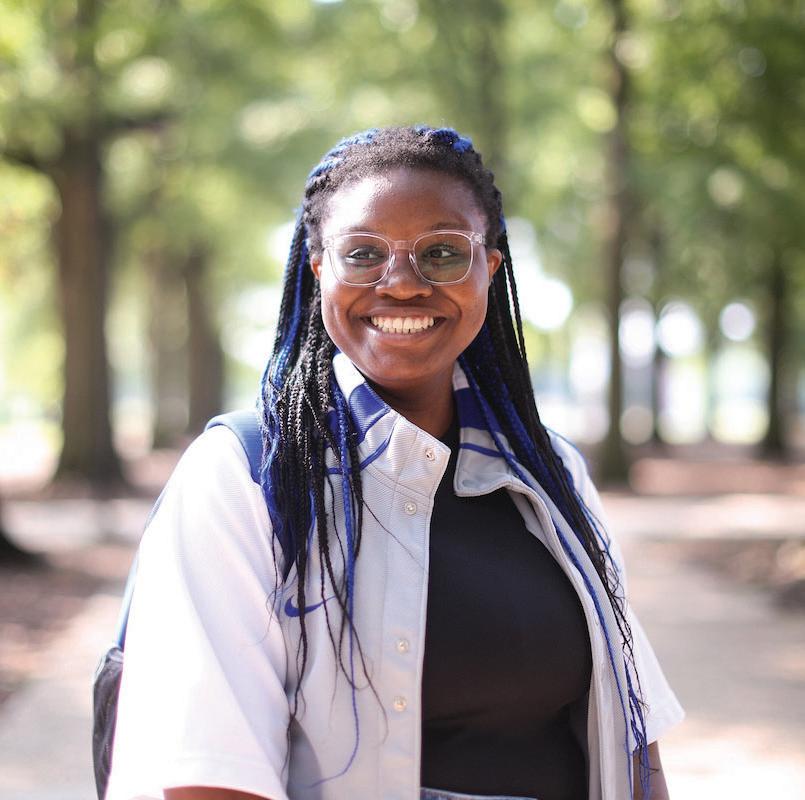

“This recognition and award inspire me to go above and beyond. There’s more work to be done in public health and I want to continue to do my part in educating and helping my friends, family, and my community.”
- Princess Magor Agbozo
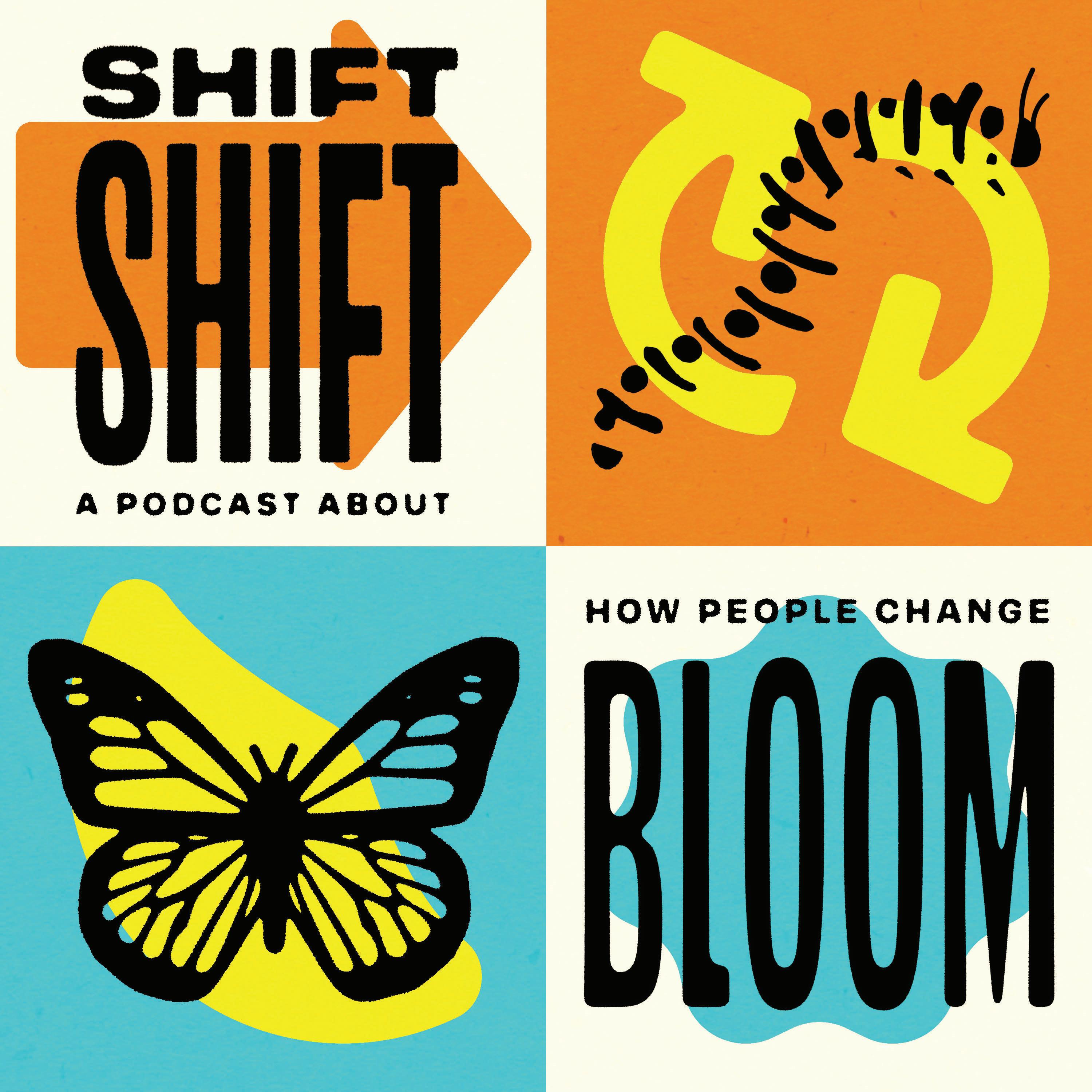 By Diamond Darling
By Diamond Darling
The Center for Innovation in Population Health (IPH Center), housed in the University of Kentucky’s College of Public Health, helps people by using the Transformational Collaborative Outcomes Management (TCOM) framework. TCOM is a person-centered approach for managing care in human serving systems (i.e., health care, child welfare, mental health, education, etc.).
Public health’s goal is to prevent disease, promote health, and prolong life for everyone. This goal can only be met by utilizing change and transformation in the public health space.
At the start of transformation in care, the IPH Center believes that the transformation process begins with a person’s story. By creating and communicating a collaboratively developed vision of the person’s story, TCOM offers a strategy that ensures that the people served are treated as partners in all decisions made.
With this approach in mind, the IPH Center ventured into a new creative project to attempt to understand how people change – collecting stories from people with different experiences to understand how they have changed and explore their personal change processes.
In 2022, the IPH Center created the podcast Shift, Shift…Bloom! The podcast examines how people change, why they change, and how they sustain the changes that are most important to them in their everyday lives.
The 10-episode first season featured guests who place themselves in one of three categories: change makers, change embracers, or resistors of change. “Compelling guests from across the world share their personal stories of change, and the ensuing interviews have been enlightening,” says Kristen Cerelli, host of Shift, Shift…Bloom!
Many of the individuals featured in the podcast illuminate the goal of public health: to change the world and leave it better for the next generation.
For example, one episode features Rachel Faller, who created a zero waste, fair trade fashion company. Dr. De Lacy Davis, the founder of the organization, Black Cops Against Police Brutality, joins another episode to tell how he makes transformation in his community and around the world through advocacy and education. Another episode features Juliana Barton, a child abuse survivor and foster care alum who now speaks about the child welfare system and acts as a government liaison.
The Shift, Shift…Bloom! Podcast episodes explore the importance of mindset, personality, life circumstances, communities of support, and sources of inspiration in the process of transformation.

In 10 additional “TCOM Takeaway” episodes, Dr. John Lyons, the inaugural director of the IPH Center, contributes his perspective on the impact of that change and how it applied to the TCOM framework.
With Season 1 of Shift, Shift…Bloom! concluded, Season 2 will return in January 2023. The next series will explore the universal changes that are inevitable in most people’s lifetime, with a focus on the strengths used by those individuals to support their transformational change.
Listen to Shift, Shift…Bloom! anywhere you get your podcasts: shiftshiftbloom.com/listen

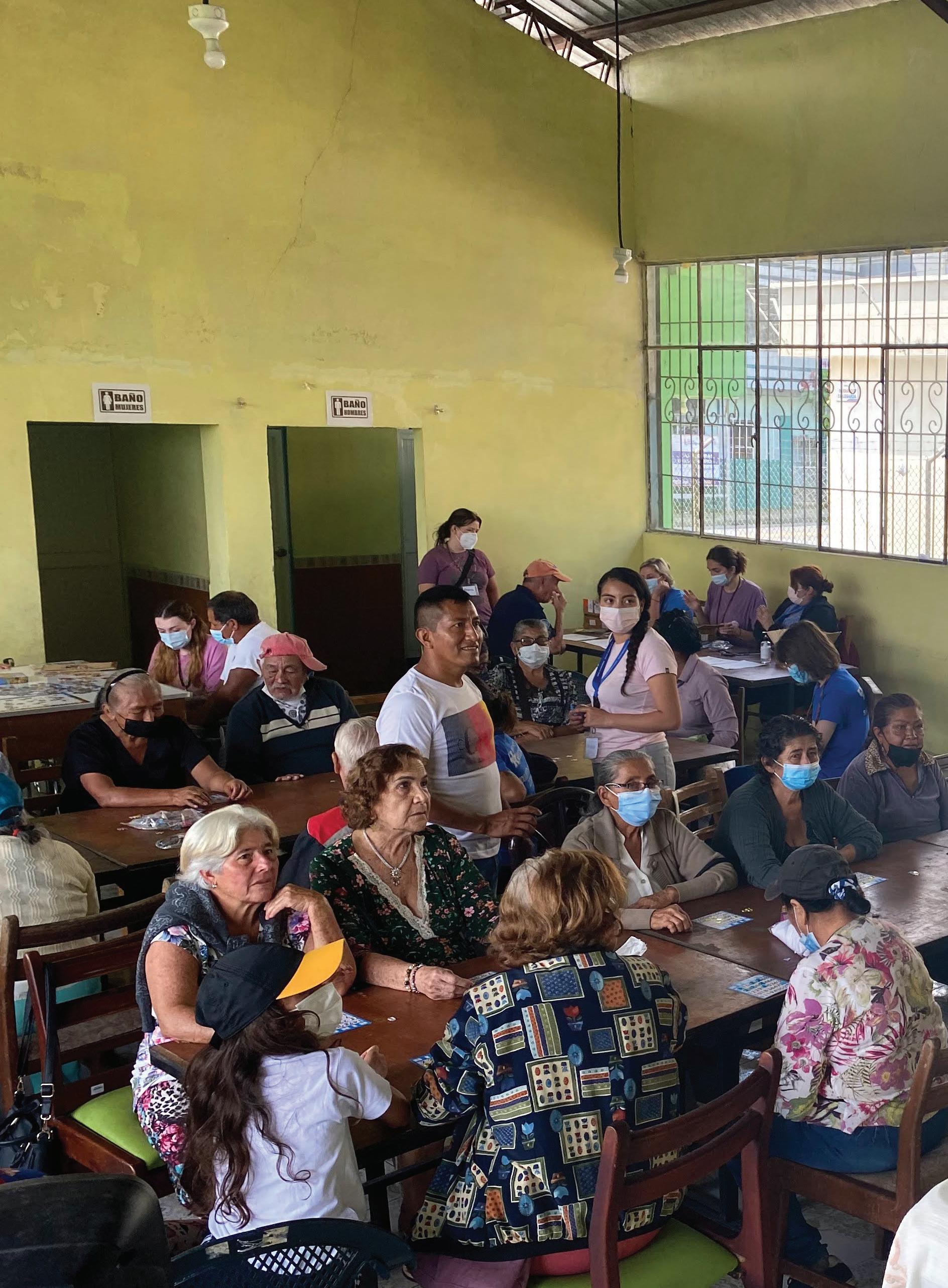 By Grace Colville
By Grace Colville
Because I was able to work with and observe so many professionals, I was also able to grasp the importance of working together and how it influences the health outcomes of an individual and even a population.
In the summer of 2022, six University of Kentucky medical residents traveled to Ecuador for a medical brigade with Dr. Tom Young, current pediatrics professor at UK HealthCare.
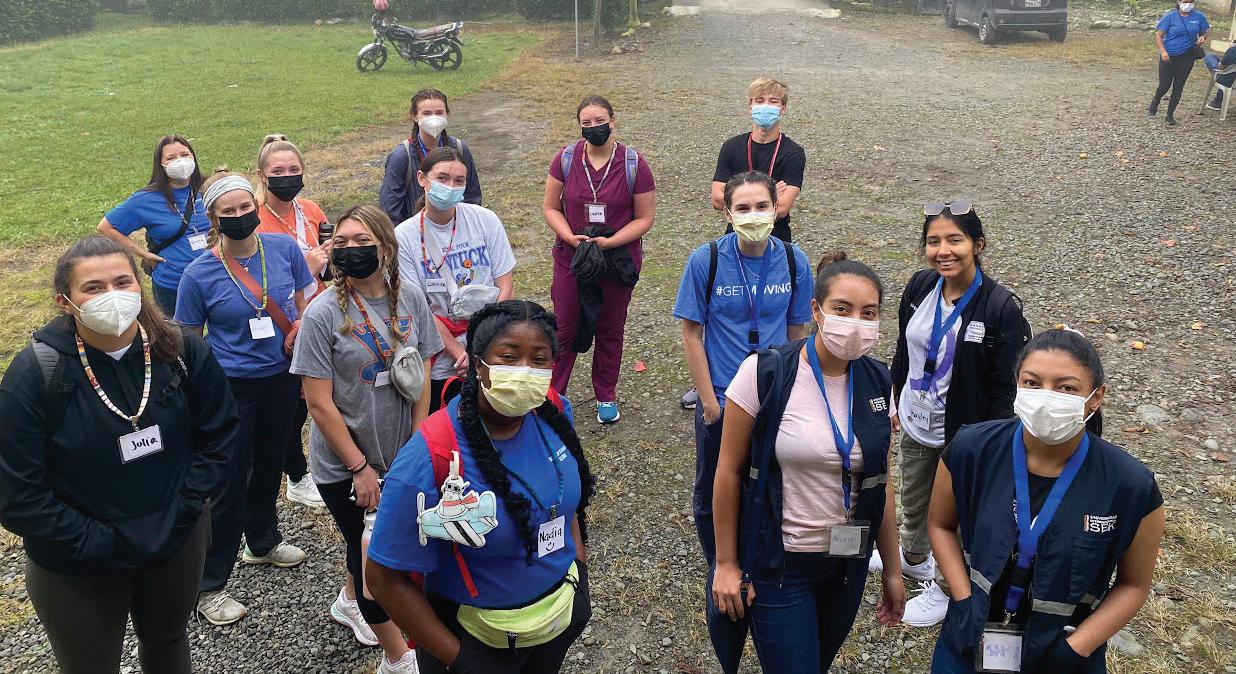
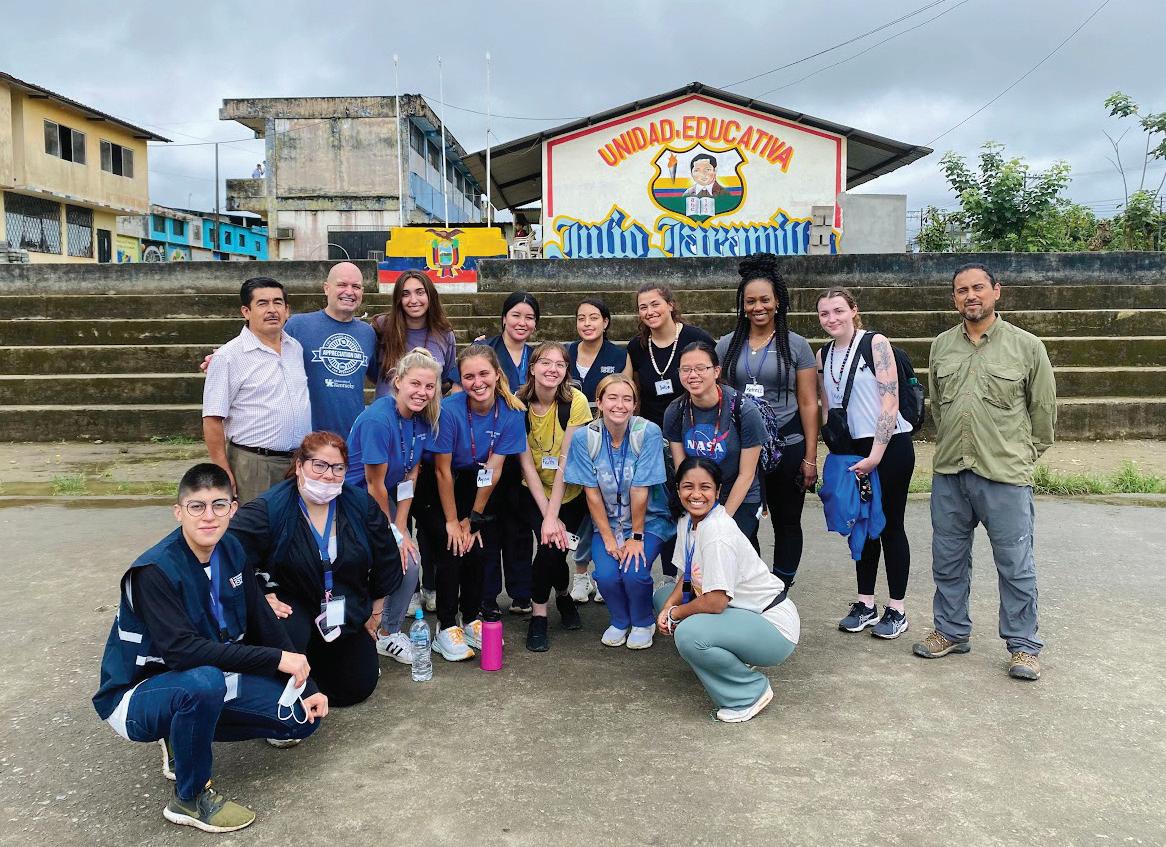
Upon its return, the small group shared their experiences with their peers and interest in global health brigades rose. Just four years later, that group of six had turned into 30, and Shoulder to Shoulder Global (STSG) was born.
Shoulder to Shoulder Global (STSG) is a University of Kentucky Global Health Initiatives organization housed in the UK International Center that gives students, faculty, staff, and community members the opportunities to help improve the health and well-being of an underserved community in Santo Domingo, Ecuador.
- CPH Student Katie WittmanOver 40,000 patients from resource-poor communities have attended one of UK’s interprofessional health brigades in Ecuador to receive health care they may not have otherwise had access to.
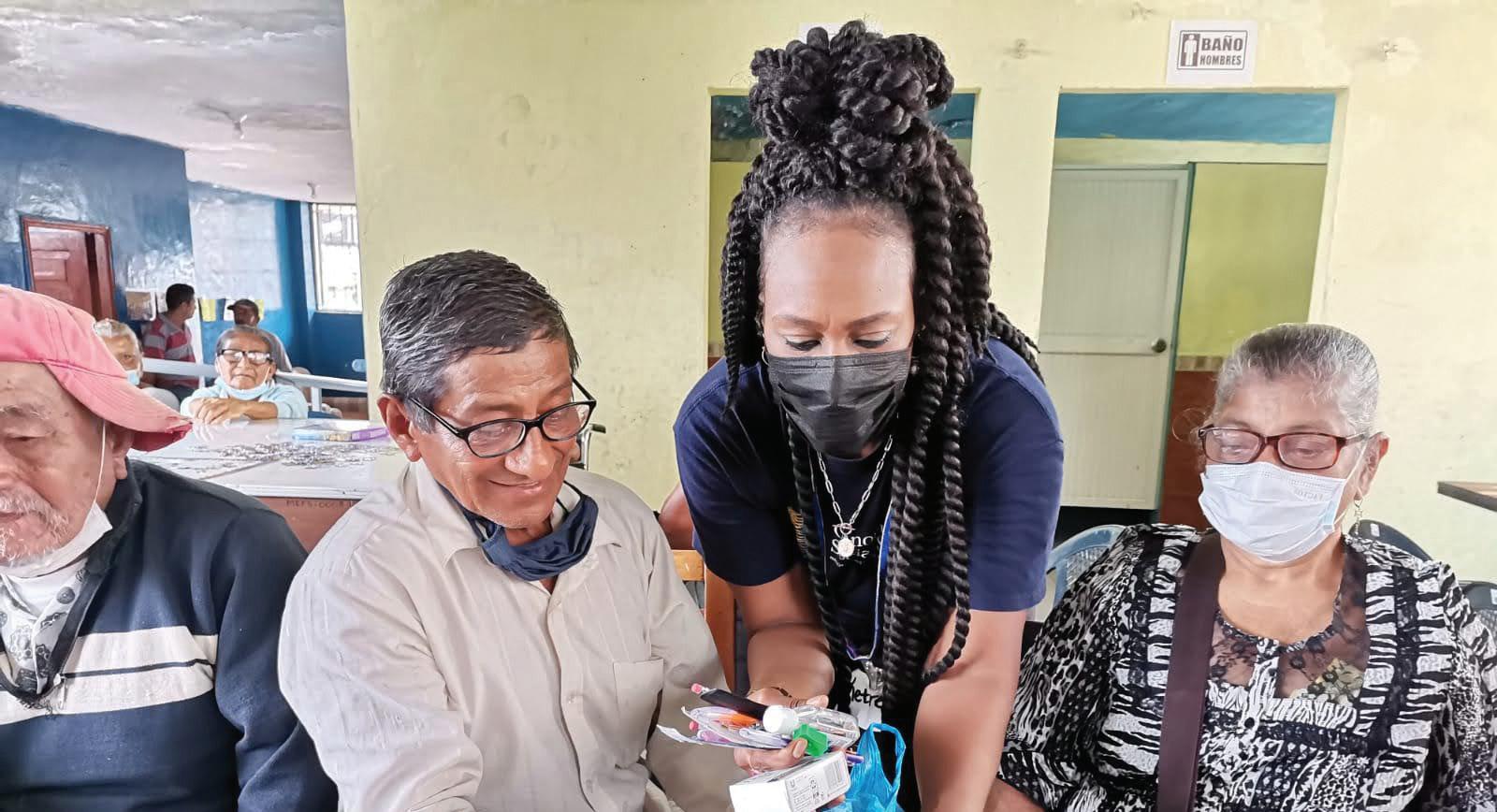
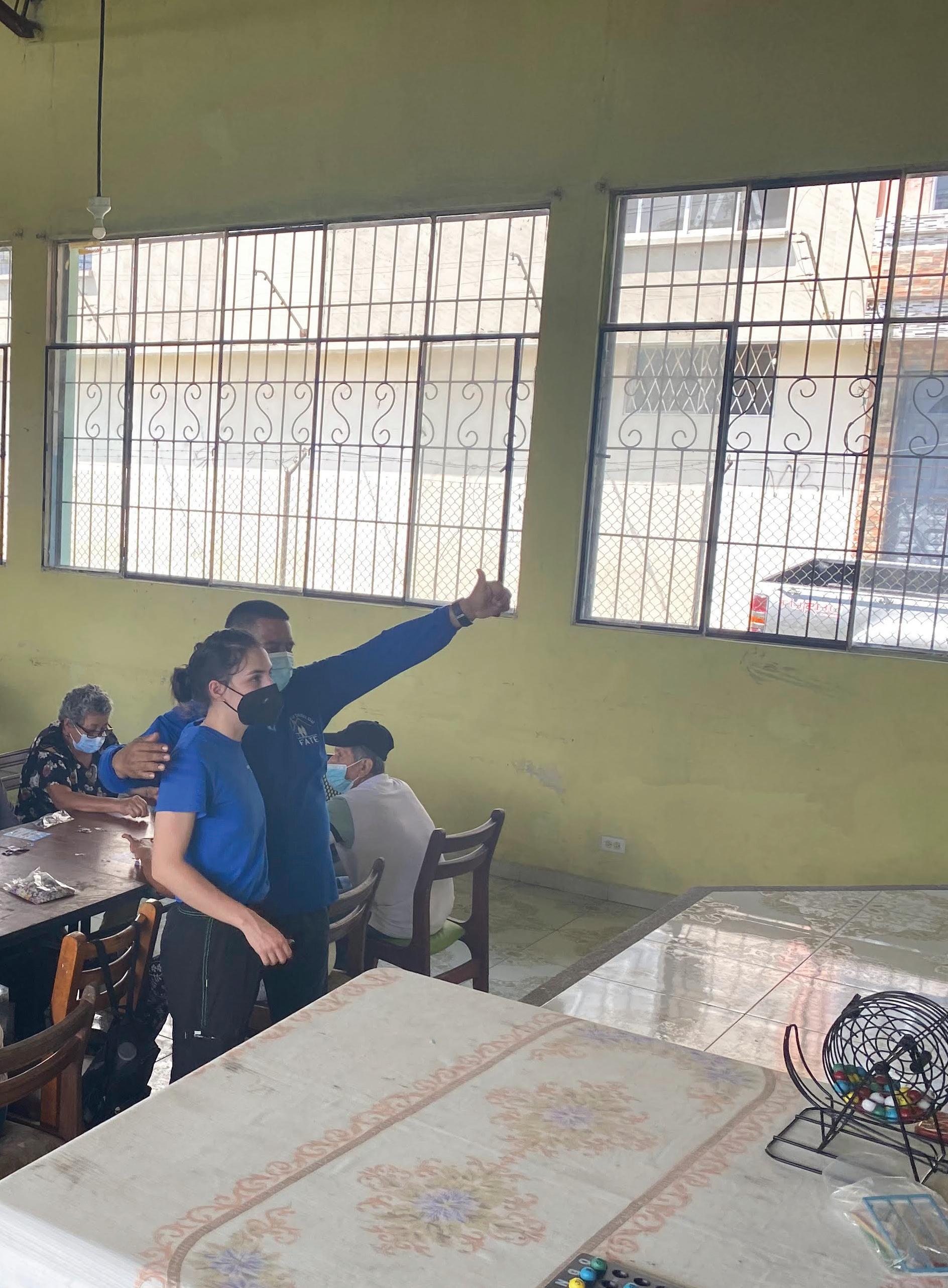
STSG offers both in-person and virtual options to participate and has four brigades for students to join. Full-time students can even receive class credit for their work. The program offers cultural and service-learning opportunities where students are able to provide communities with basic medical and dental care, health education, school health screenings, women’s health, home visits, and community-based learning.

Virtual brigade students participate in multiple virtual interactive and interprofessional experiences including clinical consults, cultural learning opportunities, and an overview of the Ecuadorian health system.
UK College of Public Health student Katie Wittman attended a brigade for the STSG program in June this past summer after learning about it from a Canvas announcement. As a public health student, Wittman benefitted from the clinical experiences, like scribing for physicians and taking vitals with nurses.
“Because I was able to work with and observe so many professionals, I was also able to grasp the importance of working together and how it influences the health outcomes of an individual and even a population,” says Wittman. Nadia Sesay is a student in the UK College of Communication & Information studying health communication and was excited to attend the brigade.
Nedia Sesay was looking forward to preparing and delivering charlas, or brief presentations, to the students at the local school. She was pleased the brigade experience allowed for
both clinic and charla opportunities. “The talks focused on adolescent interest areas including personal hygiene, reproduction, mental health, and drugs,” says Sesay. “The topics were selected by our partners in Ecuador, so we spoke to the main concerns of young people in that country.”
Dr. Ketrell McWhorter, assistant professor in the Department of Epidemiology and Environmental Health at the UK College of Public Health, has been on two brigades with the STSG program and told the students prior to leaving for the trip that they will leave with more than what they arrive with.
As director of the Graduate Certificate in Global Health, McWhorter’s role on the most recent brigade in June was to oversee the charlas. As a public health professional, she also pushes the students to understand the importance of field experiences.
“Any interaction that our students, particularly at the undergraduate level, can have with a low-income community to serve and see the direct effect their service can have on some of the most grateful recipients yields such a great return, not only personally, but also professionally,” says McWhorter. “Public health is about using empathy to care for the community.”
The STSG program is providing clinical and preventive services in multiple locations in Santo Domingo, Ecuador, which serve as sites for the UK-led brigades. In addition to the services at the Centro de Salud Hombro a Hombro (CSHH), partnerships have been established with the Tsáchilas people, a traditional indigenous group from the Santo Domingo area who live in small, isolated rural communities outside the city limits. The brigades also provide services in Plan de Vivienda, an impoverished community located near the CSHH.
Dr. Heather Bush has been named the new Acting Dean of the University of Kentucky’s College of Public Health (CPH), effective June 15.
Dr. Bush assumed this important leadership role and responsibilities from Dr. Donna K. Arnett, who has served in this capacity since 2016.
The official appointment of Dr. Bush came from University Provost Dr. Robert S. DiPaola, after receiving recommendations from the College and a recommendations committee, as outlined in governing regulation VIII.
“Dr. Bush has exhibited outstanding leadership and accomplishment in administrative and research roles over her career, including nearly 16 years as a faculty member in the College of Public Health,” says Provost DiPaola. “This is a critical position for the College, the University of Kentucky, and the community in the Commonwealth and beyond. I appreciate Dr. Bush’s willingness to serve in this role.”
Dr. Bush brings with her extensive academic and research experiences as a professor and current chair of the Department of Biostatistics at the College of Public Health.
Dr. Bush also serves as the Kate Spade & Company Endowed
Professor at the Center for Research on Violence Against Women and as co-director of the Biostatistics, Epidemiology, and Research Design program at the UK Center for Clinical and Translational Science. She is also a prior recipient of the Dean’s Outstanding Teaching Performance Award, the Golden Apple Award for Outstanding Teaching, and the Provost’s Outstanding Teaching Award.
Previously named a University Research Professor, Dr. Bush’s scholarly work focuses on vulnerable populations, with emphasis on women’s health, the impacts of sexual violence on health, and the prevention of sexual violence. As an investigator, she works to promote the engagement of populations typically underrepresented in research.
Dr. Bush prioritizes collaboration, describing herself as “a team scientist with an overall goal of transforming approaches to scientific inquiry by engaging as an active partner in research teams dedicated to making a difference in the health of populations.”

Dr. Bush has also partnered with investigators at the Kentucky Injury Prevention and Research Center (KIPRC) on bystander-based training to promote harm reduction in college populations and
to develop a novel surveillance system for maternal mortality and morbidity that incorporates injury related to sexual violence, substance use, and mental health.

Dr. Bush is also co-investigator in the HEALing Communities study, the largest grant ever awarded to the University of Kentucky. The goal of this four-year, more than $87 million study is to drastically reduce opioid overdose deaths in Kentucky by providing evidence-based solutions to end long-term addiction in this national crisis.
Prior to her faculty appointment at the College in 2006, Dr. Bush served as a senior biostatistician in industry. She has her Ph.D. and M.S. degrees in statistics from the University of Kentucky along with a B.S. in mathematics from Mount Vernon Nazarene University.
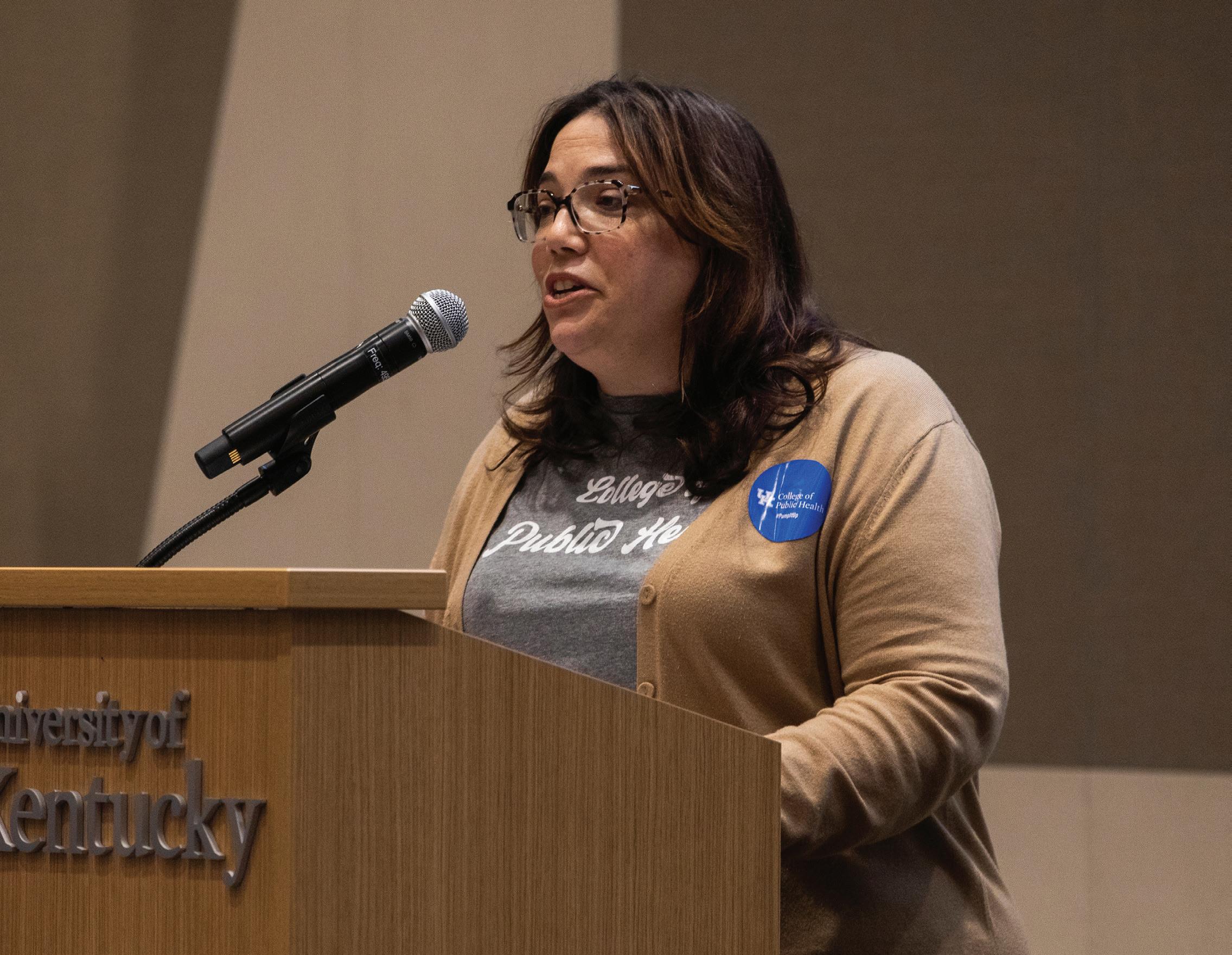
“CPH is my home, my community. It is an honor to serve. I am grateful to Dr. Arnett and the hard work done to make CPH a leader of positive change for population health,” says Dr. Bush. “We are an outstanding and passionate community of faculty, staff, students, alumni, and partners. I am excited to be part of this next phase in the College’s history.”
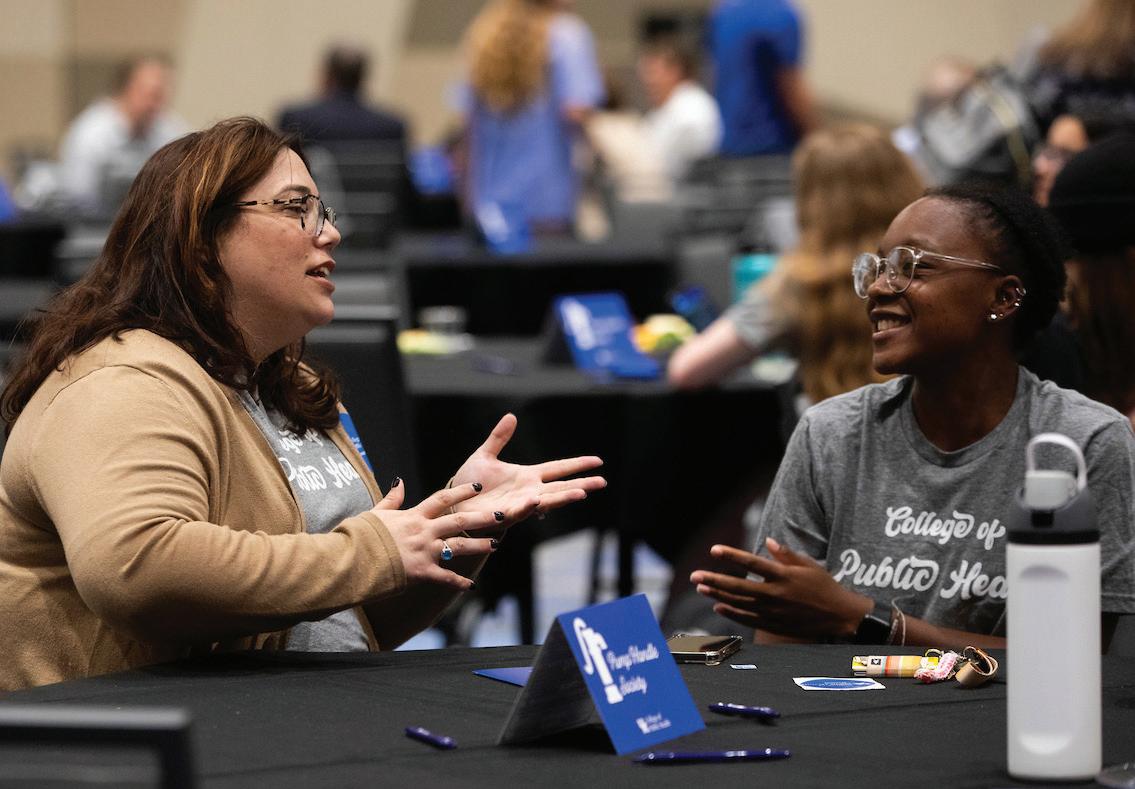
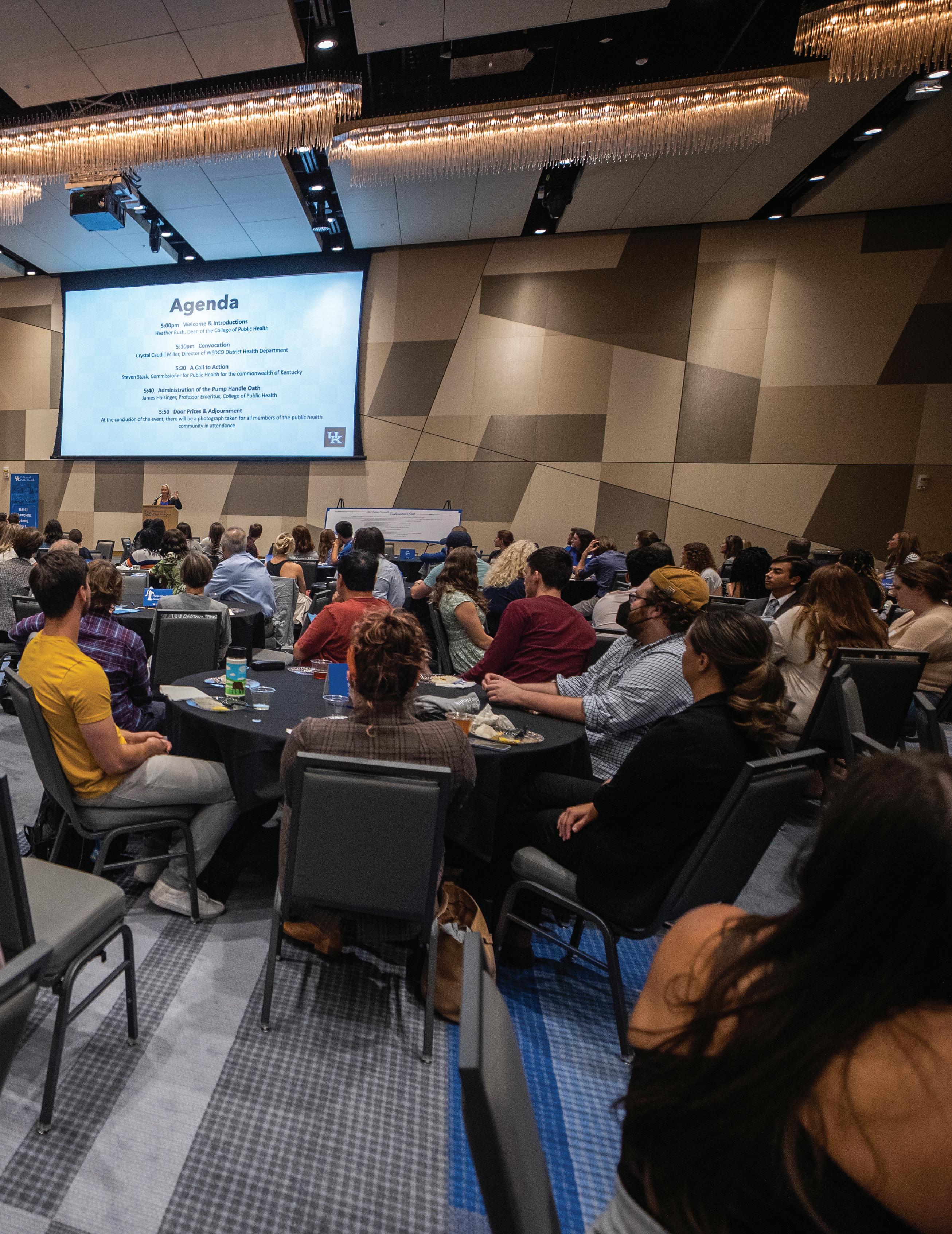
University of Kentucky’s College of Public Health (CPH) appointed Janie Cambron, MPH, RS, as its associate dean for practice and workforce development.
Cambron serves as the CPH’s liaison to the public health practice community, provides services to public health agencies and organizations through specific grants and contracts, and develops and coordinates student experiences in public health practice and teaching.
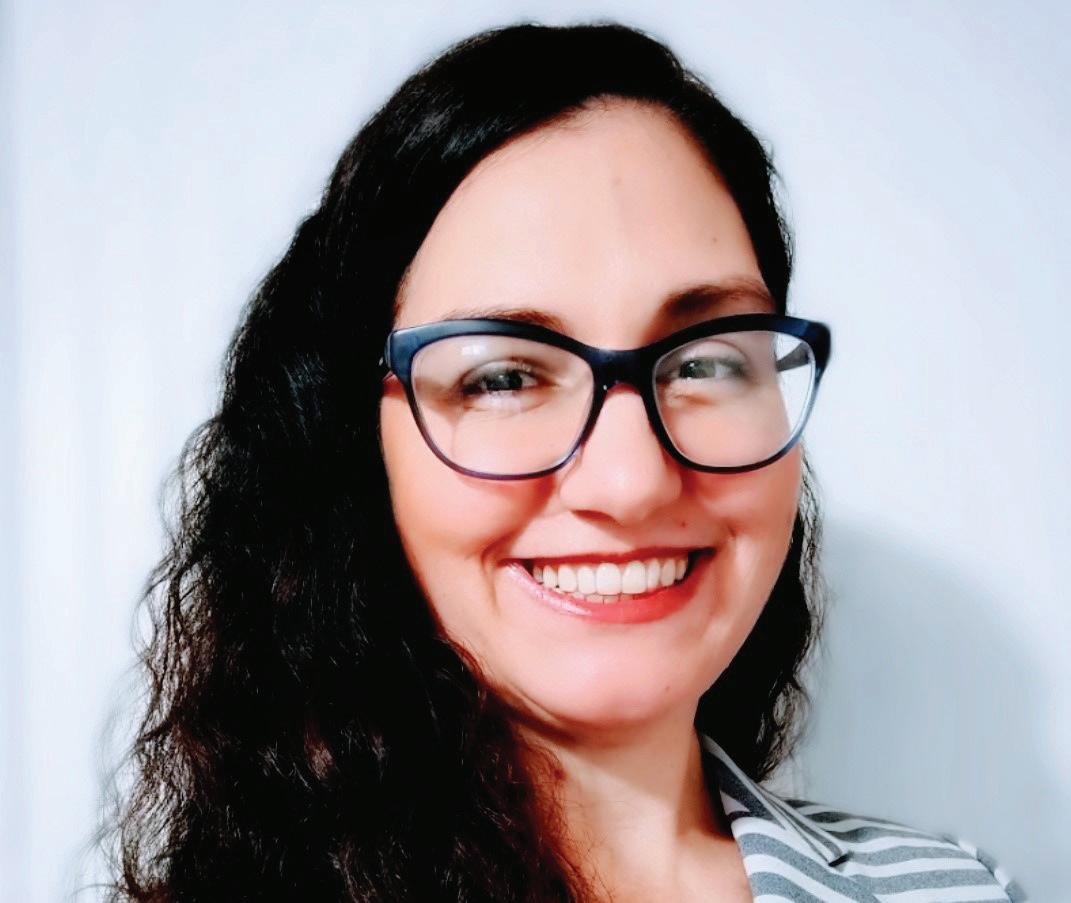
“Students are the heartbeat of our college and I want them to feel that they belong here as well as in the workplace wherever their career path takes them,” Cambron says. “We want to empower students to be champions in the workplace and to apply what they have learned.”
Cambron brings perspectives from both local and state public health departments across many different disciplinary areas of public health.
She brings years of professional experience, including expanding public health partnerships, capacity building, facilitation, assessment and planning, workforce development, accreditation, quality improvement, environmental health, and epidemiology.
During Cambron’s 11 years at the Kentucky Department for Public Health (KDPH), she was a quality
and performance improvement manager within the KDPH Commissioner’s Office and helped to create and manage the Environmental Public Health Tracking program, which is funded by the Centers for Disease Control and Prevention (CDC).
Cambron is actively working with the public health practice community to identify student learning gaps and emerging skills they need to navigate an everchanging public health landscape.
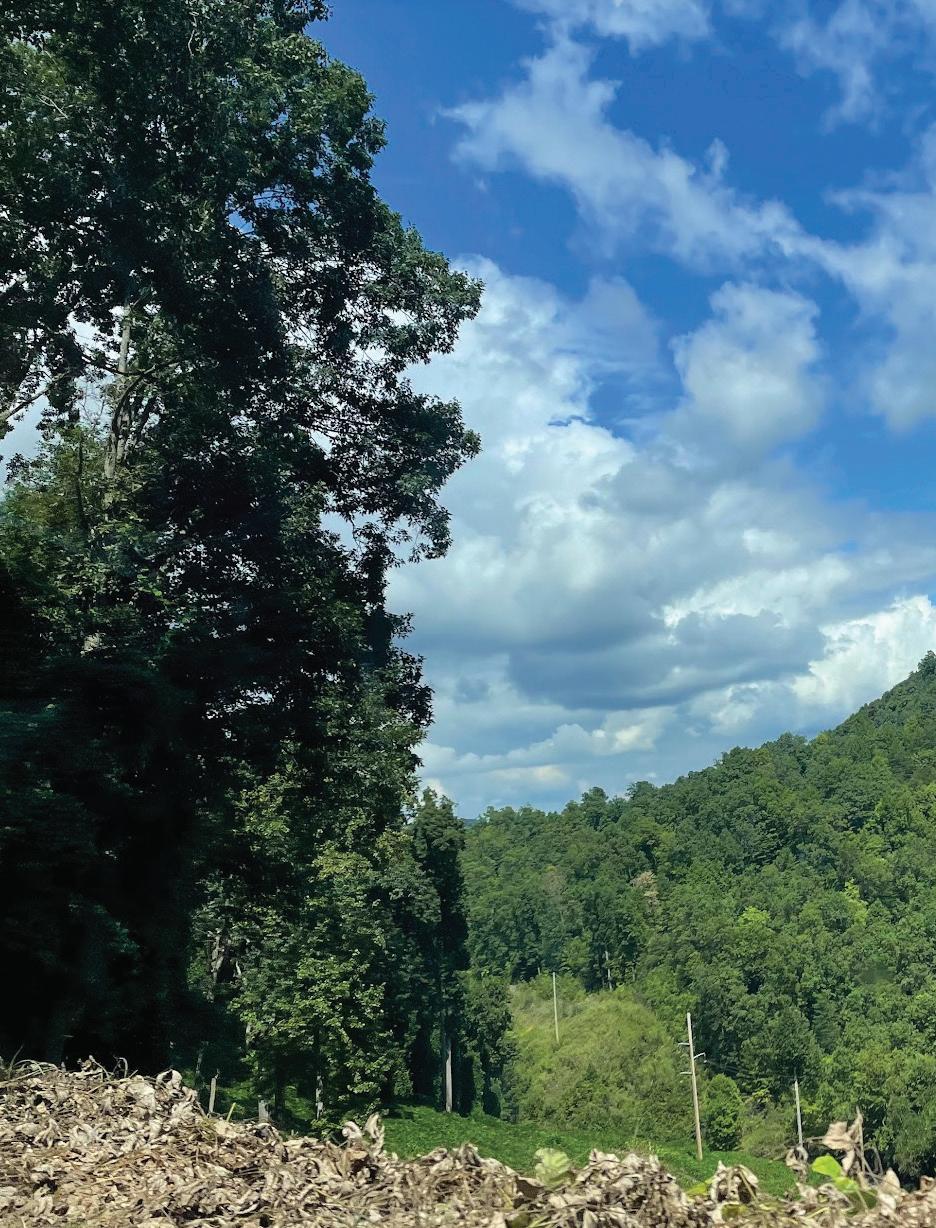
For graduate students, specifically, locating and matching candidates to valuable practicum experiences is paramount.
“Practicum is a chance for our graduate students to learn more about public health and to help refine their potential career paths. It’s a chance to put themselves out there and be bold,” she says. “It’s a unique opportunity for us to connect students to real life experiences where they can explore, grow, and learn different facets of the public health system to see what
they may want to pursue and where they can best utilize their strengths and knowledge.”
Cambron recognizes that the public health system is extremely complex. As a result, she believes that building partnerships and collaborations is critical to provide more opportunities for students and alumni in the public health field.
“By continuing to build new and innovative partnerships in public health, we are giving more opportunities and exposure for our students,” Cambron says. “By increasing and expanding partnerships, we also can connect alumni in the field with our current students.
“Serving and meeting the needs of our communities and partners in the public health system helps increase our academic and practice partnerships at CPH. We are always looking for more ways to get our students plugged in to service, internships, and practicum opportunities.”
CPH’s mission is to develop health champions, conduct multidisciplinary and applied research, and collaborate with partners to improve health in Kentucky and beyond. To fulfill this mission, as it relates to preparing our champions to be leaders in the workforce, it starts with our people and service.
"We have amazing faculty, staff, student support teams, and administration who are all working together and dedicated to seeing our students succeed,” Cambron says. “We have some of the most hardworking people advocating for our students and helping to find ways to increase our engagement within the practice community.”
With Catalyst’s theme being “you belong here,” Cambron feels that this perfectly aligns with her mission of preparing future public health champions — inside and outside of the classroom — and supporting alumni in their ability to advance as leaders.

“Public health is ever-evolving, and our students need to be ready,” Cambron says. “By providing them with valuable experiential learning, such as that in the practicum and other opportunities, we are exposing them to many facets of public health and helping lead them to their areas of interest.”
“Service is my number one core value. Investment in our students is the single most important thing that we can do for them. By showing them that we care about them and are investing in seeing them succeed, we plant seeds. It is fun to watch them have lightbulb moments and to see them blossom and grow,” Cambron says.
Cambron’s accolades include being a Bloomberg Fellow at the Johns Hopkins Bloomberg School of Public Health, past president and current workforce development co-chair of the Kentucky Public Health Association, and mentor and past scholar of the Kentucky Public Health Leadership Institute.
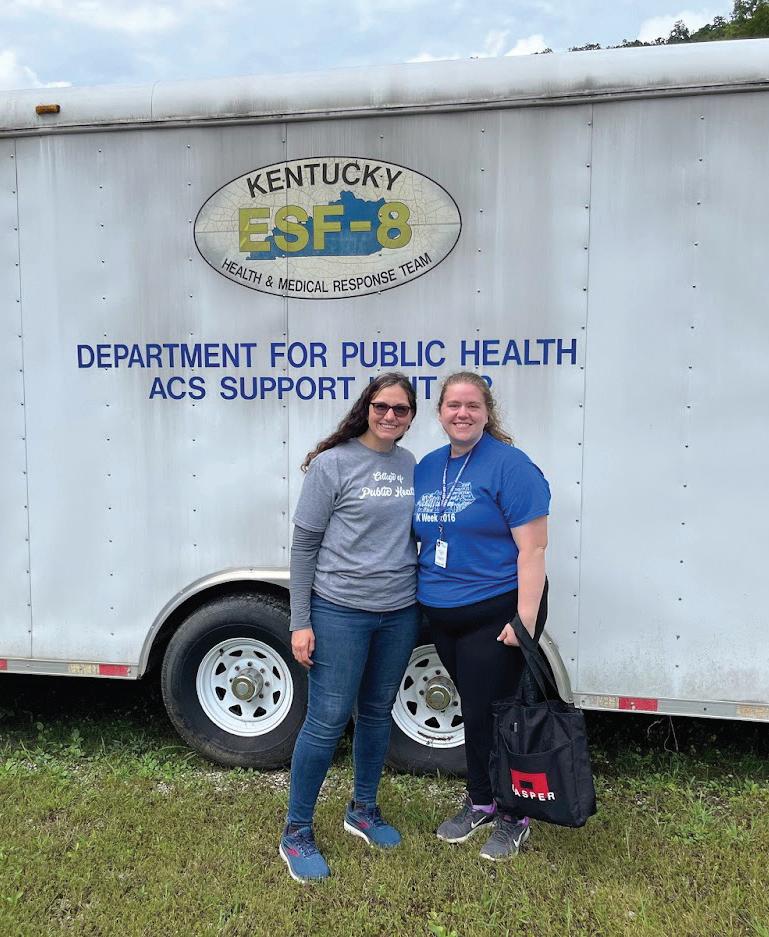
Cambron also holds an instructor position in the department of Epidemiology and Environmental Health at CPH.
For more information on the college’s workforce development and practicum initiatives, visit cph.uky. edu/careers/workforce-development.

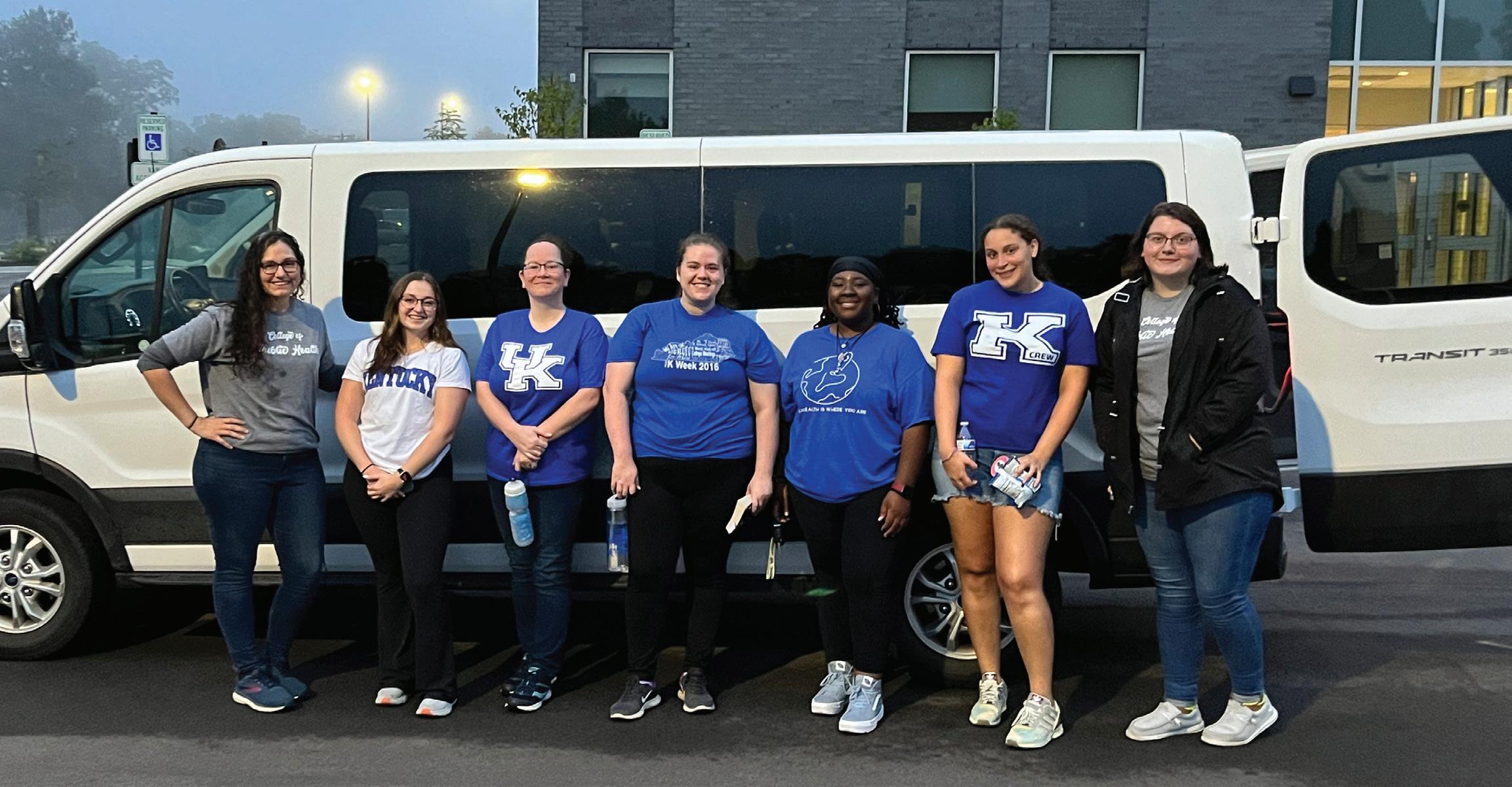
New website provides resources for first-generation students and shares the experiences of CPH’s first-gen students, alumni, faculty, and staff
With one of the highest percentages of first-generation students of any college at the University of Kentucky (UK), the College of Public Health (CPH) has recently launched a new resource devoted to the first-generation experience.
First-generation students are those UK scholars whose parents or guardians were not college graduates. More than a third of undergraduates seeking a degree from CPH classify as firstgeneration students.
First-generation students have some shared challenges. Their parents or guardians are often unable to provide the same guidance that other students receive from their families. Firstgen students are more likely to work while attending college and tend, on average, to be less involved in social groups or to pursue career-oriented and experiential activities during their first two years on campus.
Dr. Sarah Cprek, assistant professor and director of undergraduate studies at CPH, understands firsthand the perspective of first-generation students. She, like many fellow CPH faculty and staff, lived the first-generation student experience during her own college career.
Dr. Cprek says, “First-generation students are less likely to realize resources are available to them. They’re more likely to feel imposter syndrome.”
In response, CPH has recently launched a new webpage to centralize resources available to these students. The site is accessible as a link from the CPH home page or may be accessed directly at https://cph. uky.edu/students/first-generation.
Located on the page are a linked list of campus programs and services available to first-gen students, including faculty and peer mentor opportunities, scholarships intended for first-gen students, and access to UK’s First-Generation Student Services office.


Additionally, the site houses the personal stories of several first-generation faculty, staff, alumni, and current students whose lived experiences will inspire future and current first-generation students seeking a public health education.
For instance, the story of Kelsey Gatton, a first-generation graduate and current employee at CPH, shows how to get involved in many leadership roles and opportunities to learn, study, and work. Jessica Howard,
first-generation graduate from Eastern Kentucky University and current staff member at CPH, dropped out but found a way to get back and graduate.
These stories of resiliency, determination, and problemsolving are just some of the unique traits found in first generation learners. Britt Allen-Wynn, a first-generation college graduate who now oversees student advising for the College of Public Health, believes first-generation students bring unique perspectives and abilities to UK. “Individuals who come to an experience with no set of expectations—not formed by a mom’s or dad’s or sister’s experience—are really open to new ideas. As a staff member working with these students, I find that so refreshing.”
Visit the new webpage to find important resources available to first-gen students and to read the stories of CPH community members whose own experiences will help share the first-generation student perspective.
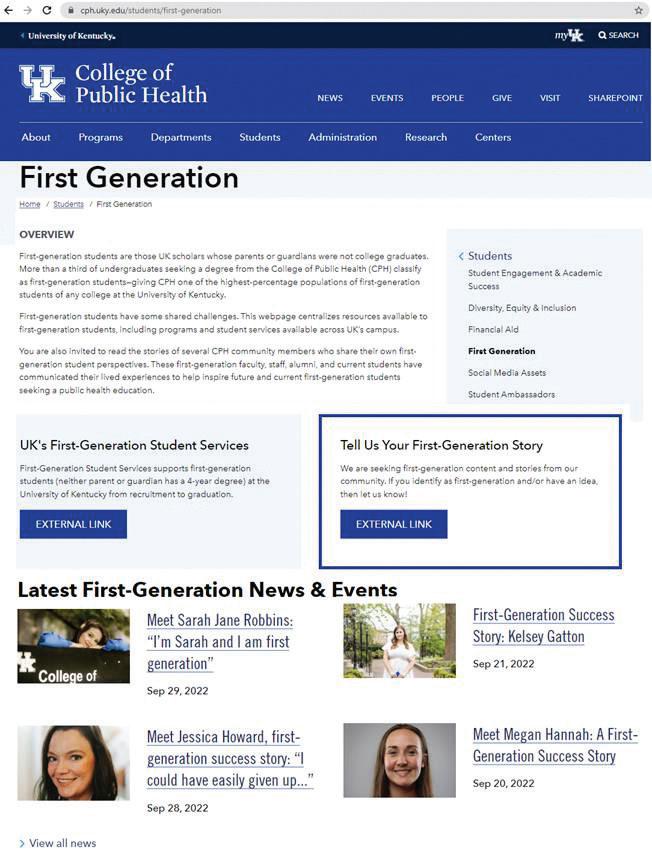
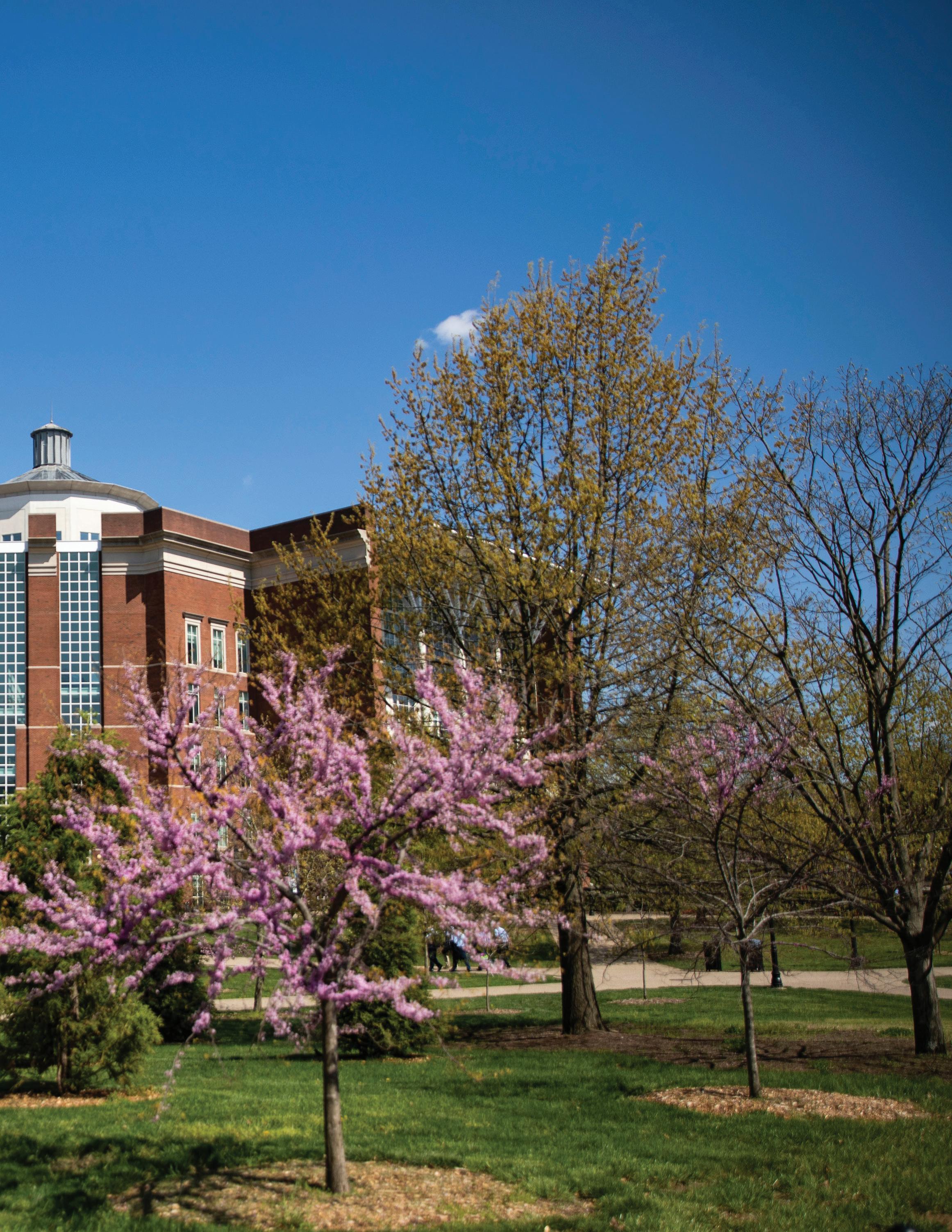
The University of Kentucky’s College of Public Health has officially launched a new department in Epidemiology and Environmental Health (EEH), which merges two existing departments at the College and brings the dynamic fields of epidemiology and environmental health together in one place.
“The consolidation of these departments provides a tremendous opportunity for the University and the College to strengthen its research in environmental exposure science and its application to public health through epidemiologic research,” says Dr. Erin Haynes, chair of the Epidemiology and Environmental Health department. “Our faculty’s research ability in cancer, cardiovascular disease, substance use, aging, and more will all be enhanced through collaborating with environmental health scientists.”
Both the National Institutes of Health and the National Sciences Foundation have
significantly invested in research related to climate change and its impact on health. The new EEH department will be better poised to address these critical issues and more.
In addition, with the expected arrival of new faculty experts in environmental health science, the EEH department plans to develop more courses and training programs to train this generation of public health professionals in the fields of epidemiology and environmental health.
“The Commonwealth of Kentucky faces significant environmental health challenges,” says Dr. Haynes. “We need environmental health champions to address these challenges, such as water and air quality and the impacts of climate on health, including disasters.”
As an example, in response to the recent flooding in Eastern Kentucky, the EEH department worked together to elevate actionable steps and resources
to help everyone safely respond and recover from this catastrophic event.
The EEH department is also positioned to continue delivering and strengthening a strong academic model and learning options for students. the department currently offers training programs in both epidemiology and environmental health as concentrations in the Master of Public Health and PhD in epidemiology and biostatistics programs.

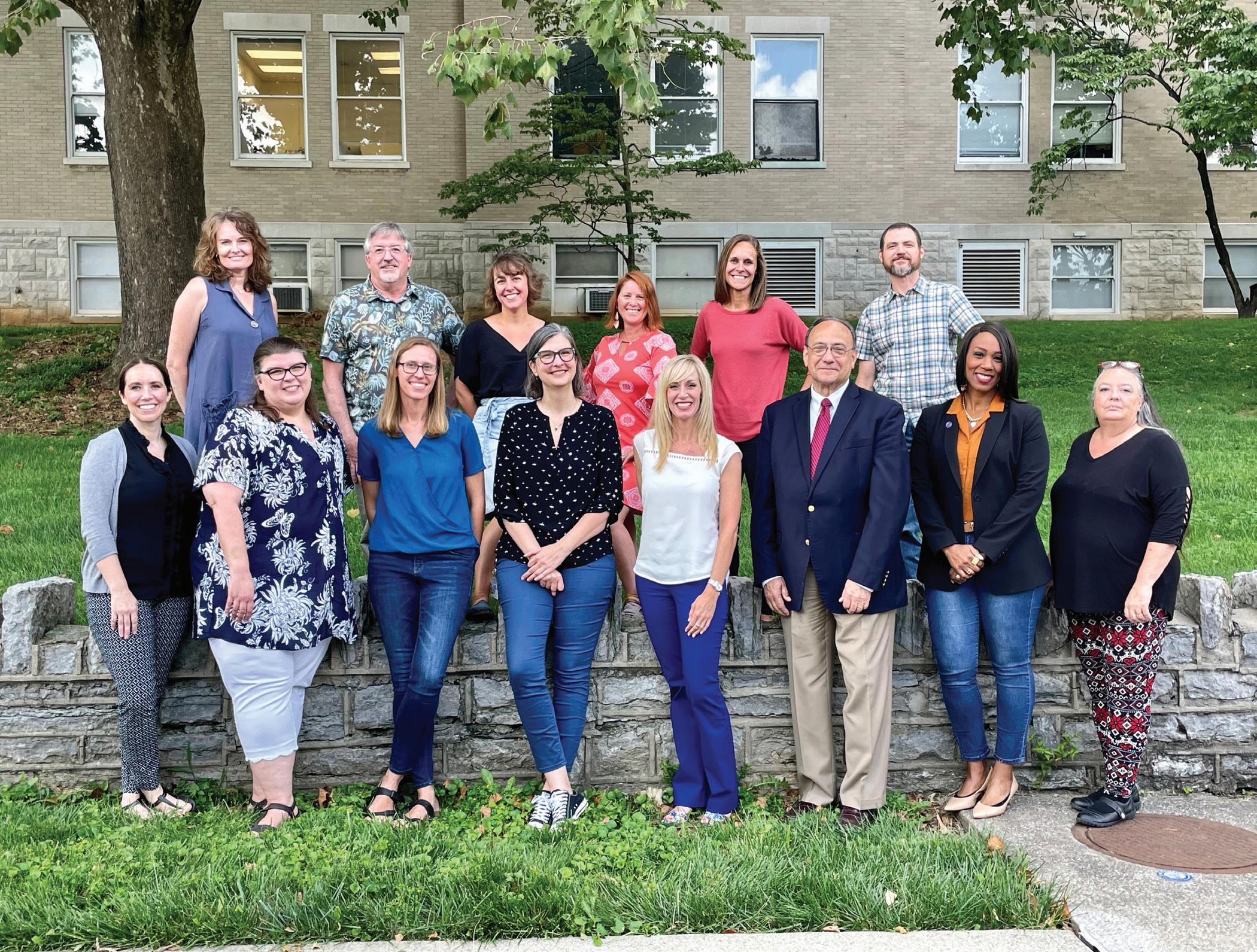
Many of our students, research teams, alumni, staff, and faculty live, learn, work, and play in these beautiful mountains. The impacts from the flooding on individuals, families, businesses, and communities are devastating.
We stand with those who are struggling during this difficult time and will work alongside them throughout the recovery process. We are committed to the region and its people who comprise a significant portion of our student body, research teams, staff, and faculty.
The people of Eastern Kentucky have proven their strength and resilience across generations. We stand with them during this challenging time, and we will be alongside them to adapt, rebuild, and thrive.

As we continue to coordinate strategies for directly assisting with recovery efforts, we want to share this list of resources where members of our public health family, and beyond, can help the affected communities in the nearer term:
• Appalachian Regional Healthcare Flood Relief Fund
• Foundation for Appalachian Kentucky
• Kentucky Red Cross
• New Frontier Branding’s Eastern Kentucky Strong (Flood Relief) T-Shirt
• Team Eastern Kentucky Flood Relief Fund
For University of Kentucky students, staff, and faculty, here are additional resources and support:
For student-related issues, such as counseling and basic needs support, please direct individuals to call our UK Center for Support and Intervention at 859-257-3755.
If you or someone you know has been affected by the flooding and needs support, please reach out to us at crisisresponse@uky.edu. For more general questions, calls can be directed to UK Health Corps at 859-218-SAFE
On behalf of the College of Public Health and the Epidemiology and Environmental Health department, we are deeply committed to understanding and reducing the health-related impacts of extreme weather disasters that are increasing in frequency and severity in the region as our climate changes.
“We are committed to the region and
We are deeply saddened by the shocking images that continue to come out of southeastern Kentucky

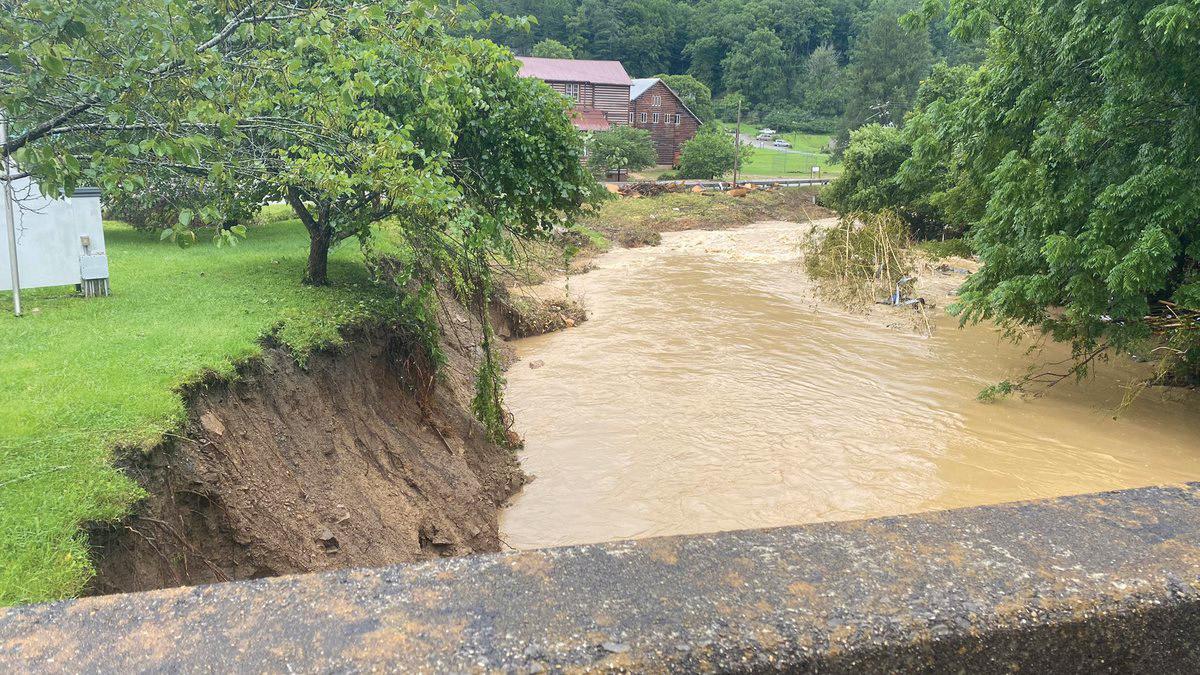
As our Commonwealth works to respond to and recover from this catastrophic flooding, health and safety threats do not end when the flood waters recede.
To help protect residents in flood-affected areas who are returning to and/or cleaning up
damaged structures, these resources from the CDC, NCHH, NIH, NEHA, and others, provide proper ways to clean up hazardous areas. We are confident that you will find them useful and we encourage you to share them with others.
It really helped me to put the information learned in class in perspective and see the importance of it. It was helpful to see how classroom concepts apply to the real world.
In response to the devastating flooding in Eastern Kentucky, a group of University of Kentucky College of Public Health (CPH) students recently contributed to public health preparedness and response by assisting agencies across the state’s tiered preparedness system through the Community Assessment for Public Health Emergency Response (CASPER).

CASPER rapid needs assessments bring together local and state health departments and the Centers for Disease Control and Prevention (CDC) to facilitate disaster response and recovery, assess emerging needs in the community, identify information gaps, and initiate public health action.
Over a five-day period, Janie Cambron, CPH’s associate dean for practice and workforce development, led a support team comprising of CPH undergraduate and graduate students, faculty, and staff to recruit, coordinate, and deploy a response team to support public health practice partners implementing this time-sensitive epidemiological exercise.
According to Dr. Kathleen Winter, state epidemiologist and assistant professor in epidemiology and environmental health at CPH, multiple agencies collaborated to field the CASPER on an extremely short timeline.
“Disaster response is often very
rapid, with many moving parts. Coordination and collaboration are key,” says Winter. “A statewide planning team was created as part of the incident command structure.”
Local health departments and the Kentucky Department for Public Health (KDPH) worked with the CDC to pull together resources for the CASPER assessment and to rapidly deploy survey teams so that information about household needs within the community could be obtained. CASPER surveys can be used in disaster or non-disaster settings and are a fast, relatively inexpensive way to gather data.
“Having real time data will assist these communities in their efforts to rebuild, ensure that they have basic needs met, and potentially bring more resources and funding back to these areas,” says Winter.
Upon arriving at the Floyd County Rescue Squad Training Facility, the support team joined more than 60 public health, emergency preparedness, and mental health experts from across the state for a four-hour, Just in Time Training session.
During the training, CDC, state, and local officials discussed the CASPER methodology, which involves teams conducting in-depth interviews with households across a 30-cluster sampling frame.
Due to the size of the flooded area,
two CASPERs were conducted simultaneously: the first focused on the Kentucky River District Health Department service area, and the other focused on surrounding counties, including Clay, Floyd, Breathitt, and Pike.
The support teams were assigned to groups and partnered with local experts to target specific clusters across the region. Over the course of three days, students fulfilled numerous support roles, from visiting homes to conduct the assessment, listening to community members’ needs, as well as reviewing and cleaning data to supporting mental health professionals at CASPER headquarters.
These experiences drew from and built on their experiences in CPH classrooms.
“It really helped me to put the information learned in class in perspective and see the importance of it. It was helpful to see how classroom concepts apply to the real world,” says Mary Beth Begley, current Master of Public Health student at CPH.
In addition to being part of public health in action, seeing the affected region in person while learning more about physical and mental health needs of Kentucky’s vulnerable populations affected students on a personal level.
“People in the communities appreciated our efforts to help.
“

Talking to them and hearing their stories made me even more passionate about public health and emergency response. I have only learned about emergency response in class, but seeing it in action was a wonderful experience,” says Delaney Bond, current Master of Public Health student at CPH.
State and local public health officials have shared their appreciation and enthusiasm for students’ efforts in the field.
“I think it was an amazing experience for [the students] and our leadership team,” remarked Kristy Bolen, an epidemiologist with the KDPH. “I can’t tell you how much joy it brought me to hear our leadership team explaining practicum ideas to the students and actually adopting their ideas during the week.”
Upon conclusion of the CASPERs, preliminary data were shared with team members who conducted the work in advance of a formal report that will be issued in the future.
“Among the most pressing challenges public health officials face during and after a disaster is the need to make critical decisions with limited
data,” asserts Dr. Anna Hoover, assistant professor in epidemiology and environmental health. “CASPERs provide an opportunity for public health and emergency management officials to better understand physical and mental health resource needs, as well as communication gaps, in communities that have experienced a disaster.”
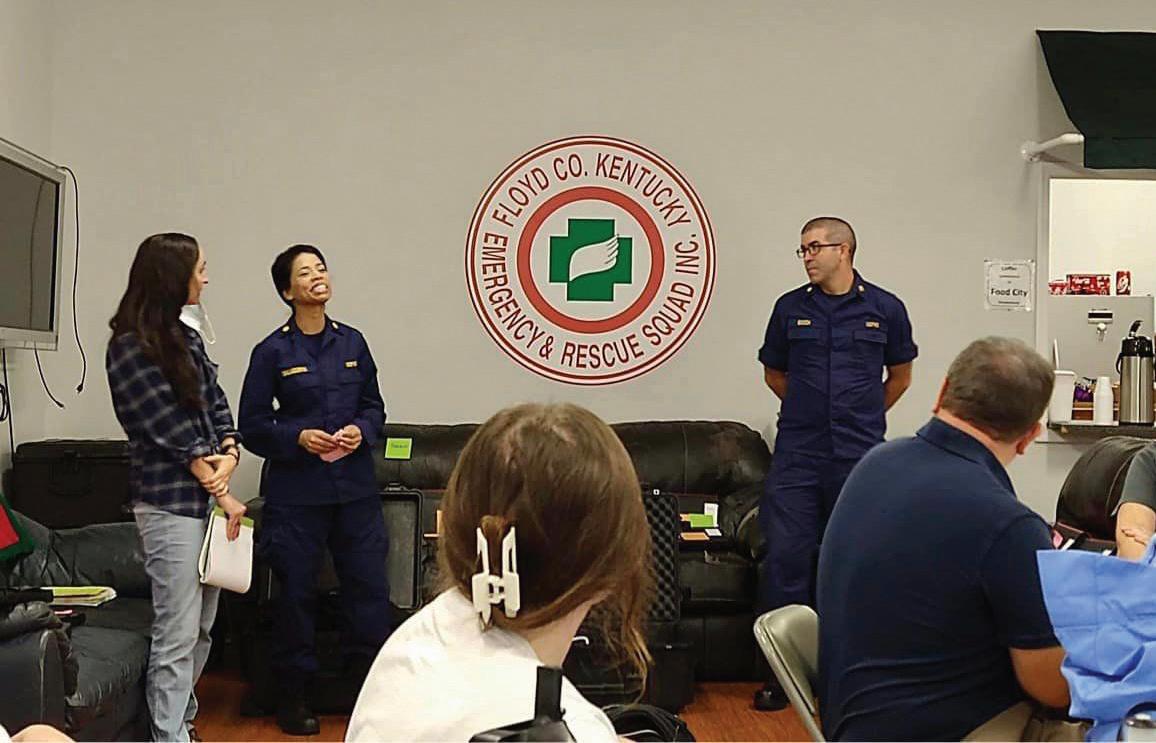
Data that students helped generate from these CASPERs will better enable local organizations to meet immediate needs while also laying groundwork for building community preparedness and resilience before the next disaster arrives.
Engaging in real-world opportunities is a keystone of public health education, and this experience exemplified CPH’s commitment to real-world learning and application.
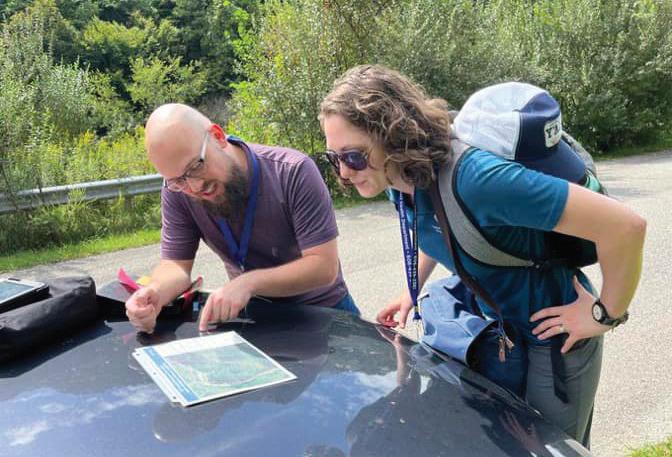
According to Cambron, “I saw many lightbulb moments during the week with the students. They asked a lot of great questions. They were productive members of their response teams and took advantage of the opportunity to
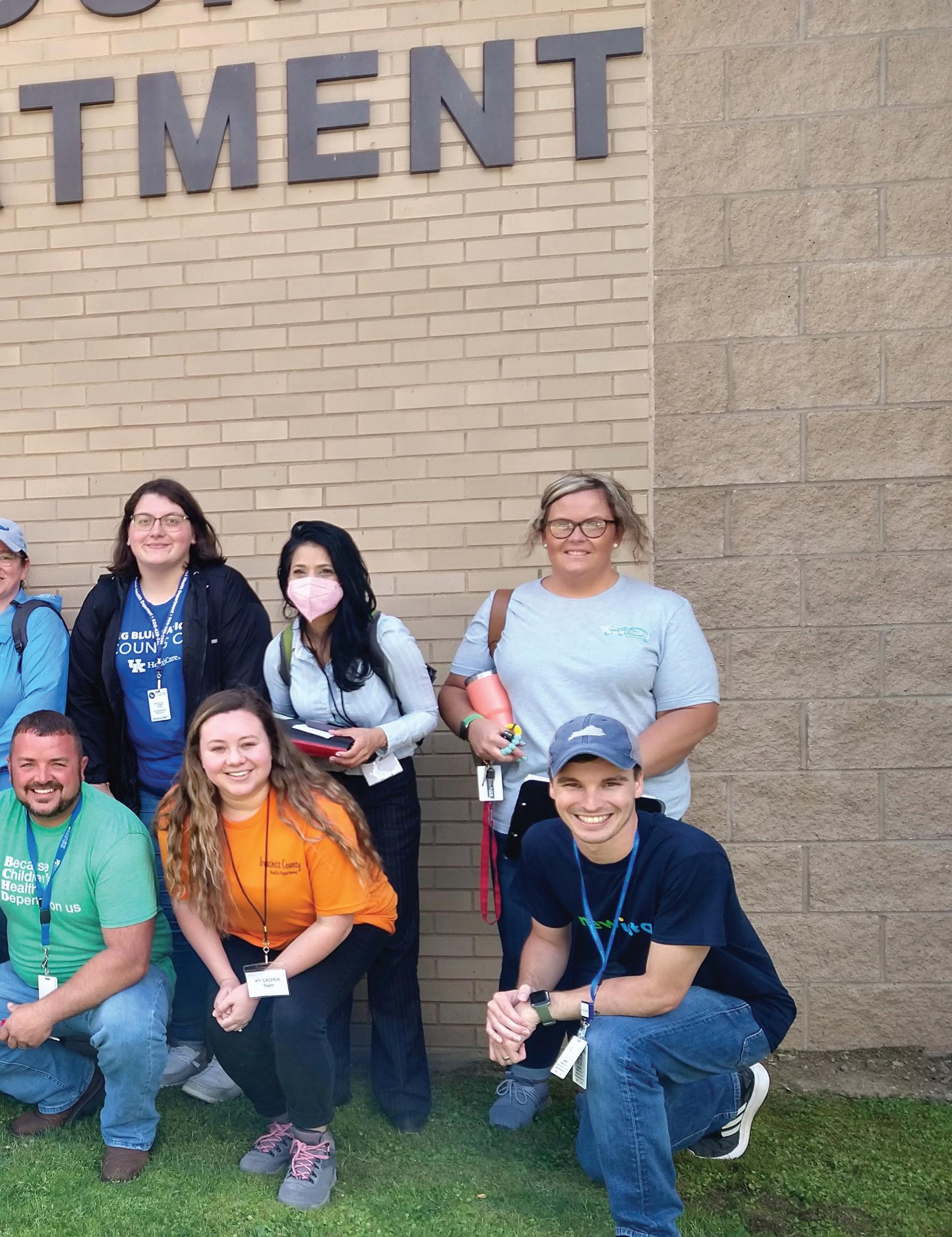
network with many public health professionals at the federal, state, and local level.” Cambron continues, “Unfortunately, disasters continue to be part of the landscape of Kentucky public health. Seeing how the public health workforce is part of prevention, response, and recovery is integral to the student experience.
“When these students enter the workforce in the next few years, we are confident that these experiences will help shape and mold them into better-prepared public health champions. Building infrastructure for student experiential learning and public health response capacity is important to CPH.”
We are thankful for our direct partnership with the Kentucky Department for Public Health our local health departments, as several collaborated on the CASPER.
We are especially grateful for our partners within the UK College of Agriculture, Food, and Environment and the Central Appalachian Regional Education and Research Center for their support and funding for this endeavor.
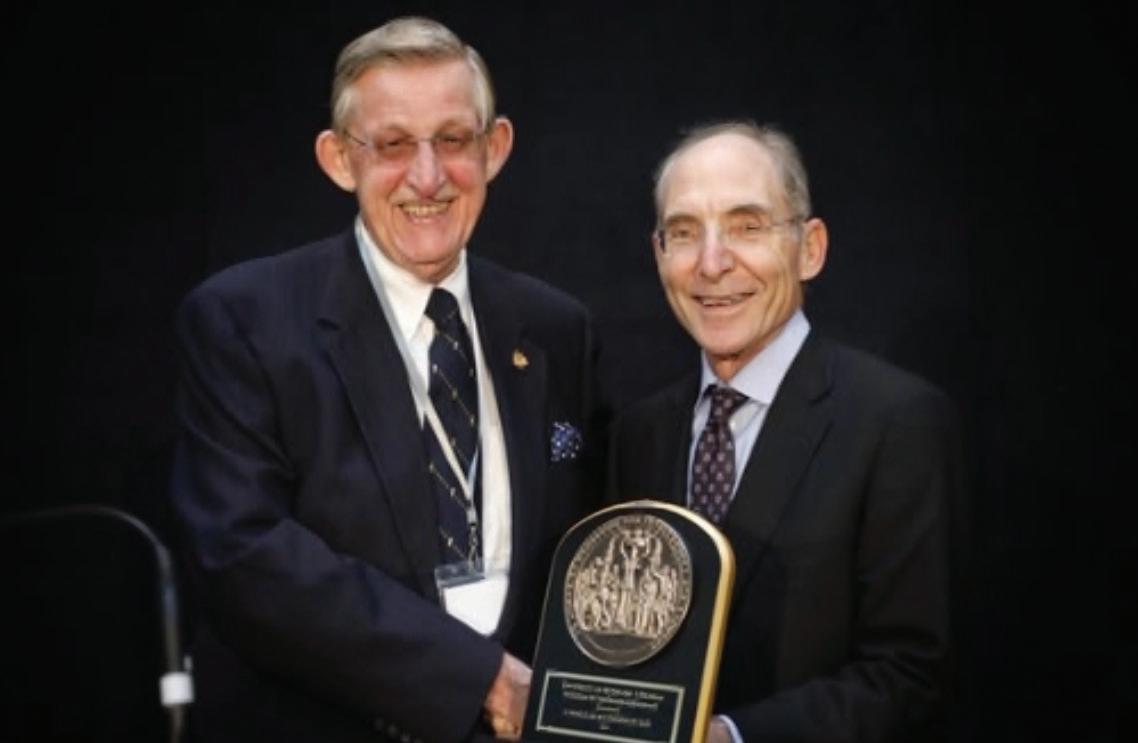
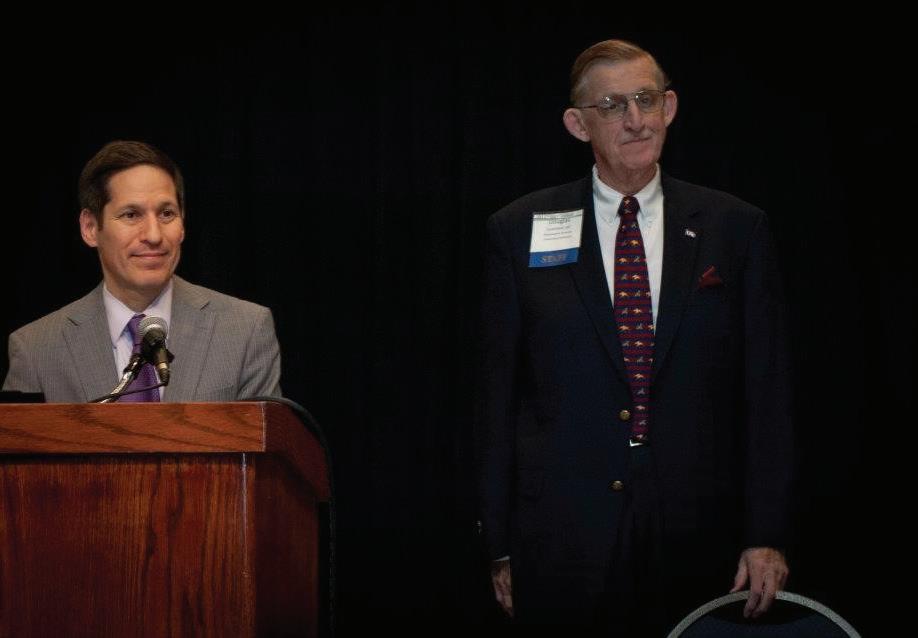
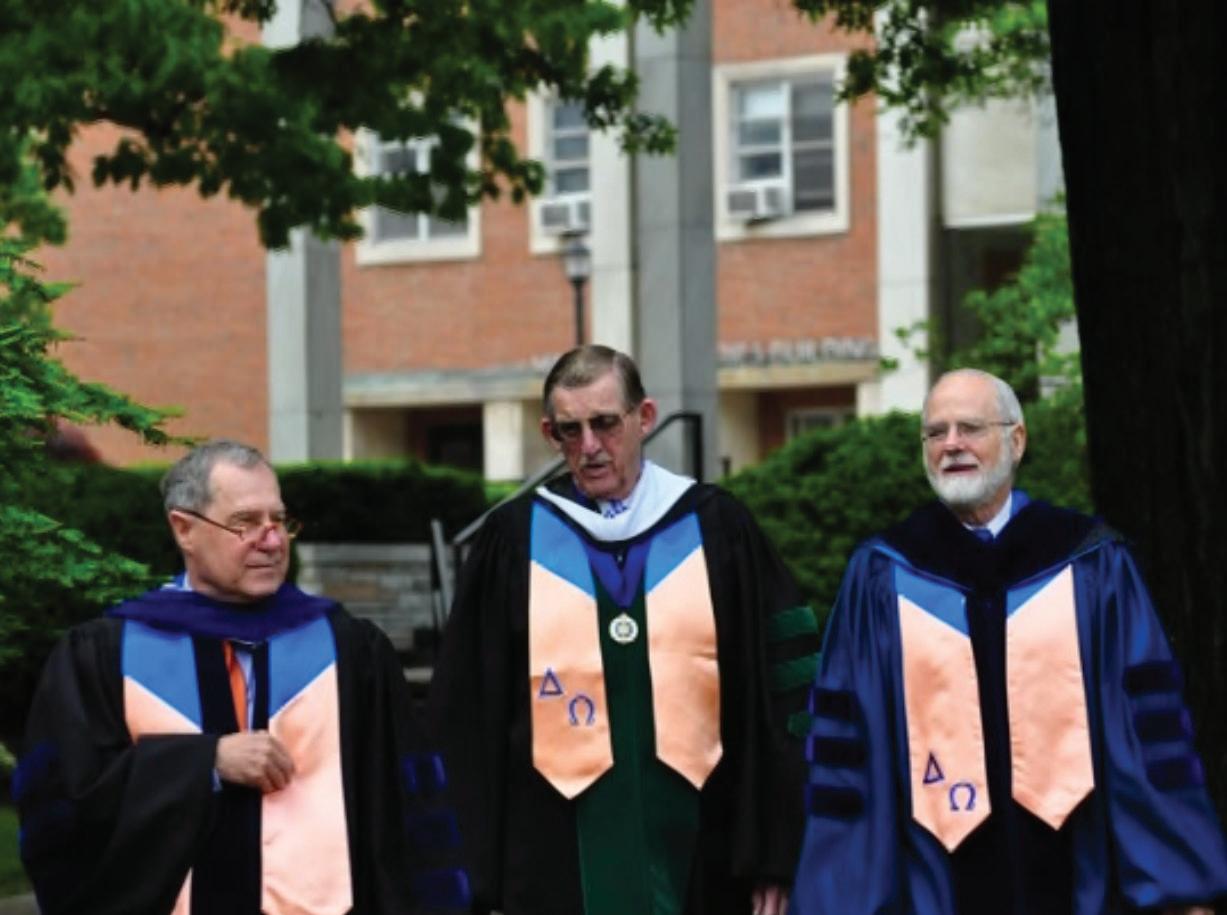

 An Equal Opportunity University
An Equal Opportunity University